#but video games still have a narrative that can go in many directions depending on how you play
Text
Holo-novels aren’t novels, they’re video games
#I GUESS they can be choose-your-own-adventure novels#until I mentally framed them as video games I would always get caught up on how they know what they’re supposed to do in the narrative#holodeck load screen giving you background info like in photons be free#they get that little error noise every time they stray too far from the narrative#or like in lower decks the computer generates a different ai narrative for you#can’t call them holo video games though#holo rpg#nothing wrong with either format but you engage differently with novels and video games#but video games still have a narrative that can go in many directions depending on how you play#who controls the narrative the author or the lector#choose your own adventure books were very big in the 90s#I would always read the whole thing#how very like me to get hung up on insignificant details in the Star Trek universe#hot holodeck discourse over here#star trek voyager#sonic shower thoughts
5 notes
·
View notes
Note
for the redacted audio matchup :D
My current song fixation is probably "Eat Your Young" by Hozier, but I'm also loving "She Wants Me (To Be Loved)" by The Happy Fits and I'm constantly in an Arctic Monkey brain rot.
My enneagram is type 4w6 and I'm an INFJ-t
I don't really watch many Youtube Video Essays because I'm busy with school, but I have enjoyed watching videos on the difference between psychopaths and people who are pretending to be psychopaths.
My imaginary friend as a kid was an elephant because I had a stuffed animal of Horton and it kinda just morphed into an imaginary friend tbh.
I fall asleep really late and usually listen to some sort of Sleep Aid.
If I had to change my name it'd probably be a naturey name like Aspen or Oakley. I chose the name I go by because of a username I used to go by LMAO.
My favorite of Redacted's audio is probably Anton's newest video where he calls his long-distance partner. (My toxic self wants to say Blake's Valentines Audio too though)
Asher is a character that has little appeal to me. He's like not bad, but I'm just not the biggest fan of him. (also I really do not Caelum but in a romantic sense my answer is Asher)
The Last Of Us has become one of my biggest interests rn, the amount of edits I consume of that show/game is unhealthy. It was very good and Joel is the LOML <3
I honestly don't know who I'm platonically attracted to, but I do prefer platonic friend Lasko rather than romantic Lasko.
I honestly just ramble about my interests, like my favorite books and shows. It kinda just depends on the vibe.
My go-to gas station and drink combo is 'Airhead Extremes' and Lemonade.
My Liked Song playlist (my main genres are Rock and Indie) on Spotify or my playlist with every Arctic Monkey song :)
My guilty pleasure media is StudyGram. I am way too into making pretty notes and watching Instagram Reels about studying.
Anything Else: I'm a science and psychology nerd and I also really like Greek Mythology.
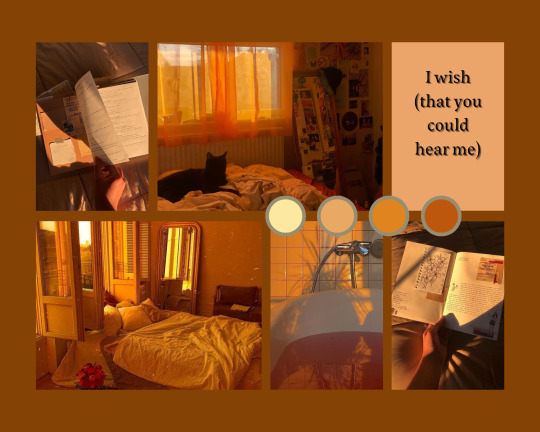
Ooooh, this one was interesting; I could have gone a few directions with it, but what convinced me was StudyGram and how I think you and Ollie could really enjoy that together.
Like, I know he wasn’t always as on top as his game, but the man Ollie is now is conscientious, thoughtful, and smart. There was something incredibly charming about the way he studiously took notes in his first audio, so I think he’d be taken with your love of beautiful, well-structured notes. Ollie’s so sweet about it too, buying you notes and scented pens and cute pencil pouches shaped like a carton of strawberry milk (my personal favorite kind of stationary).
Also, I don’t think we have, like, any real canon information Ollie is a video game boy. He’s more of a board game, but he still appreciates a good playable narrative. I can see y’all having a lovely lazy day of him watching you play The Last of Us, bringing you snacks, asking you questions about the clickers… the opposite of a golden retriever gamer boyfriend in a way.
Song:
I wanna eat pancakes for dinner/ I wanna get stuck in your head/ I wanna watch a T.V. show together/ And when we're under the weather we can watch it in bed
I love songs like this for Ollie and his partner. He is just the pinnacle of domestic sweetness and comfort, and this is just the song for that. It’s the soundtrack to shared bookshelves, trips to the grocery store together, Friday nights on the couch playing rock-paper-scissors to decide who gets to pick that night’s game~ Plus, it’s a confession-y type of song, and his confession is one of my favorite audios; it suits him 💌
Runner-Ups:
Something about Avior fits well with a Type Four. They’re characterized as the romantics of the Enneagram, emotional, creative, sensitive, and Avior is absolutely the kind of romantic to match that energy. Flyboi!Ivan, I like for you because he strikes me as an Arctic Monkeys guy.
Note: thank you for waiting! I had a couple of IRL writing assignments that fell by the wayside over the past month, and I had to catch up on those. I didn’t forget about any of these matchups, I promise 💖
Read this post and send me an ask if you’d like a match-up of your own! 💌
4 notes
·
View notes
Text
Menoa’s background as a “genius kid” and how it influenced her mentality
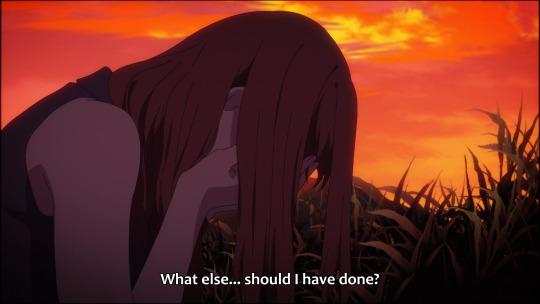
I’ve covered Kizuna quite a lot on this blog, and since Menoa is the movie’s feature character, it’s only natural that I’d touched on her character and mentality several times in the process, but I’d never done a single organized analysis post on her. So let’s fix that!
I wanted to do this analysis particularly because a lot of the take-home regarding the movie’s theme and ultimate message depends heavily on understanding why Menoa’s conclusions of “adulthood is bad” and “partners disappear when you become an adult” are very specific to her own cynical mentality, and not the message the movie itself is trying to send. Admittedly, the movie probably wasn't doing itself any favors by delivering these implications in such a subtle fashion that it's easy to take Menoa's statements at face value because they’re quoted in the advertising and press material, and there’s no point in the movie where they outright deny her assertions in particularly explicit words (plus, the official translation is misleading on top of that), but when you look at Menoa’s background, the reason she’s written this way, the surrounding circumstantial evidence, and the way the movie frames it all in general, you can get a fuller picture of Menoa’s position and the background of what the movie is actually trying to say.
(Bonus: The end of the post also includes some information from a certain video game that seems ostensibly completely unrelated but actually has some interesting ways of enhancing this analysis.)
Some precedent from 02
Being someone who regularly deals with 02, a series that also has a frustrating tendency to have its meaning completely change depending on very specific important lines and easy-to-miss nuances, I have to say that of all the ways Kizuna resembles the original series, this was not a way I would have preferred...but in any case, Kizuna actually has a much deeper connection to 02 besides simply being a chronological sequel. I don’t think this necessarily makes 02 or its production background required reading for understanding Kizuna, as most of the relevant information is still presented in various ways in the movie proper, but since a lot of it is through some really subtle signals in both the dialogue and the visuals, it helps to have the backing of the prior series to solidify it further, especially since Kizuna is, after all, meant as a sequel to it.
I already wrote a lot about Kizuna and 02′s theme relationship in an earlier post, but I’m going to extract the important part that’s relevant to Menoa here:
I remember being shocked by an article in a newspaper about a 9-year-old boy who skipped grades into Columbia University in America, and that was how I came up with the initial idea for 02. “What would the life of an overly intelligent boy be like…?” What would be happiness be, what would his despair be, and would he be able to make friends? I steered it in those kinds of directions.
Adventure and 02′s original producer Seki Hiromi gave this statement in the 2019 DigiFes pamphlet (the same one where a lot of Kizuna prerelease information was being given out), and this is a story she’s told multiple times over the years, repeatedly, every time she’s asked about 02′s development (my earlier meta cited no less than five times she’d told this story between 2003 and 2019). This incident seems to have left such a strong impression on her that she kept clearly remembering this story all the way up to the time of development for Kizuna -- a movie she was prominently involved as a supervisor for.
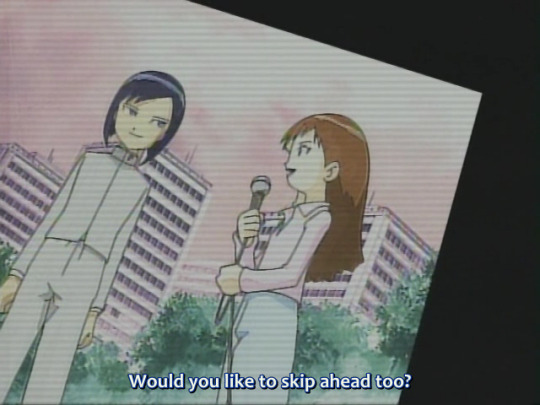
The closest thing to an explicit parallel to this story within 02 itself is in 02 episode 9, when it’s mentioned that Ken would be interested in skipping grades like this if it weren’t for the fact that Japan doesn’t allow for skipping grades the way they do in the US. (Presumably why there are so many narratives out there that send characters off to another country when they want to have a grade skipper in their cast.) Ultimately, Ken, an eleven-year-old boy from Tamachi, was spared from this partially because of his position in Japan and partially because all of the characters involved came to the quick realization that none of this was working out -- but the sentiment behind condemning practices like this remains as one of the core themes behind 02.
Quite simply, 02 made a very clear point that “unreasonable expectations placed on children by adults will tear them apart,” and more broadly “life in itself is worth valuing, and it’s fine to enjoy life in itself instead of constantly pushing yourself to have a purpose or to fulfill others’ arbitrary standards.” Ken is the most obvious and prominent example, but there are many parts of the story that are encapsulated in this -- including Oikawa thinking he was being turned away from his dreams to go to the Digital World from being a "tainted adult", to BlackWarGreymon running around in circles trying to have a "purpose" in his life when in actuality everyone would have been fine with him even doing the most mundane of things, to all of the Dark Seed kids who gave up on their own personal dreams that adults presumably told them were too shameful in lieu of following in Ken's footsteps and trying to mold themselves into model students. And in the end, the happiest one out of all of them is Daisuke, the one who understands that it’s fine to do something as simple and low-reaching as running a ramen shop for his career, as long as it’s what makes himself happiest.
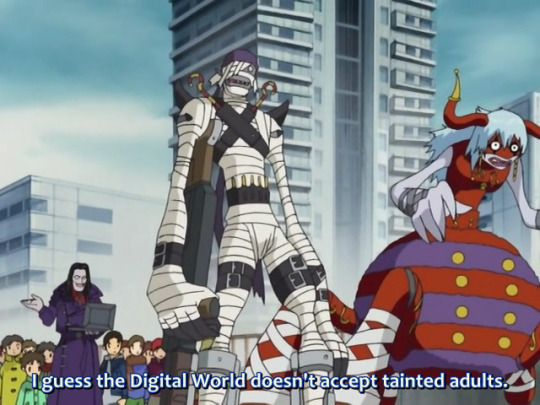
"Expectations and pressure” were already being correlated to the inability to “have the proper life of a child” even back in 02. During the many times Seki repeated the real-life story of the boy who skipped grades into university, she mentioned that her concerns were in regards to whether he’d be able to make friends without people his age, and whether he’d end up alienated from others around him. Because it’s true -- when you’re put on a pedestal as a “genius”, as a “gifted child” who apparently has advanced abilities, you end up treated with all of the expectation that you’re now as smart as an adult and should be treated as someone much older than your actual age. And they don’t mince words about its relationship to childhood and adulthood, either; Spring 2003 outright refers to the plight of Osamu (that Ken eventually inherited for a fashion) as “forced to grow up fast”, and in 02 episode 48, Oikawa refers to himself as a “tainted adult” who can’t enter the Digital World in 02 episode 48 because he felt that Hida Chikara cutting him off from the Digimon as a child meant that he’d lost his opportunity forever. (As we find out not long after, his inability to enter the Digital World did not have anything to do with his being an adult.)
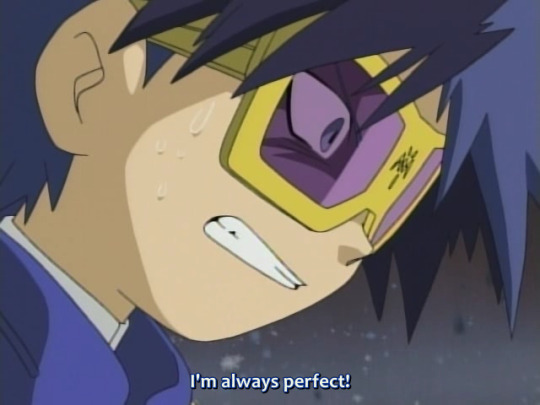
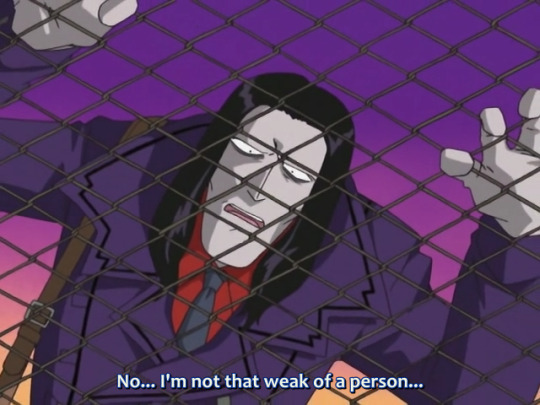
Being subject to the expectations of adults, and being yanked away from the life a child ought to have -- being able to pursue what it is you want for yourself instead of tailoring yourself to what adults want of you -- ends up damaging your own inner self. We see the impact of this in many ways in 02 -- distorted personalities, frustration and anger, loss of empathy, and cynicism. Beyond just that, there’s also self-hatred and perfectionism, and holding oneself to unreasonable standards, like how the Kaiser and Oikawa actually harbor severe insecurity over not being “perfect” enough. But the finale is in response to all of that:
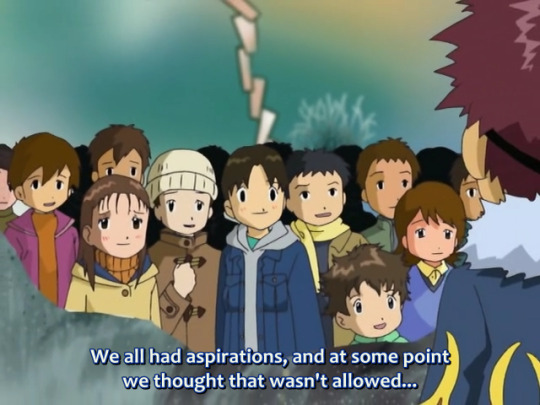
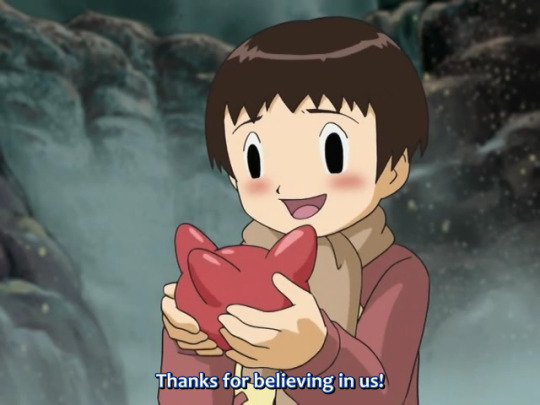
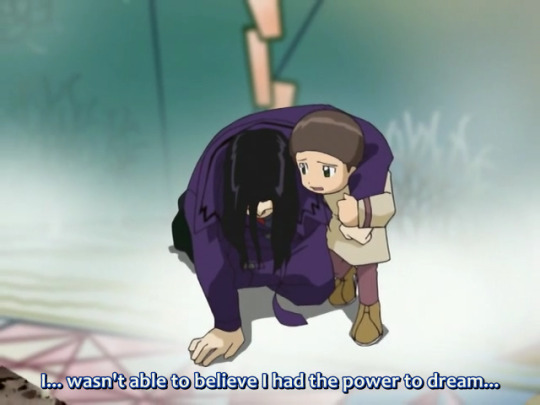
The exact phrase is “belief in the power to dream” -- or, in other words, to truly believe in your ability to get and do what you want instead of smashing out everything that’s not societally acceptable. That’s what’s considered the ideal that a child should be allowed to have (or, really, even an adult like Oikawa). Moreover, such a thing is given a direct correlation to the concept of a Digimon partner -- the Dark Seed children only get to see their partners once they’ve accepted what it is they really want to do and have the proper determination to pursue it, and Oikawa himself only meets Pipimon when he, too, realizes what it was he was missing and why his cynicism had been holding him back.
If Menoa had witnessed 02′s finale, it’s hard to believe she’d have the same mentality she had in Kizuna, because of how much of said finale directly answers most, if not all, of the major questions posed by the movie. She would have seen Oikawa, an adult, reuniting with his partner Pipimon, which should go against her idea that partners inevitably disappear in correlation with adulthood, and she’d see a whole ton of children actively learning that throwing aside your dreams for the sake of said adulthood is an unhealthy way to live, and that you can still live the rest of your life with determination. But we know for a fact that Menoa was most likely not present to witness this, because if you look at the timeline she gives for when Morphomon disappeared -- when she was fourteen years old and received permission to enter university, meaning early or mid-2002 -- she lost her partner right before all of the Chosen Children around the world joined in to assist and witness the events of 02′s finale in late December 2002. How interesting it is that her personal timeline seems to be so carefully tailored to prevent her from witnessing the known canonical incident that would pose the greatest threat to her ideology...
Moving on to Kizuna itself
When you think about it, if you really just wanted an antagonist who simply wanted to prevent partners from disappearing, you wouldn’t have to have a character with such a specific backstory of grade-skipping and being hailed as a genius -- it’s only natural that a lot of people would hate the idea of separating from their partners, and might do something as drastic in desperation. But Menoa’s motives seem to go far beyond just concern about the partner issue, because her justification about why partnership dissolution must necessarily go with adulthood is based on a very cynical view of adulthood to begin with.
Do all of you know why it’s children who are chosen to be partners with Digimon?…
It’s because children are full of possibilities…
The future is rife with limitless choices. You grow as a person by making those choices. “Growth” and “possibilities” together produce vast energy.
As I’m sure you guys are already aware, the evolutions of your Digimon partners are triggered by your growth…
When that power is gone…
Your partnership with your Digimon ends.
(From this translation’s version of the speech.)
Recalling that Gennai never actually confirmed the whole concept of partnerships dissolving because of adulthood, only implying that it at least had to do with “possibilities”, this means that Menoa’s really the only one here who makes this specific correlation of “adulthood” and “making choices” to “losing possibilities” (Gennai, for one, seemed to be pretty open to the idea that an adult like Taichi should still be able to have them). Menoa concluded that adulthood deteriorates partner relationships because she thinks adulthood inherently damages people’s possibilities. This is why the “reveal” of her backstory during the climax of the movie is so important, because we see the exact sequence of events and train of thought that led to her coming to that conclusion -- a conclusion based on her own personal experiences, not necessarily actual truth.
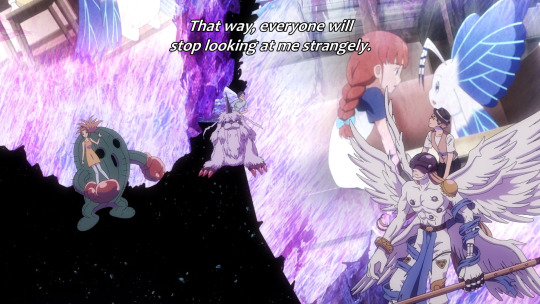
Through flashback dialogue, we learn a lot about Menoa’s backstory in only a very short space of time -- her being hailed as a “genius” as a child indeed subjected her to the exact kind of unreasonable expectations that tore at everyone in 02. Finding herself ostracized by others, she decided that the solution would be to “hurry up” and become an adult, hoping that people would take her seriously and allow her to fit in better.
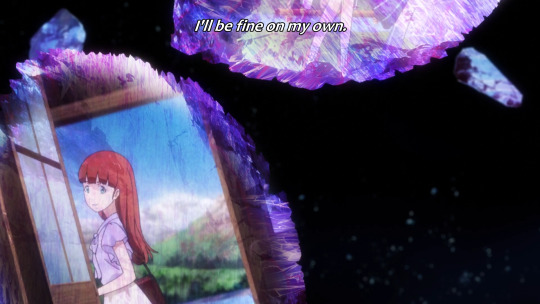
But as you can see in both her dialogue and the visuals, this race to become an adult is just her forcing herself into another box. Menoa undoes her braids, which were confirmed to be a direct reference to Anne of Green Gables (it’s very famous in Japan). But while Anne was a character with a very healthy relationship with her childhood and adulthood, Menoa undoes those braids in her attempt to become more “mature” and aim to fit in adult society. And in the process, she physically becomes more and more distant from Morphomon, saying that she’s going to become self-reliant and not need to depend on anyone.
And then, she cuts off the most important thing.
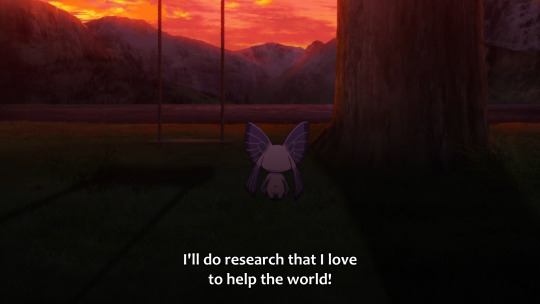
Waiting in front of the swing at her family’s home, where they’d always played together when Menoa was a child, was her beloved friend.
Lately, she’d been studying so much that they hadn’t been talking to each other at all, so she wanted Morphomon to lavish her with praise. She wanted her to say, “Menoa, you’re amazing!”
But Morphomon turned around and looked at her with a very lonely-looking face.
This is one of my favorite passages from the Shueisha Mirai novel, because while some of this was already implied visually and textually in the movie itself, this really just spells out what the problem was in direct words. Alongside all of those “things she’d had as a child”, she’d emotionally abandoned Morphomon, too. And when she did approach Morphomon again, she only went for the same thing she’d abandoned all of those other things for: struggling to get approval and validation from others. When she proclaims she’s going to be using her research to help the world, the phrase she uses is the idiom yaku ni tatsu, which carries a nuance of “being useful” -- she’s still only thinking in terms of how to force herself into a box to be accepted by society and adults’ expectations of her, and not necessarily doing it because it’s true to her own passion and dreams. She’s basically doing the opposite of what 02′s finale said would allow you to meet your partner -- so, naturally, it makes sense that this was the time she lost her own, and that Taichi, Yamato, and Sora would lose their partners after similarly emotionally abandoning theirs for the sake of pressure to become adults, rather than following something they really wanted.
So after losing Morphomon, Menoa goes ahead and attends Liberica. And, well, funny thing about Liberica...
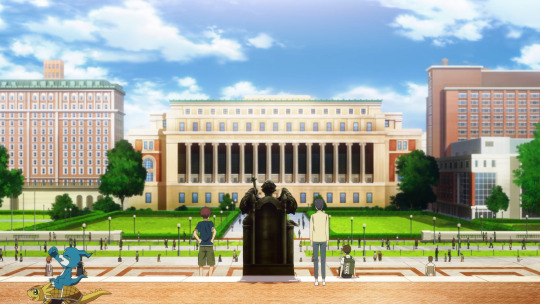

...it’s a dead ringer for a certain university in New York called Columbia University. You know, the university that just so happens to be the same one that inducted that 9-year-old child whom Seki saw the story of and freaked out enough to create the entirety of 02 about, in order to make the point that forcing children into adult expectations too early will really screw them up?
Let’s put it this way: Menoa is the one here who’s convinced herself that she lost Morphomon when she became “an adult”, but she’s the one who made that assessment because of her idea that being admitted into university constitutes being an adult, even if she was only fourteen years old. No matter how “mature” a fourteen-year-old may seem, even if they’re an apparent genius, a fourteen-year-old is not an adult and should not be expected to carry the expectations that would normally be imposed on one. In the end, her logical conclusion of “losing a partner comes with adulthood” can only be said to be based on her extremely warped perception of life and adulthood as a whole, rather than how adulthood is actually supposed to work.
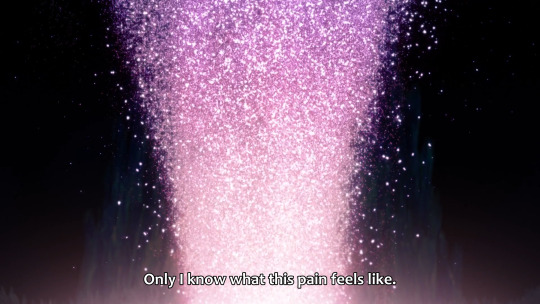
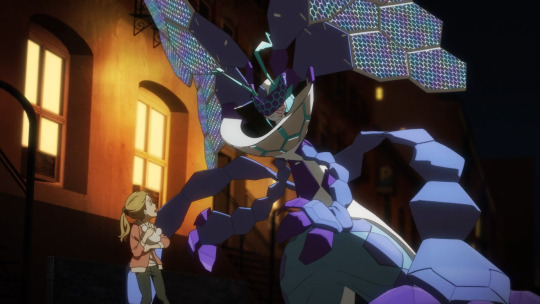
We don’t know a lot about Menoa’s life at Liberica as per her own testimony, but considering the university she went into and Seki’s relevant concerns, it’s easy to surmise a few things. Entering university at the young age of fourteen means that it’s very unlikely she’d have any friends she’d really connect with; indeed, by the time of Kizuna, her assertions carry a fairly obvious implication that she hadn’t made any friends or gotten any emotional support from others about this, a very dangerous position to have in light of 02 (and, by proxy, even Adventure)’s consistent stance that proper emotional support and friends are some of the most important things to have. For all she’d been working to be accepted by others and praised, it’s unlikely she got any more than the shallow adoration Ken got by the public in the early episodes of 02, rather than what she really needed. I’d be surprised if any of her significantly older “peers” in university would even feel comfortable connecting with her or treating her as anything other than a kid due to her status as a much younger person with, despite everything, a much bigger difference in mentality.
And when you look at her actions during the movie, especially as it approaches its climax, she ends up projecting all of her problems on others due to her presumed lack of connection -- her justification being “only I know what this feels like” (that is to say, assuming “I know better than all of you” and not actually getting others’ thoughts on the situation) -- and going as far as forcing her way on others. At the beginning, her claim that she was only responding to others’ wishes of wanting to stay in the past had some degree of water, but the part where things really get out of hand is when she starts forcibly capturing literal children, ones who aren’t very likely to even be old enough to have a concept of nostalgia yet, or maybe even adults who absolutely don’t seem to feel the same way as her at all (like, say, the 02 quartet). This is why I don’t particularly think all of this tinfoil hatting about 02′s production background or 02 itself is necessarily required reading to establish that Menoa’s theory of partnership dissolution and adulthood shouldn’t be considered entirely reliable to begin with, because I’m not sure we really should be trusting the word of someone with projection issues and a really distorted view of reality.
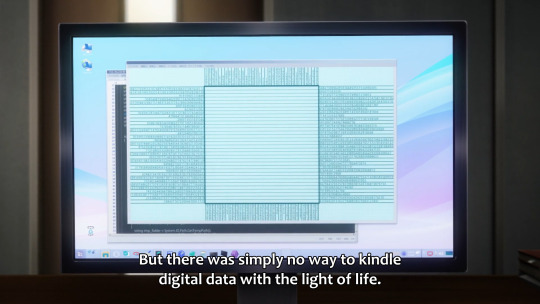
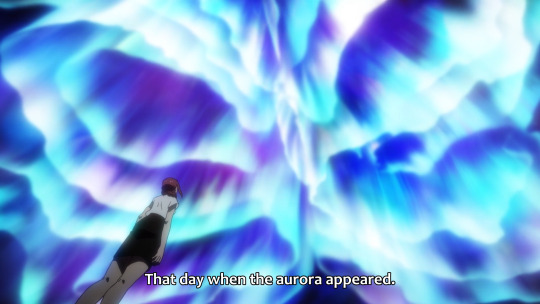
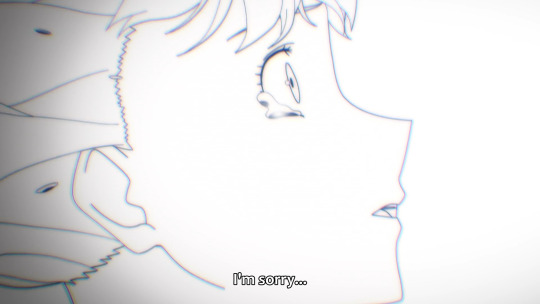
Moreover, here’s another important question: did Menoa ever bother to do any proper introspection when she made it to Liberica? She acts like she tried “everything” to get Morphomon back, but what it seems like is that she banged her fingers on the computer to get code running despite being in a universe where things like Digimon evolution and manifestations have always required epiphanies of the heart (and every attempt to force any of this “manually” has always ended badly). Perhaps you could call it “refusing to think like a child”, thinking only “technical” solutions will be her way out. In terms of her actual mentality, she locked down even harder on the idea there was no way out and that she’d robbed herself of “possibilities” or “potential” by her choices, which, ironically, basically does make the problem even worse, because she blocks off all of her possibilities and potential by staying in a mental loop of considering only returning to the past and staying there as a solution. She constantly says that she and Morphomon were always together before their separation and acts as if Morphomon was suddenly just ripped from her without warning, not even bringing up the fact that they’d been emotionally drifting prior to that. And then when she witnessed Taichi and Yamato getting their own rings, instead of, I don’t know, talking to them about their lives or if they’ve had any existential crises lately, she concludes that “the strongest team” getting the same problem means, yup, this is totally an adulthood thing and everyone’s doomed!
In the end, when Taichi and Yamato’s actions and reaching out to her get to budge just a little, Menoa sees a glimpse of Morphomon again, and what she has to say is “I’m sorry” -- which is confirmed in both novels (Dash X and Shueisha Mirai) to be her apologizing for her failure to realize Morphomon was there the entire time. She hadn’t considered that possibility that Morphomon was still there in some form -- she’d resigned herself to such a cynical mentality of “it’s all doomed and we’re all better off just never getting to that point in the first place” that other ways of seeing the situation hadn’t even occurred to her -- so, again, she’d been the one who cut off her own possibilities in the first place.
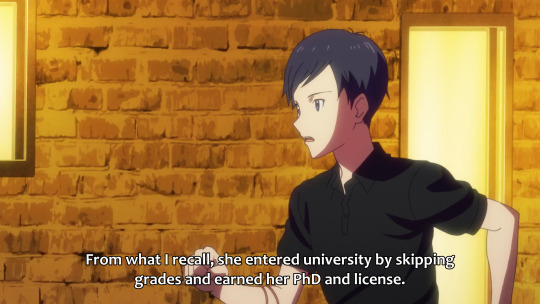
And, on the other end, when you see Ken -- who ultimately ended up completely falling apart at the age of eleven and was eventually spared in going in this direction thanks to the intervention of some friends and understanding parents -- talking about what he’d heard of her as a well-known genius as if it’s another interesting factoid, and not as if something similar had happened to him as a kid, you can see that someone’s moved on so cleanly from all of this that he can talk about it like it has nothing to do with him, unaware of the irony of just how relevant to him this is on the meta level. But given the great time he’s clearly having with his friends in Kizuna, that’s probably for the better.
A digression with a completely unrelated video game
This part’s just for a little fun. I’m a Digimon blog first and foremost, but recently, it came to my attention that a certain video game called The Caligula Effect 2 (originally released June 2021, a little over a year after Kizuna, and recently localized to English) features a character with an almost unnervingly similar backstory and character background to all of the points brought up above. This is to the point where, after looking into it further, it turned out that this ostensibly completely unrelated game might actually be extremely useful for helping explain what exactly led to Menoa's mentality and the social conditions around it, so I've decided to bring it in to help!
Note that I spoil the game below, so feel free to stop reading if you don't want to have to see that.
On top of the friends who gave me tips about looking into this game in the first place, many thanks to @Moxagita on Twitter for providing necessary info and screenshots for this writeup’s coverage of it! If you happen to be interested in the game or the series itself, I recommend checking out this guide she participated in writing with an introduction to the game and relevant content warnings. I obviously cannot claim to be a particular expert on this game right now, but my impression is that its fans are really passionate about it and eager to help others learn about it, so please refer to the guide writers if you have any interest or questions about the series.
The premise of The Caligula Effect 2 (which is somewhat borrowed and tweaked from its predecessor) is that people who have “regrets” in their lives are spirited away to a virtual world called Redo, where they’re allowed to live out a simulation of their life with their ideal appearance in which things had played out differently. So, in other words, if you have a thing in your life where you think “if I just hadn’t done that one thing, I’d be so much happier now,” you get to live a simulation of the life you could have had if you hadn’t done the one thing. Unfortunately, a virtual simulated world is still a virtual simulated world, and an imperfect one at that, so the main party members, the “Go-Home Club” (a pun on a common pejorative usually used for students who fail to make any school club attachments and just “go home” every day after school), get together in an effort to dismantle the virtual world and escape.
One such member of the club is Ryuto, a middle school student hailed as a “child genius”. He noticeably tries to come off as more “mature” than his age should suggest, refusing to be treated as a kid, to the point he even seems to be a bit pretentious to some. And, eventually, when you (the protagonist) get to know him better, he reveals his “regret” that landed him in here in the first place, which covers some concepts that anyone who’s read the above may find to be unnervingly similar...
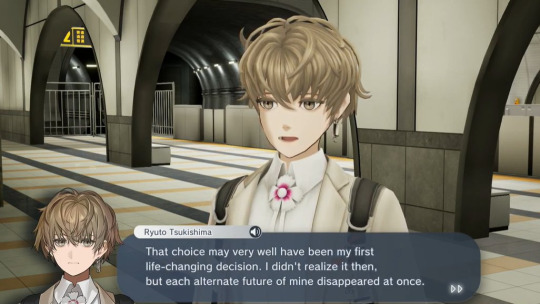
Ryuto’s regret is making a “choice” to enter a university prep school, because he believes that “choice” robbed him of a ton of possibilities, and generally felt that every “choice” he was making was causing more and more of his “possibilities” to dwindle, and because of that he’s wasting his potential and won’t be able to reach expectations. Wait, isn’t that exactly what we just talked about? He’s basically saying what Menoa said, right down to the specific choice of words!
Why does an unrelated video game have such striking similarities to Kizuna in this respect, right down to wording? I don’t think it’s coincidence -- not because the production backgrounds behind the two works are related per se, but rather, because this is a real issue that affects real people! That’s why I’m capable of speculating so much about the exact kinds of things Menoa went through despite only having the limited amount of canonical information I have, because this is such a common pattern and plight forced on those who get designated as “genius” or “gifted” kids that you can (rather unfortunately) predict it like clockwork, and both Kizuna and this video game are works intended to be relatable for the people who have gone through such hardships.
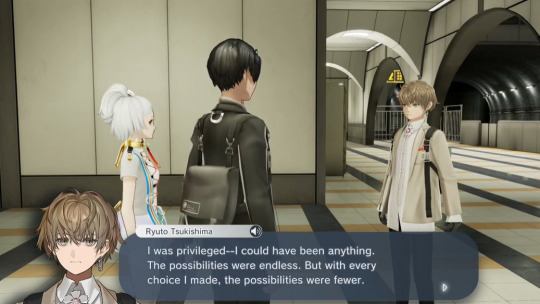
Ryuto’s a little more levelheaded and self-aware than Menoa, and moreover The Caligula Effect 2 has the luxury of being a long RPG instead of a fast-paced 90-minute movie, so we get to see him actually give a proper, drawn-out elaboration as to why he came to this conclusion. He likens it to effectively an intellectual version of “noblesse oblige” -- he’d been born with intellectual ability above that of the average person, which makes it his “duty” to serve and make most productive use out of those abilities for the sake of other members of society who aren’t nearly as privileged.
While there’s definitely some differences in nature between his issue and Menoa’s or Ken’s (Ryuto also states that part of this comes from his family being somewhat wealthy, so economic privilege is in play as well, whereas this wasn’t really implied to be as much of a factor in Menoa’s or Ken’s families), the point is that “gifted” or “genius” kids like him are very often told that they have so much potential that they shouldn’t be squandering. It’s a big reason as to why people in this situation end up constantly crumbling under pressure, terrified of failure, and perfectionist, because every single bit of failure is treated as “wasting potential” or “not being as good as you could have been”. Even the word “gifted” in itself carries this kind of nuance, as if you were magically bestowed a blessing upon you during your birth, which you must now exercise your gratitude for by contributing to society with those blessings. This is the kind of rhetoric that Menoa, Osamu, and Ken are very likely to have been utterly surrounded by once they were recognized as “geniuses”.
And it all ends up having a correlation with the sort of “inevitable fate” sentiment Menoa has during Kizuna, and why making choices is correlated to eliminating possibilities rather than treating everything as infinite options going forward. In a situation where you’re constantly pressured to live the Objectively Best Life Possible, it’s only natural to get into the mindset that there’s only one right way to live, for which you either succeed or fail, and that the outcome of your life is something determined for you that you can’t escape from. So by this logic, choices are bad because they keep eating away at that oh-so-important potential for someone who’s been expected to be some superhuman who could do anything since their birth -- and that’s why Menoa fixates on that concept of “fate” (shukumei), the idea that everything in her life is just trudging towards inevitability and something that others decide for her, and that the only way to escape it is to stay trapped in the past and refuse to walk towards it.
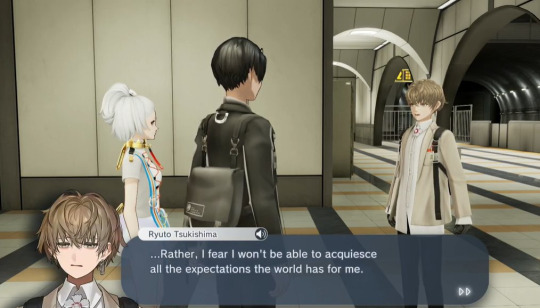
And, speaking of staying stuck in the past: Ryuto’s story also contains the same correlation of “childhood” and “adulthood” as the one presented in 02 and Kizuna. In the virtual world of Redo, a lot of its denizens are adults taking the appearance of high school students due to the romanticization of high school as the ideal part of one’s youth, but Ryuto’s a middle school kid in the real world and a middle school kid in Redo, because he’s terrified of growing up. The expectations placed on him are so high that he’s fearing “failure”, or wasting his potential by becoming a “failed adult”, so even the passage of time scares him and he’s trying to delay the need to grow up so that he doesn’t have to face his fear of making choices. Sound familiar?
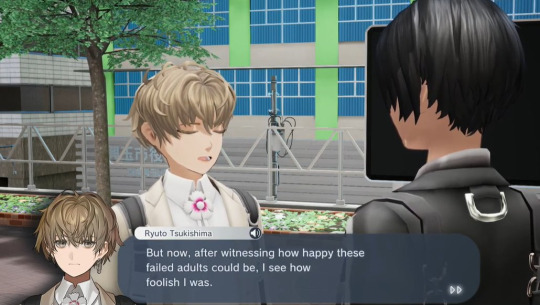
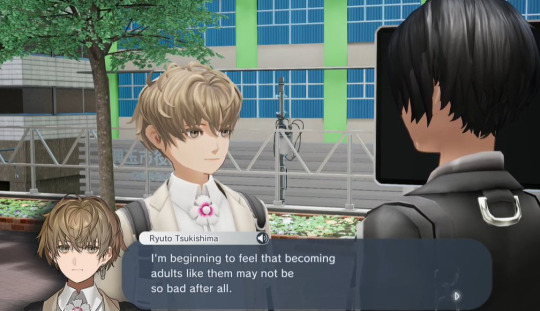
So what’s the resolution to all of this? Ryuto bears witness to his fellow members of the Go-Home Club -- “failed adults” who aren’t even in a good situation in life anymore -- chatting happily and clearly having a lot of fun. Sure, they’re not living up to their maximum potential, but they’re getting a lot more fulfillment than he is, and observing them makes him realize that he’d be a lot happier if he allowed himself to be happy in a similar fashion. Even if he doesn’t somehow maximize his potential, he can still have a happy, fulfilling life, and approach it the same way everyone else does: not knowing what might be in store for him in the future, and taking it on anyway, seeing it as something going forward instead of some impossible goal that he’d probably never be able to realistically reach.
Over the course of the game, Ryuto eventually resolves to become a doctor who can treat cases currently considered impossible, choosing to believe in his infinite potential and future, because of people around him he cares about who would need it. It’s still a huge hurdle, and it’s still something that involves contributing to society, but it’s something he wants to do and has an personal, emotional stake in, not something that anyone particularly asked him to pursue. It’s not like he resolved to take the easy way out; rather, it’s simply that he’s reframing it to prioritize his own reasons for doing things, and doing it out of choice instead of inevitability.
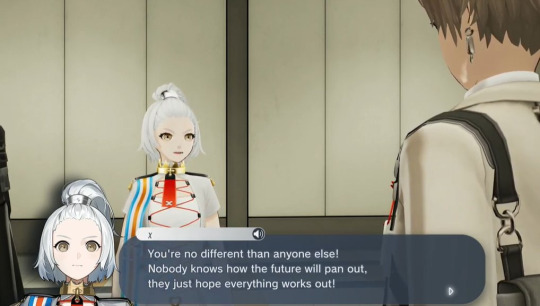
It’s the kind of way of life Motomiya Daisuke would be proud of -- even if it’s not something society expects of you, or even if it’s not the single most ambitious thing you could be doing, you should do what makes you happy, and what you want, genius or no. And when you do find what you want to do, that’s when you should have the determination to pursue it with everything you have, even if it means overcoming intimidating-looking odds, but you’ll be much more likely to find happiness that way because you’re doing this for yourself and your own dreams. Menoa’s big mistake was believing that humans only have a limited number of futures with a limited amount of time, treating everything like a set future where everyone has to get as far as possible within it, instead of the reality of looking forward into the future.
#digimon#digimon adventure 02#digimon adventure last evolution kizuna#menoa bellucci#the caligula effect 2#shihameta#kizuna spoilers
77 notes
·
View notes
Text
Kobayashi’s Maid Dragon S2 Episode 3 Notes

Sparrows! Specifically the Eurasian tree sparrow, known in Japan as the suzume. You can just about see them all over Japan, all year long—but that doesn’t mean they aren’t a season word!
Depending on their depiction, they can be used as a season word for most times of the year, but a major one is “late spring,” as that’s when they’re out and about finding food for their baby birds. You can also see in the art they look a little floofy, indicative of the winter coat they haven’t fully shed yet; suzume in summer have a more sleek look. Here’s a shot of them from late summer last season:
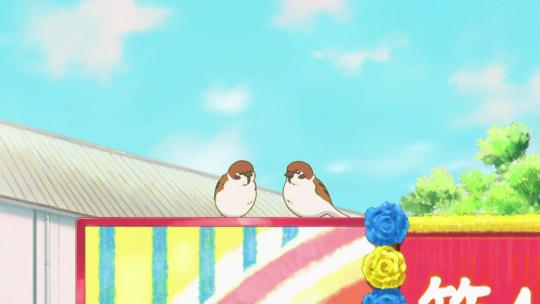
And from closer to winter here↓. Quite fluffy.

As a quick refresher, 季語 kigo, or season words, are words/phrases/concepts used to give a sense of season to a haiku (or other poem/work of art), which is what part of what differentiates them from a senryuu. They were used pretty frequently in a lot of episodes last season, but a bit less so this time so far.


Where Lucoa and Ilulu are talking about a “right” here, the Japanese word is 資格 shikaku. While this usage is similar to “right” in English, the connotation is a little different as the word actually means more “qualification.”
Whereas a “right” is generally something you have innately in some sense (e.g. if you make art you automatically have copyright over it, you have human rights just for being human, etc.), a shikaku is something you earn (e.g. if you study and take a test for certification program and pass, you’re rewarded with a shikaku.)
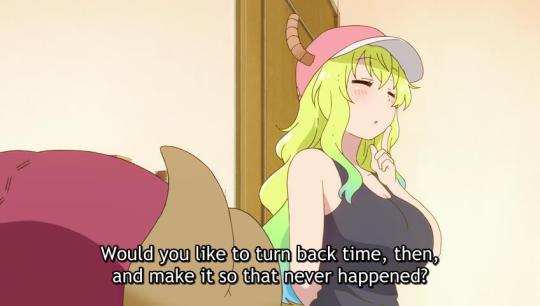
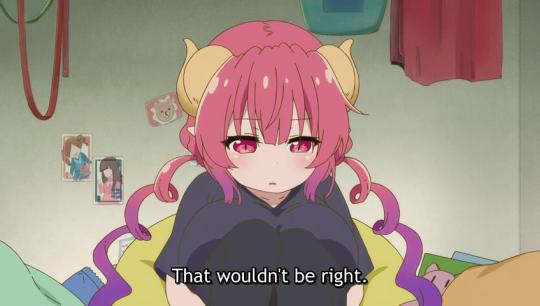
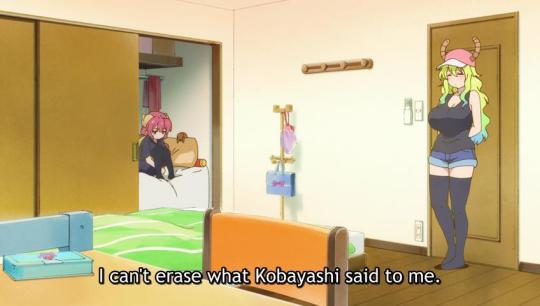
Ilulu’s response to the question here is
そういうのは違う。小林がくれたあの言葉はなかったことにはできないから。
One way in which this differs from the English is that she’s not saying it would be right or wrong, but rather not the solution she’s looking for—because it would also mean undoing the words Kobayashi gave her, and that is something she doesn’t want to do, no matter what.
In contrast the English feels more like she thinks it would be wrong to do that, and even if she did it wouldn’t let her escape what Kobayashi said to her. (That would make more sense if Kobayashi had called her out on being evil, but that’s not really what went down.) An alternative wording might be something like:
“That wouldn’t solve anything. Besides, I don’t want to erase what Kobayashi gave me.”
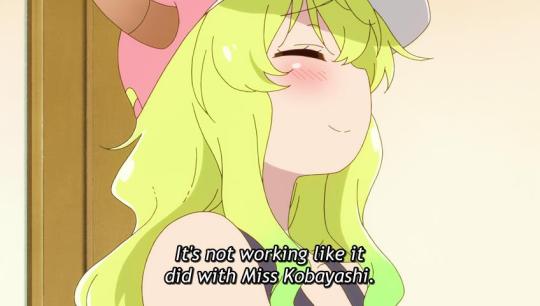
This line is: 小林さんのようにはいかないなー
This is perhaps just my interpretation, but the English here sounds like Lucoa once convinced/helped Kobayashi in some fashion previously, is trying it again with Ilulu, but failing this time. (I don’t that’s ever happened though.)
In contrast, I think the Japanese is saying that Lucoa is trying to be like Kobayashi (e.g. when helping alleviate/solve Tohru’s various worries), and it’s not really working for her. I.e. “It’s not working like when Miss Kobayashi does it.”
Ilulu’s line about “I don’t want to ask Kobayashi about it because she’d probably solve it too easily" seems to support that reading; the dragons know Kobayashi as worries-solver.


The English here has Lucoa saying she’ll go talk to Kanna/Saikawa, and casually telling Ilulu to wait in the bathroom. But Lucoa doesn’t actually talk to the kids, and even if she was planning to, why would Ilulu waiting in the toilet do anything?
The answer is that Lucoa is actually telling Ilulu to talk (to an unspecified subject, assumed to be Saikawa, since she’s a human and thus someone Ilulu feels guilty about interacting with; Kanna she’s more fine with, as a dragon). And instead of “Go ahead and wait in the bathroom,” it’s more of a “Go wait in the bathroom and see what happens,” with the implication Lucoa is going to set something up.
And she does!

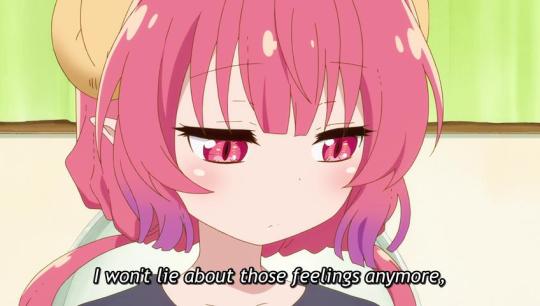

“I won’t lie about X, but Y is a different story.” This seems to imply she will still lie about Y? That seems a bit odd to me, especially when she just lied about X (those feelings) to Kanna/Saikawa minutes ago.
The Japanese says something a bit different though.
The core of the middle line here is 気持ちに嘘をつかない kimochi ni uso wo tsukanai. Because the に, the particle indicating “direction,” is attached unadorned to "feelings,” it is saying not “lying about X” but “lying to X.” This construction, to say one is lying to a feeling, is fairly common in Japanese media. It’s basically equivalent in English to lying to yourself about those feelings.
(for “lying about X” you’d change the に into a について or similar)
So basically she’s saying she won’t pretend, to herself at least, that she doesn’t want to play. But that’s a separate issue to whether she has, as she said before, the “right” to play after what she did.
You could maybe put it sort of like this:
“I won’t lie to myself about my feelings anymore. But that doesn’t mean I can act on them after what I did.”

I feel extremely silly even pointing this out, but the beam here is 尿意 nyoui, which is the urge to pee, not necessarily actually needing to pee. Hence why she seems to stop needing to as soon as she gets to the bathroom and walks straight back to the living room with Ilulu after they talk.

“Be deceived” here is not 騙される damasareru, lit. “be deceived,” but 騙し討ちにあう damashi-uchi ni au, which is like being hit by a sneak attack, being stabbed in the back, etc. In a fairly literal sense in this case too, as they’re talking about actual combat.
I mostly bring it up because it feels like there is not much difference between “being deceived” and “being tricked,” despite those being portrayed as polar opposites (deceived by hostile dragons, tricked by kind Kobayashi), so it might have been wise to differentiate them more in the translation.
E.g. perhaps “She had to change to avoid a knife in the back.” (though dragons don’t use knives, so maybe a claw?)
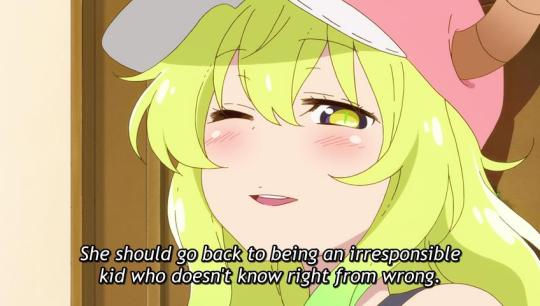
Another pretty minor point, but the “doesn’t know right from wrong” is 分別のない funbetsu no nai, where funbetsu means not so much “knowing right from wrong,” but a more encompassing sense of discretion and maturity.
I mostly bring this one up because it struck as me awkward to say Ilulu explicitly shouldn’t know right from wrong, since that would be going backward to her be okay destroying the city again. Instead it’s more that she shouldn’t need to feel weighed down by what’s “correct” or what she “should” do. One possible alt example:
“So go back to being a kid, and worry more about what you want to do than ought to do.”
(Lucoa also changes from a narrative tone to a more conversational tone at the end, in conjunction with the visual shift away from the flashback, so swapping the “she” to “you” might be appropriate.)

Note how Kanna shuffles the cards here. Depending on where you’re from, this may seem like an odd way of doing it (unless you watched Yugioh maybe). A lot of places with majority English speakers tend to use the overhand shuffle or riffle shuffle, but in Japan (and many other Asian countries) the most common shuffle is the one on display here, known as the Hindu shuffle.
~The More You Know~
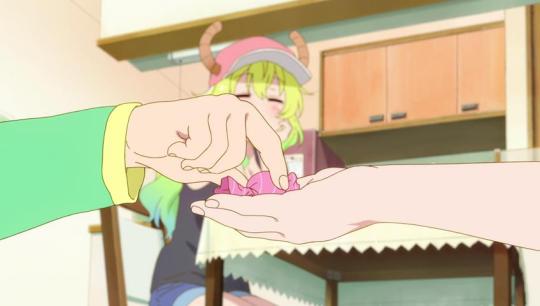
The act of handing over a piece of candy like this has been used as imagery in other places in the show as well, though I’ll leave thinking about what it represents to you.


“Blanket” is futon, which is used to refer to both the “mattress” part and “blanket” part of a full futon, the traditional Japanese bedding (not the same thing as the sofa/couch mattress you might hear called a futon in some places).
I mostly mention because just “a blanket” kind of sounds like they’re going to leave them on the floor, but they’re actually going to get the equivalent of a guest mattress (+blanket) to put them to sleep in, as it’s late enough for this to turn into a sleepover.
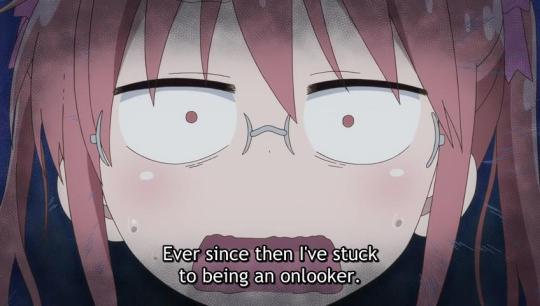
Just as a bit of trivia, the word she uses for “onlooker” here is the same term as the “spectator faction.” In the manga Tohru interjects with “Aww, come on, why not Chaos faction instead?”
Also as a side note to this whole bit about Kobayashi wearing a maid outfit; recall this scene from early in season one, where Tohru found an outfit Kobayashi had bought and stuffed deep in a closet:
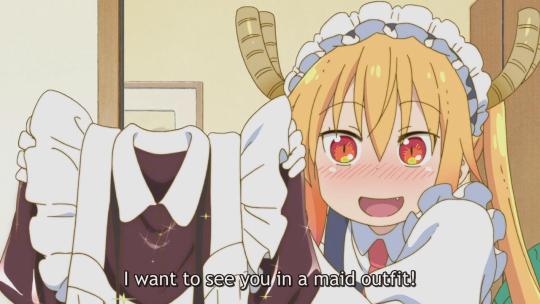
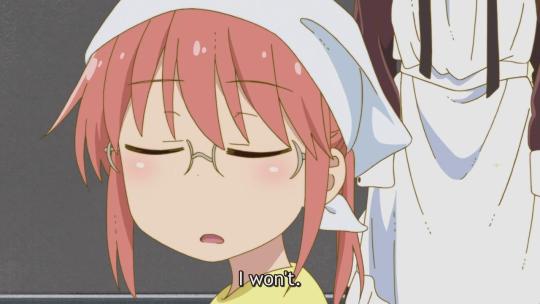
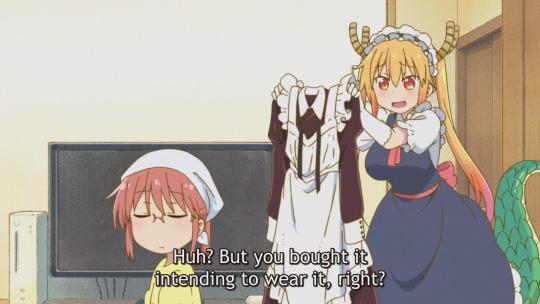
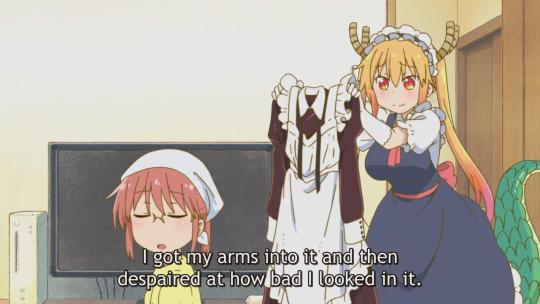
Relevant! Anyway, back to the actual episode now:


If you felt like this exchange felt a little disjointed, especially given Tohru’s tone of voice: the idea is that Lucoa is saying Tohru really goes to extremes when it comes to matters relating to Kobayashi, which is implying that it seems excessive to call so many people over for a relatively mild issue (not that she necessarily minds though). Tohru’s response is a slightly defensive “yeah I know, but thanks for coming over anyway.”
(They’re saying it in ways such that you have to read between the lines a bit though, so it may not come across as easily in a translation.)
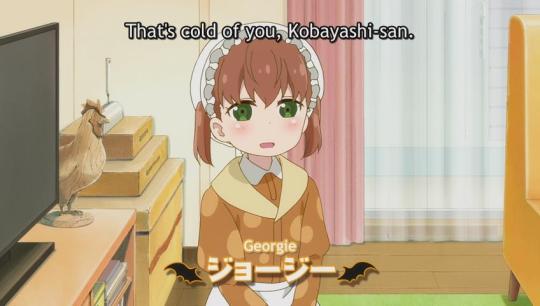
The word for “cold” here is 水くさい mizu-kusai, basically meaning “watered down” (like beer etc.), and used frequently to refer to a person/actions/words that the speaker considers too reserved for the relationship they have with the other person.
So it’s similar to cold, but cold in the context of already warm relationship. If talking about a stranger or someone you don’t get along with normally, you shouldn’t use 水くさい; you can just say 冷たい tsumetai (lit. “cold”) or similar.
In this context you could probably have her say “No need to apologize, Kobayashi-san.”
Also I like how they swap around the honorifics (Miss, Lady, -san, -sama, etc.) based on the speaker (I think differentiating between dragons and native-Japanese-speaking humans?). I would say it works given the setting, but that’s just me.
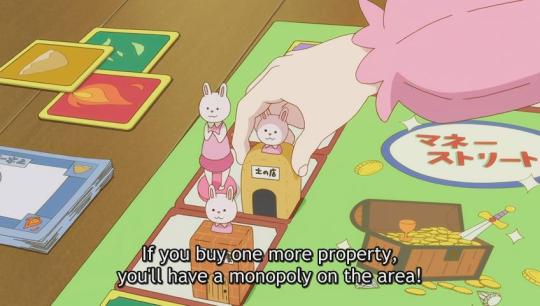
The text there says “Money Street.” It’s probably obvious, but it’s based primarily on Monopoly, which is semi-popular in Japan (though not to the extent as say in the US).
Just some trivia, but the “sales pitch” for the game in the Japanese market is more that it’s an educational game that teaches investing and negotiation skills. (The origin of the game in general being an educational tool about exploitation of tenants by landlords, so not quite the same thing.)
Japan also has Momotarou Dentetsu (”Momotetsu”), which is a video game series that’s been around since the NES and is broadly similar to Monopoly rules-wise.
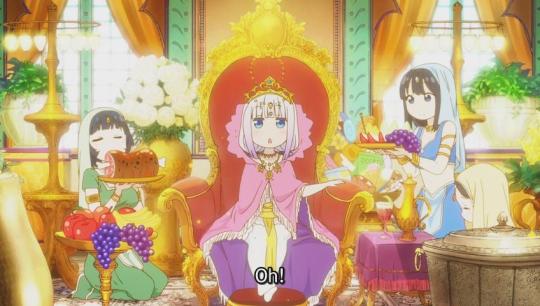
I just want to point out, amid all the riches, the bag of potato chips and other junk food in the back there.

Mini-trivia: the cardboard boxes in the background there seem to be a mix of the Amazon logo and the Seino Transportation logo, a Japanese shipping company with a kangaroo logo.
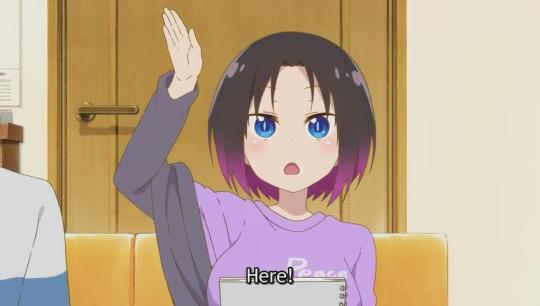
You probably noticed it without me pointing it out, but I enjoyed the fact Elma got corn starch* all around her mouth from the daifuku and then immediately got told to go play with the kids while the adults are talking.
*It may seem like powdered sugar if you’re used to donut holes, but daifuku, like most Japanese sweets (wagashi) generally, is not heavily sugared and not even particularly sweet by the standard of most “sweets” (which is part of the appeal for many). The skin of the daifuku is powdered with corn starch or similar simply to make it less sticky.

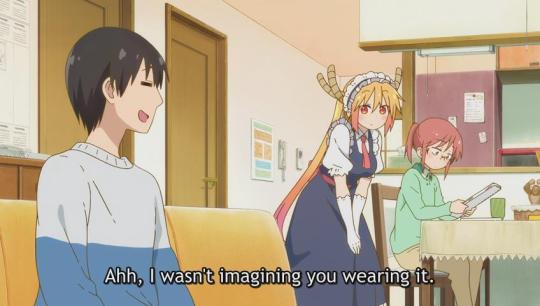

Kobayashi’s “do that” here is やろー yarou, which can mean “let’s do X” (which is a construction often used to tell/suggest someone to do something, without really including yourself in the “us”).
However in this case—especially given Kobayashi’s pronunciation and tone of voice—I think it’s actually a homophone of that, a form of 野郎 yarou, a word for “guy” with often negative connotations, like saying “son of a” or “asshole” etc.
The idea, I think, being that his immediate agreement of “Oooh, right I didn’t think about you wearing it,” comes with a heavy implication of “yeah you’re right, you couldn’t pull off something cute like that,” so she’s replying with a (mostly good-natured) “oh you fucker.”

This giant 完 kan means “the end,” used like ���fin” at the end of a story or game etc. It’s also frequently used in “fake end” jokes. E.g. a show about a sentient zombie might start with the main character getting hit by a truck and dying immediately. The end! ...Except not, and they wake up as a zombie.
So here, the original goal was “make a maid outfit for Kobayashi to wear.” Then Georgie convinces Kobayashi that anything is a maid outfit as long as you are a maid at heart, so really, she’s already wearing one! The end! ...Except not.

Here’s some extra, probably needless, context on this “annoying”: it uses the word 面倒くさい mendokusai, which is basically used to describe something as annoying, a pain, etc. When used to describe a person like this, one of the ways it can be taken is specifically that the person is really fussy about details that others wouldn’t really care about—which describes Kobayashi about maids pretty well.
So just for clarity, it’s not necessarily “I became an annoying person who is a maid otaku,” and can be more of a “within the context of my maid otaku-ness I became annoying.” Just to kind of shed some light on the extent of her self-deprecation here.

The word Kobayashi uses for “helping with the housework” is 家事手伝い kaji-tetsudai, which is a noun* that means “a housework helper”... here, basically a more bland way for a native Japanese speaker to say maid.
Hence why Tohru reacts with “Oh, don’t call me that, call me a maid!”; Kobayashi went as far as to acknowledge her clothes as a maid outfit, but not quite as far as calling her maid outright. That’s our “annoying maid otaku” doing her thing.
*It can also be verbed.

These neighborhood notices, 回覧板 kairan-ban, ~lit. circular notice, are a method used by local governing organizations to distribute information or forms etc. For example, about an upcoming neighborhood event to pick up litter.
The general idea is that one person gets the notice, reads it, signs it, then goes and passes it to the next household in line. It saves paper versus sending everyone a thing in the mail, encourages interaction between neighbors, and is more likely to be read than a flyer/email, though some people consider them a pain and they generally feel a little dated.
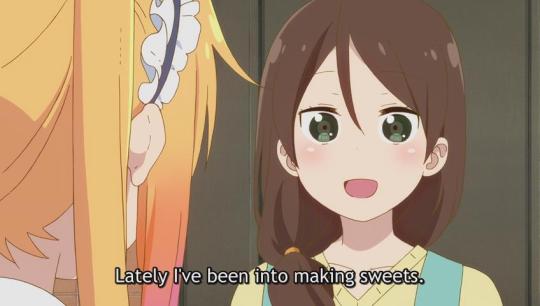
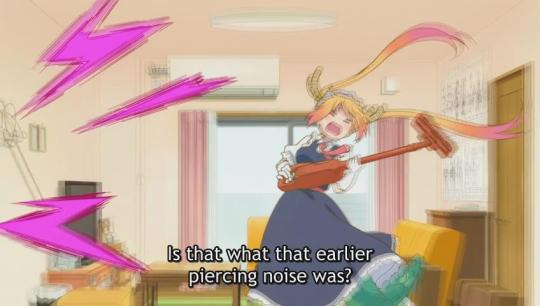

The phrase for “piercing noise” is 劈く金切り音, tsunzaku kanakiri-on, ~lit. “ear-piercing sound of tearing metal.”*
“Was it that loud?” in the Japanese is a little different, そんな音してた?, meaning “was it making a sound like that?”
I’m mostly just bringing it up to say that the “Sasakibe’s cooking isn’t just loud, the sounds don’t even make sense” gag is alive and well this season.
*The “sound of tearing metal” phrase can also used idiomatically for some types of high pitched sounds, but I imagine it was chosen very deliberately here.
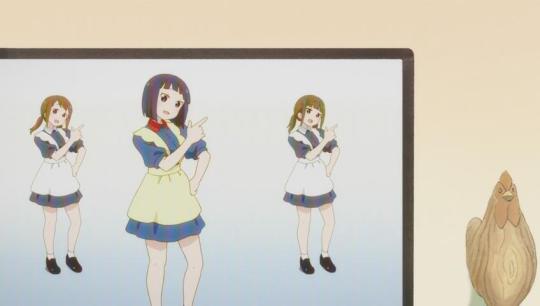
It’s probably obvious, but this is a reference to the music video of the OP for season one. You can see it on the official channel for the band, fhána, here.
The season two music video is here, and it seems to have decent English subtitles for the lyrics if you’re curious what they are.

The adjective here is ニヒル nihiru, an abbreviation of nihilistic. It can be used as actually “nihilistic” like in English, but it can also be used more colloquially to describe a person with dark vibes. It can almost be a compliment!
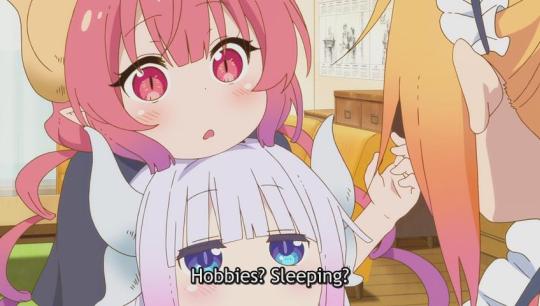
“Sleeping” here is 惰眠をむさぼる damin wo musaboru. Damin is not just sleep, but “worthless” sleep—not like a nap because you’re tired. Musaboru is a verb for ~gorging upon on something (often metaphorically, not just food).
The two words are somewhat frequently used together for, basically, lying around the house doing nothing all day. And not in a particularly flattering way, so it’s pretty funny for her to just be like “yeah I do that as a hobby I guess.”
It doesn’t mean the same thing, but it’d be like saying your hobby is loitering. Maybe could have translated as like “Hobbies? Vegetating.” or “Procrastinating?” or something, though I don’t know if those would have the right impact...


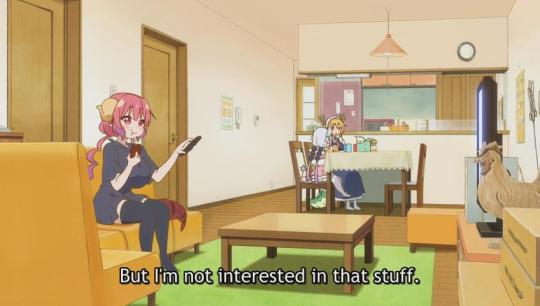
Kanna’s word for “idol” here is アイドル aidoru, i.e. idol in the pop culture sense.
Tohru’s word is 偶像 guuzou, or idol in the religious sense.
(Tohru swaps to the pop culture “idol” when she starts talking about Kobayashi though.)
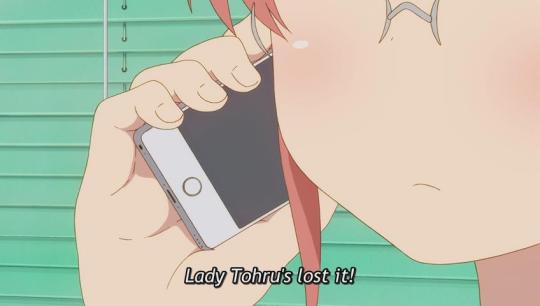

Kanna’s “lost it” it here is 大変 taihen, a pretty common, almost generic word used as an intensifier (greatly, immensely, seriously, terribly, really, etc.) in both positive and negative ways. E.g. “thanks, you really saved me!” or “that was extremely rude.”
When used alone, like here, it usually implies something bad has happened, like something has befallen Tohru and/or she’s in some sort of trouble. Hence why Kobayashi immediately rushes home worried and bursts through the door like this—and loses her tension when she sees Tohru is fine, just... extreme(ly annoying to Kanna and Ilulu).
You could maybe say e.g. “Something’s wrong with Tohru!” to keep that double meaning open.
(”Lost it!” also makes sense for Kobayashi to be worried about, but the type of worry is somewhat different in that case; “oh god what is she going to do” vs. “oh god what happened to her.”)

The “lick” here is べろ bero, an onomatopoeia for licking that’s also used as slang for "tongue” (noun).
A bero chuu, as in the chorus here, is slang for a French kiss/deep kiss/tongue kiss.
~The More You Know~

The text here says “If your total assets are above one billion, proceed towards goal.”
Only billionaires can win...
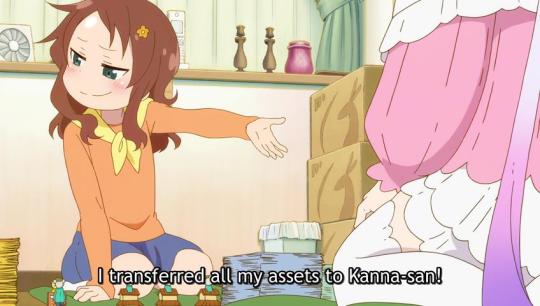
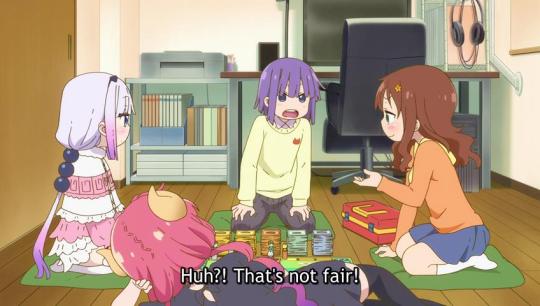

Here is 私のものはカンナのもの, lit. “What’s mine is Kanna’s!”
This line is a reference to a catchphrase of the bully/antagonist in Doraemon, Gian: “What’s yours is mine, and what’s mine is mine.”
His line, and character, is so well known it’s spawned the term “Gianism” to represent that sort of self-centered philosophy: everything is rightfully mine to take, even if you think you lay some claim over it.
It’s interesting that the inversion of Gianism, i.e. “what’s mine is yours,” is the only way Kanna and Saikawa are able to overcome the rules, beat the billionaire, and win the game.
Solidarity forever.
41 notes
·
View notes
Text
Darrow is Not Going to Die at the End of the Series Part 2
There are probably going to be at least one or two more parts depending on how much I can stop myself from blathering on. Anyway, spoilers ahead for the following: Dark Age, Hunger Games, Castlevania, Trollhunters: Rise of the Titans, Avengers Endgame, The Hobbit, Voltron, FMA, HttYD, Death Note, Madoka Magica, Merlin, Kipo and the Age of Wonderbeasts, HunterxHunter, Dragon Prince, He-Man (the new one), Yu Yu Hakusho, Persona 3. Mass Effect, The Hollow, Camp Cretaceous, and whatever else I can think of.
I last left off on talking about how my thoughts implied that Darrow could die at the end as long all the loose ends are tied. But, I don’t think that that’s really something that can actually happen. A lot of this is speculation on my part and really relies on what happens during the 6th book.
The first thing that came to mind was Mass Effect. The ending of Mass Effect 3 was...not very well received. I’m not going to say that I’m particularly happy with it either but I also think it fits the narrative. However, one thing to note, video games are different than books and the story that Shepard goes through is reliant on the player. Also, stories in games are going to be shorter than stories in books (for the most part, there are definitely exceptions) due to player involvement.
I’m going to start with Shepard’s first death, at the beginning of Mass Effect 2. Of course, being the second game, their death couldn’t be permanent unless BioWare switched protagonists mid trilogy. There are a few reasons, in my opinion, that Shepard was killed during the opening credits of the second game.
First of all, the combat changed between games (a lot between the first and second and only slightly between second and third), and I think Shepard’s two year absence gave a reason for a tutorial on the new combat system. They were dead and had to learn how to use new technology. This is also done between the second and third games, with a 6 month gap, but the combat only changed slightly. Secondly, having the main protagonist die really highlights the threat that the player is dealing with in the second game but, Shepard’s return also shows that they still have unfinished business and that their story isn’t over. Thirdly, I think the absence gives time for the secondary characters time to develop on their own. This is shown more with the characters who appeared in the first game but also it gives an idea of just how much of an impact Shepard had. I feel like this is a parallel to the time Darrow spent in the table between GS and MS.
Now to move on to Shepard’s more permanent death...although if you complete the game entirely (at least in the legendary edition; thank goodness I hated the battle readiness thing) there is a dubious ending where Shepard may or may not have lived. But in any case, Shepard is considered dead and their story is over. Whatever my feelings about this may be, this type of ending didn’t come out of nowhere. The main threat, the Reapers, have been dealt with in a permanent manner, or at least it’s heavily implied that they won’t be coming back. However, just because the Reapers are gone doesn’t mean there aren’t still things to be done. Specifically, recovery. Shepard very well could have been involved in this but it’s not necessary. Their story is over, they have dealt with the threat and it’s not coming back.
Darrow, on the other hand, has not finished his mission. Even if he does by the end of the next book, however, it’s a very different circumstance from Shepard. The threat in Mass Effect was a very large and tangible thing, whereas the problem Darrow faces is an ideology and the people who hold those views. Something like that doesn’t end with a large space weapon pointed directly at the threat; it permeates everything. So even if Darrow defeats Atalantia, Lysander, and whoever else, there’s most likely going to be more people who shared belief that Golds are best. Also, we saw how the Vox Populi felt about the things Darrow was doing. Darrow is essentially reconstructing an entire system of government and, no matter how correct Darrow is, there will always be people who disagree with him.
Assuming Darrow defeats the remnants of the Society, stops the Ascomanni, deals with Quicksilver and whatever he’s doing, takes care of Atlas, handles Apple, what’s left? Much like with the end of Mass Effect, what’s left is recovery. The difference between these two, however, is that while Shepard was not necessarily needed for the rebuilding, Darrow would be.
Now, both Shepard and Darrow spearheaded their respective causes, but (and this relies heavily on how the sixth RR book goes) defeating the Reapers was a group effort, utilising every species and as many resources as they can spare. No doubt the rebuilding of the entire galaxy will require the same. Not that Darrow’s goal hasn’t been similar in that regards, with the help of so many different Colors being necessary. It’s just....Darrow’s circle feels a lot smaller than Shepard’s.
I mean, obviously being the face of a war is going to get you a lot supporters and people to work with, but the most important players are Darrow’s close friends and family. I’m sure part of this is the fact that the books are first person with specific POVs. Mass Effect does focus on Shepard’s story, but it’s in third person and you get a lot of different information through sidequests and talking to other characters. I mean, there’s a whole codex in Mass Effect with a lot of information and there isn’t one for RR (PB should make one tho). Our knowledge of the universe and its history is more limited in RR than Mass Effect, but I think that’s mostly because the lore in Mass Effect has more of a direct impact on how the story goes.
But back to the original point, it’s explicitly shown in Mass Effect that it requires everyone to stop the Reapers. And even though we see Darrow’s army, the main players, the ones who are taking care of the big things, are still Darrow’s inner circle. As an example, Mass Effect would be more like a pyramid (ironic) where Shepard is at the top. Even if it crumbles away (they die), the pyramid will still stand. For RR, it feels more like a chain. If one of the links (Darrow) breaks, then the chain is also broken. You could re-attach the pieces but it wouldn’t be as strong as it once was.
One last thing I wanted to bring up (which I will bring up again in part 4, yes I said part 4), is technology. Both Mass Effect and RR take place in the future and therefore have better technology than we do. There is something very important about this technology though that makes it more likely for Darrow to live. The Reapers are a race of sentient squid machines hellbent on the genocide of every other sentient species in the galaxy. But they are the ONLY things with access to that kind of technology. Even when they share it with Saren or the Collectors, it’s not something others can replicate. And once they’re destroyed (control ending notwithstanding) at the end of the third game, that’s it. They could still have people who are indoctrinated (although I think that stops when the Reapers were destroyed?) or people who are just stupid and think they were right, but...those people aren’t a threat. They can’t bring back the Reapers, I doubt anyone would be able to recreate such a thing (at least not within Shepard’s lifetime even if they did live). So once the Reapers were gone...that’s it.
Now, the technology in RR is, for the most part, accessible to everyone. Assuming Darrow defeats Atalantia, Lysander, etc. their way of thinking would still be around. But with the way the universe works, I think it would entirely possible for supporters of the Society to rise up and start a conflict all over again. This means Darrow is not finished yet, even if the immediate threats are gone. It wouldn’t make sense for him to die when there’s still stuff for him to do.
I do think, though, that it is worth mentioning that the definite ending of Mass Effect is probably related to the fact that it’s a video game and especially for stories like that, a more open ended conclusion with the implication that I COULD do more would only be frustrating. With tv shows, movies, and books, I notice, having a more vague ending works better because you’re just separated enough from the story that you can enjoy the implications of more stuff without feeling unsatisfied. There’s always exceptions of course.
ANYWAY, it part 3 I’m going to be talking about Persona 3 and 5 so....stay tuned.
12 notes
·
View notes
Note
Hey, since you're basically the only person on my dash who ever talks about playing games I thought I'd ask you. I'd like to start playing games, because some look really cool, but I don't know what games are fun and not too expensive (because the price of games scares me of a little). So, do you have any recommendations for someone who hasn't played anything since they played childhood games for games that are playable on pc?
oh man, it really...depends on what kind of game you're looking to play. There are a lot of things to take into consideration including difficulty, game style, computer capacity...
I got my start on video games with...actually Dragon Age 2, but the Dragon Age games generally, which were pretty friendly in terms of gameplay for a novice and also are strongly narrative driven and involve roleplay elements, which is deeply appealing to me in a game. (i.e. you get to make choices about what your character does that drives the game direction differently depending on how you play - this also makes a game good for replayability.) if you prefer sci-fi you can also try out Mass Effect though I personally found the controls a little harder to figure out than Dragon Age’s.
if you're averse to games that require a lot of figuring out controls/combat, you could try interactive text games, of which there are many - I haven't played a lot of them, but my favorite that I have by far is Fallen Hero: Rebirth, where you play a former hero turned villain. It's great - the only downside is it kind of ends on a cliffhanger. There is supposed to be a sequel, but I haven't heard any word about when it'll be out.
if you're feeling like tackling something more open-world/exploratory (though still with narrative elements), I also picked up Skyrim pretty early on and found it...not easy but not too hard to pick up when I was playing on easy. (and no shame about playing on easy, seriously, sometimes it's just more fun that way.)
if you're a Marvel fan (which, idk, you might be since you're following me but also I've been light on the Marvel lately and I have no idea how long you've been around), a very low pressure, low stakes, and entertaining game is Lego Marvel Superheroes. it's very low key and low stress.
oh yeah! there’s also the Sims, as a series - I haven’t played any of the updates since Sims 2 (which I greatly enjoyed) but that one’s a lot of fun and pretty easy to get started.
but honestly...some of this involves just trying things out and seeing what works for you. I've definitely had to learn what I like/don't like in a game - particularly when it comes to finding a balance between story and mechanics. I haven’t even touched on things like civ/city-building games (both of which I have enjoyed), or exploration/survival games, or dating simulators, or MMORPGs. I would say that I am on the whole not what one would call a very “skilled” or “experienced” gamer, and I can get easily frustrated, so generally speaking anything I play is probably not too difficult (at least on the easiest difficulty).
I will say as far as price goes - there's pretty frequent good sales on games that'll give you steep discounts. I just use the Steam wishlist function (which gives me notification emails when things I want go on sale), but you can also create an account on isthereanydeal.com which will let you know about sales on other (non-Steam) platforms/websites. there are also some games that're free to play in browser - I've never managed to get purchase on Fallen London, but I know there are a lot of people who're fans, and while you can pay to get more features you don't have to.
hope that helps! and that you find something you enjoy.
#conversating#anonymous#advice column apparently#new ways to procrastinate#now i wish i was playing video game#unfortunately i have 'gainful employment'
13 notes
·
View notes
Text
The Curious Case of the Original Women of Ravenloft (or Loose Canons Can Be Dangerous)
For many years, we in the Dungeons & Dragons RPG studio have considered things like D&D novels, D&D video games, D&D comic books, as wonderful expressions of D&D storytelling and D&D lore, but they are not canonical for the D&D roleplaying game.
-Jeremy Crawford
Those among us who are fortunate enough to become shepherds or stewards of the D&D game must train ourselves to become art and lore experts so that we know when we’re being faithful to the game’s past and when we’re moving in a new direction. We decide, based on our understanding of the game’s history and audience, what artwork or lore to pull forward, what artwork or lore needs to change, and what artwork or lore should be buried so deep that it never again sees the light of day.
-Chris Perkins
There is a very simple statement to be made about all these stories: they do not really come off intellectually as problems, and they do not come off artistically as fiction. They are too contrived, and too little aware of what goes on in the world.
- Raymond Chandler, "The Simple Art of Murder"
There's been a bit of a stir in the D&D community over some comments that Jeremy Crawford made at a press briefing prior to the D&D Live event about how only the information published in a WotC Fifth Edition D&D product is 'canonical' for D&D. There was enough of a reaction that Chris Perkins, self-described as "one of the D&D Studio's principal game architects", published an article on the WotC site (linked under Perkins's name above) explaining this statement and explicitly calling out what it means when discussing an intellectual property with a long-standing and vast catalog of lore, where that lore is one of the primary positive features of that property.
On the surface, it seems pretty straight-forward. Crawford's comments focused on not overwhelming partners with lore requirements when producing peripheral products like novels and video games so that they can focus on producing their product rather than meeting arbitrary lore requirements (not that this seems to have helped the most recent video game product release). Perkins mentions this, too, explicitly evoking R.A. Salvatore's novels and how Salvatore (perhaps infamously) used to incorporate elements into his stories that were outright illegal according to the D&D game rules (such as Drizzt's dual-wielding of scimitars, only made legal in 5e, or his creation of Pikel Bouldershoulder, a 'mentally challenged' dwarf who believed himself to be a druid and even eventually displayed druid-like abilities, even though dwarves in the D&D of the era of the Cleric Quintet series, where Pikel appeared, were not allowed to be druids). Perkins's comments also refocused the discussion on players, DMs, and their games, making the point that every campaign develops its own canon, and that the version of the Forgotten Realms run at a given D&D table does not perfectly match either the version of the same world run at a different table, or even as presented in the official published campaign sourcebooks.
This position is easily defensible; I even presented it myself in a response on Twitter to Perkins's own comment on an event in the Acquisitions Incorporated campaign he runs and records for online consumption. A restaurant that exists in the Forgotten Realms of Acquisitions Incorporated might have been shut down for health reasons after a shambling mound attack in a different campaign, or a previous party of PCs might have made a disastrous error during the war with reborn Netheril that led to the fall of Cormyr, with the coastal area of the former kingdom being absorbed by their rivals in Sembia while the interior lands were allowed to be overrun with monsters migrating out of the Stonelands (which makes for a nearly ideal 'starter zone' for a new 5E Realms campaign, IMO).
But just because there are benefits to such an approach to canon doesn't mean that it's the best way to approach canon, particularly with respect to a property which has had a long lifespan and is expected to have an even longer one. There are plenty of ways to criticize such an approach, many of which have been brought up by other commenters:
In any long-lasting intellectual property, there is a core of fans that are devoted to the lore and canon of that property -- see Harry Potter, Star Wars, etc. 'Loosening up' the lore not only convinces your existing super-fans not to continue to support and evangelize your property, but also prevents the creation of a new generation of such fans to continue your property's life into a new generation of fans.
Since much of what is on offer in a published sourcebook is the current 'canon' (despite Perkins's statement that "we don't produce sourcebooks that spool out a ton of backstory", the reality is that much of the content of sourcebooks like the Sword Coast Adventurer's Guide and Van Richten's Guide to Ravenloft is setting material: i.e.: "backstory"), if you're not going to stand up for the lore of prior editions, and by implication make it clear that future editions aren't going to be beholden to the lore of even this edition, then why get heavily invested in the lore at all? (This ties into the above point, as the fewer people who get invested in the lore of a property, the fewer evangelists for that property you will produce.)
If you have any Organized Play for your game (which D&D does, as does so-called 'living card games' which are based on an advancing storyline), loosened canon makes it easier for those authors to produce content, but simultaneously makes it harder to incorporate the content that players enjoy into the overall game. In addition, the later stories can't take into account all of the potential outcomes that a given group might have taken through a given adventure, so in effect, this turns all adventures into "railroad plots" with respect to the larger campaign narrative, where the best outcome is assumed for each adventure and thus the PCs don't really have the ability to influence the overall metaplot. (This gets complicated, because it necessarily involves different campaign outcomes contesting with one another to become the 'canonical' outcome, which is itself pretty challenging. Regardless, one of the attractions of a 'living campaign' is that the campaign in theory adapts to respond to the actions of the players; a 'living campaign' that doesn't do this is no different than a traditional scripted campaign.)
Perkins's final point in his essay, though, seems just as important to the current 'administration' as any of the other explanations, and that's the quote referenced at the top. In effect, what Perkins is saying is that the 5E team wants to be able to take what they consider 'good lore' and keep in in the game, while revising or outright eliminating 'bad lore'. Again, this seems like a defensible position, but it also has a flip side: it assumes that your changes to the lore are not just lazy or arbitrary, but are made consciously and for specific reasons. This could work well if you actually follow through on your intention, but given the realities of publishing on a schedule, it's inevitable that some amount of lazy or arbitrary decision-making will occur, and in those decisions, you can inadvertently (or allow someone without your knowledge to deliberately) make decisions that harm the canon. The statement seems reasonable, but as we'll discover below, it's actually fundamentally dishonest.
With that in mind, let's explore...
The Curious Case of the Original Women of Ravenloft
The original Ravenloft setting as released in the early 1990s, like the game studio that released it, contained a lot of old white guys, and it didn't necessarily get any more diverse with time. The early 3E Ravenloft product "Secrets of the Dread Realms" by Swords & Sorcery Studios lists eighteen Domains of Dread, half of which were unambiguously run by old white dudes. Depending on how you want to define 'old' and 'white', you could even add a few more domains to the list (such as Verbrek, ruled by the son of the former old white dude darklord, and Markovia, depending on whether you consider Markov to still be human enough to qualify as an old white dude). Only five domains were ruled by female darklords, and one of those (Borca) isn't even wholly ruled by the female darklord. Comparing the darklords of Secrets of the Dread Realms to that of Van Richten's Guide to Ravenloft points out just how much of a priority it was for the 5E team to increase the diversity of darklords in the setting.
Curiously, though, the female characters retained from classic Ravenloft don't appear to have been changed in a manner that fits Perkins's explanation of what they consider when deciding what to bring forward from older lore, as in nearly every case, the character became less interesting and possesses less agency in her current 5E presentation than she did in her original pre-5E incarnation.
Jacqueline Montarri
Let's begin our survey with a character who technically doesn't yet exist in 5E lore, and thus by Crawford's definition doesn't exist in lore at all. It might seem odd to begin my presentation of 'female characters deprived of agency by their 5E presentations' by starting with a character who wasn't presented, but on the other hand, being removed from canon and thus from existence could be argued as the most severe loss of agency possible for a character.
Jacqueline doesn't exist in 5E because the organization she founded, the Red Vardo Traders, doesn't exist in 5E. In older editions, the Red Vardo Traders was both a legitimate trade company as well as a criminal organization engaging in smuggling, assassination, and other crimes, and are based in the Barovian town of Krezk. The version of Krezk presented in Curse of Strahd, however, makes no mention of the Red Vardo Traders, choosing instead to present Krezk as a small village dominated by the Monastery of Saint Markovia*, a location that does not exist in pre-5E Ravenloft. The Red Vardo Traders were founded by Jacqueline for a specific purpose, and thus both their legitimate business operations and their criminal pursuits are but shells for their true purpose: to find Jacqueline Montarri's head.
* - Saint Markovia himself was initially presented in the late 3E reboot adventure "Expedition to Castle Ravenloft", as one of the inhabitants of Castle Ravenloft's crypts; Markovia was changed from a man into a woman as part of Curse of Strahd, and the Sanctuary of First Light, the largest church of the Morninglord in Ravenloft pre-5E and placed in Krezk by its developers, was re-written in Curse of Strahd as the Monastery of Saint Markovia.
Montarri sought the secret of eternal youth, and in doing so, consulted with the Vistani seer Madame Eva to find it. Eva originally resisted, but finally revealed that the secret rested within the library of Castle Ravenloft, and Jacqueline, out of a desire to be the only possessor of such a secret, out of a need to do evil, or perhaps both, murdered Eva before departing for Strahd's castle. Unfortunately, Jacqueline's infiltration of Castle Ravenloft attracted Strahd's attention, and she was captured, turned over to the villagers in Barovia, and beheaded for her crime against Strahd. However, some of Eva's fellow Vistani asked to take custody of the body, explaining that the woman had murdered their leader, and Jacqueline eventually awoke -- wearing Madame Eva's head. She since learned that she could 'wear' the decapitated heads of others, and cannot survive long without one. Jacqueline's body has not aged, but her head ages a year for each day she wears it, requiring her to continually murder (and possibly assume the identities of those she murders) to survive while she searches for her original head, the only thing that can break the curse that Eva's kin placed upon her.
That's a pretty amazing backstory, and one I'd think would be very worth including in a new Ravenloft setting, save for one problem: Madame Eva's death. Now this isn't actually a big problem in the context of classic Ravenloft: both Eva herself and her tribe of Vistani were known to have a 'curious' relationship to time (former Ravenloft writer John W. Mangrum explicitly called Madame Eva a "time traveler" when it was pointed out that Eva's continued existence in Ravenloft canon suggested that she had not actually been killed), but it did cause confusion among those with a more static approach to continuity. Since Eva unambiguously exists in 5E Ravenloft, being referenced in both Curse of Strahd and Van Richten's Guide to Ravenloft, it appears that the decision to jettison Jacqueline and her Red Vardo Traders comes mainly from a desire to untangle that confusing bit about Eva actually being dead but still walking around.
Granted, the need for an organization like the Red Vardo Traders is perhaps less significant in a Ravenloft where the Core doesn't exist and every domain is its own Island of Terror, but given that Van Richten's Guide to Ravenloft still lists a number of organizations known to be capable of travel between domains, including two that they just invented out of whole cloth, it would seem as though making use of a pre-existing organization might have worked just as well. The other complicating factor is that Montarri is not herself a darklord; with the focus of the 5E Ravenloft experience on darklords as linchpins of the setting, having a compelling NPC who isn't a darklord (but who honestly could be made into one fairly easily, as her curse lends itself to a darklord's punishment and her formation of the Red Vardo Traders into her way of dealing with the limitations of being a darklord) would seem to detract from what the 5E designers were trying to do with the setting.
But this isn't the only or even the worst example of a female character deprived of her agency in the new regime...
Gabrielle Aderre
Unlike Jacqueline, whose elimination from Ravenloft seems like an editorial red pen taken to an otherwise merely irritating issue, anyone familiar with Gabrielle Aderre's backstory realized that her background would have to change significantly given the changes to the Vistani in Van Richten's Guide to Ravenloft.
In pre-5E Ravenloft, the Vistani were an exotic human culture of outsiders, driven by their heritage and abilities to make their own way within the Domains of Dread, and having developed mysterious abilities and customs to protect themselves from its dangers. Non-Vistani were viewed with suspicion, to the point where the Vistani had a specific word ("giorgio") for non-Vistani, and those who chose to breed with non-Vistani and their offspring were frequently outcast from Vistani culture. Female Vistani were often gifted with 'The Sight', a precognitive or divination ability, but the Vistani took great pains to ensure that no male children were born with The Sight, lest that child grow up to be a prophesied doom-bringer known as a Dukkar. (One such seer was Hyskosa, whose legendary prophesies eventually led to the Great Conjunction which nearly tore the realms apart.) Because of their separation from mundane society, more traditional settlements tended to fear the Vistani, especially their rumored skill with fashioning deadly curses when wronged, and though Vistani would often trade with such settlements, they were never truly welcome in them; ultimately, the Vistani would follow their wanderlust and move on, leaving even more strange tales and confusing lore in their wake.
Van Richten's Guide to Ravenloft changed all that. Now, the Vistani are simply a sprawling human culture who "refuses to be captives of a single domain, the Mists, or any terror." Their abilities are no longer unique -- there are a number of Vistani who "possess the Mist Walker Dark Gift" that can be taken by any character -- though they are said to "understand how to employ Mist Talismans" with their "traditional magic". Instead of being seen by others as mysterious outsiders, now "the news and goods Vistani bring ensures a genuine welcome" from more traditional settlements, and only "more dismal communities view Vistani with suspicion"; likewise the Vistani themselves no longer refer to non-Vistani as "giorgio", nor do they seem to have any issues with those of mixed Vistani blood traveling or dwelling among them. Most significantly, the legends of the Dukkar no longer exist, with both male and female Vistani serving as spellcasters "with many favoring divination magic for the practical help if provides in avoiding danger." In fact, Hyskosa is no longer a lost seer prophesying the doom of the Dread Realms, but "a renowned poet and storyteller" who is alive and leads his own caravan of Vistani through the Mists.
Given all of this, Gabrielle's pre-5E backstory would need to change quite drastically. Gabrielle's mother was half-Vistani, and possessed enough of The Sight to prophesy that Gabrielle could never seek to have a family or tragedy would be the inevitable result. Learning to hate the Vistani based on her mother's incessant refusal to acknowledge her desires for a family, Gabrielle eventually abandoned her mother during a werewolf attack, fleeing into Invidia where she was captured and brought before the darklord, who sought to enslave her to command her exotic sensuality. Instead, Gabrielle made use of the traditional Vistani "evil eye" to paralyze the darklord, murdering him and assuming his lordship over Invidia. Not long after, Gabrielle was visited by a 'mysterious gentleman caller', after which she discovered she was pregnant, eventually giving birth to a boy who proved to possess The Sight. Delighted that she had managed to give birth to a Dukkar, she failed to realize how quickly the boy grew or how powerful he proved to be until her son, Malocchio, usurped her throne (but not the dark lordship of Invidia) and cast her out of his court. Though there are definitely some problematic things in this story, it's not so terrible that it couldn't still serve as the foundation of a tragic Darklord's origin.
In Van Richten's Guide to Ravenloft, Invidia is detailed among the short descriptions of "Other Domains of Dread", and her pre-5E backstory has been utterly thrown out. There's no indication of how Gabrielle became darklord of Invidia, who the father of her child is, or anything from pre-5E lore. Instead, Gabrielle has become one of the parents from the story of Charlie and the Chocolate Factory -- a rich, bad mom convinced of her child's greatness and willing to accept anyone who supports that story while turning a blind eye to her child's misbehavior and cruelty toward his servants and teachers.
Pre-5E Gabrielle wasn't ideal, but at least she had a drive: she wanted a family, and refused to accept that her desire could not overcome the inevitable grinding wheel of fate. 5E Gabrielle arguably isn't even evil, just supernaturally deluded (ironically, her main flaw is her blind acceptance of the rightness of her own privilege), so it's not even clear why she rather than Malocchio is the darklord of Invidia. Rather than wanting a thing she can never have, 'modern' Gabrielle assumes she has a thing that doesn't exist, and is less a tragic figure desperately trying to assert her own agency than a deluded puppet, acting out a part in a drama that makes no sense. Granted, as we noted above, some degree of Gabrielle's old backstory would need to change to accommodate the other changes to Ravenloft lore as part of the 5E transition, but the decision to simply throw out the old Gabrielle and turn her into a character who isn't even aware of her own lack of agency in her situation is, in its own way, even more tragic than Gabrielle's original pre-5E story.
Isolde
Isolde is a fascinating character, because she was created after the Carnival, the group she leads in Ravenloft lore. In pre-5E Ravenloft, the Carnival was the Carnival l'Morai, run by a sinister being known as the Puppetmaster. The events that led to the Carnival breaking free of the Puppetmaster's influence are detailed in the 1993 Ravenloft novel "Carnival of Fear". Then, in the 1999 supplement "Carnival", John W. Mangrum and Steve Miller take the Carnival l'Morai and introduce them to Isolde, a mysterious woman who joins the Carnival and assumes the role of its leader and protector. Much of the internal story within the supplement itself involves the theories that many of the other characters have about who Isolde is and where she comes from, and how various aspects of the Carnival, such as the Twisting (a change that comes over those who remain with the Carnival for any signficant amount of time and seem to bring hidden or secret traits to the surface as exotic abilities or mutations), relate to her. In the end, though (spoiler alert!), Mangrum and Miller reveal Isolde's true backstory -- she is a chaotic good ghaele eladrin who voluntarily chose to enter Ravenloft in pursuit of a fiend named the Gentleman Caller (thus the Carnival supplement is also the origin of the Caller, one of the signature non-darklord villains of the setting). The Twisting is revealed to be a side-effect of Isolde's 'reality wrinkle'; as an outsider, Isolde can re-make reality in a short distance around her, and one of the ways she does this is by bringing someone's inner self out and making it visible to others. Honestly, if you wanted a domain or group whose underlying reason-to-exist seems tailor-made for a modern RPG audience, it would be one where having your inner self revealed to the world, one that you've been taught is freakish and strange, proves to be beautiful to those who accept you.
But that's not what we got in Van Richten's Guide to Ravenloft, perhaps because of the book's insistence on page 6 that "Nowhere Is Safe". Instead of the 3E ghaele eladrin, Isolde is now just an eladrin, a 4E planar elf variant. Instead of entering Ravenloft and finding the Carnival l'Morai in need of a leader and protector, she was manipulated first by a powerful archfey into leading a fey carnival, then inexplicably decided to swap carnivals with a different carnival run by a group of shadar-kai through the Shadowfell, even going so far as to accept the intelligent (and evil) sword Nepenthe, who is the actual darklord of the Carnival.
Again, as with Gabrielle, some simplification of Isolde's backstory was probably inevitable, as the original backstory made use of very specific Ravenloft mechanics that the 5E version simply doesn't want to deal with (mainly Isolde's 'reality wrinkle' which drives the Twisting). But not only did the designers take a character who had explicitly chosen both to enter Ravenloft in pursuit of the Gentleman Caller and to take leadership of the Carnival to serve as its protector and changed her into a character who is manipulated into doing everything she does that gets her into Ravenloft (and leaves her no memory of how or why she got there), the designers didn't even decide to keep Isolde as the most significant character in Carnival, allowing the sword Isolde carries to take that starring role.
Oddly, a lot of the changes to Isolde's story are reminiscent of the classic Ravenloft story of Elena Faith-Hold and how she became the darklord of Nidala in the Shadowlands, which suggested to me that perhaps at one time the Shadowlands were not going to be included in Van Richten's Guide to Ravenloft, and the changes to Isolde's story were meant to be a call-out to what would be the missing story of Elena. But the Shadowlands also exist as an "Other Domain of Dread", so in the end, the changes to Isolde served no real positive purpose.
Interlude
It's worth taking a moment to contrast the characters above with the domains in Van Richten's Guide to Ravenloft that gained female darklords who didn't have female darklords previously:
Dementlieu, formerly ruled by Dominic D'Honaire, is now ruled by Saidra D'Honaire; it is hinted but not stated explicitly in Saidra's backstory that she is not actually related to the former darklord, but simply assumed the family name as part of her assumption of the rulership of Dementlieu, in which the Grand Masquerade must be maintained above all else.
Falkovnia, formerly ruled by Vlad Drakov, is now ruled by Vladeska Drakov; Vladeska's backstory makes it plain that she is a female re-skin of the original Vlad Drakov, himself a character from the Dragonlance world of Krynn. Other than her origin, which is now no longer tied to Dragonlance, her backstory is largely the same as her predecessor's, save that instead of the dead rising to battle Drakov's attempted invasions of their northern neighbor, Darkon, now the dead rise to reclaim Falkovnia itself from Vladeska's attempt to 'pacify' it.
Lamordia, formerly ruled by Adam, the creation of the mad doctor Victor Mordenheim, is now ruled by the mad doctor Viktra Mordenheim; Victor's hubris in his attempt to create life are matched by Viktra's attempts to defeat death.
Valachan, formerly ruled by Baron Urik von Kharkov, is now ruled by Chakuna; in one of the few backstories in Van Richten's Guide to Ravenloft that acknowledges a former darklord, Chakuna's backstory is that she had to become a monster (a were-panther, specifically) to defeat a monster (a panther who was polymorphed into a man as part of a revenge plot, fled from the Forgotten Realms into Ravenloft upon realizing what he was, where he was transformed into a vampire...look, not every convoluted backstory for the old Ravenloft darklords was necessarily a good convoluted backstory).
I'd argue that each of the darklords above retains her agency in Van Richten's Guide to Ravenloft, but it's curious to note that each of those darklords seems to have inherited that sense of agency from her relationship to the male darklord that preceded her, sometimes literally (in the cases of Saidra and Chakuna) and sometimes figuratively (in the cases where Vladeska and Viktra are mainly female re-skinnings of the original male darklords). The designers clearly have the capacity to allow a female darklord to exercise agency and have drive and purpose to her existence, if that drive and purpose was inherited from or inspired by an original male character. If the character was a woman all along, though, then agency and drive and purpose are not really important to the designers, if they can fit that character into the specially designed hole the size of the concept they had for the new domain. Which brings us to the character who I feel was done dirtiest by the designers in moving from classic Ravenloft to 5E...
Jacqueline Renier
Jacqueline Renier is one of the original Ravenloft darklords, tracing her origins all the way back to the original "Black Box" campaign setting released by TSR in 1990. She appears in two different places in that boxed set -- once as the chaotic evil darklord of Richemulot in the Realm of Terror booklet, and in a portrait of the Renier family included as a handout in the box. The Renier family was actually an ancient wererat clan in the world they originally came from, and Jacqueline herself was the granddaughter of the patriarch of the clan, Claude Renier. When the Reniers fled into Ravenloft to escape the justice of their original world, they first appeared in Falkovnia, where they ruled the sewers until finally forced out by Vlad Drakov's troops. Fleeing into the Mists, the Reniers found themselves in the new domain of Richemulot, and Claude found himself the domain's darklord.
Jacqueline proved an eager student in the manipulative ways of her elders, however; both her grandfather, who maintained control over the clan through a combination of coercion and sheer force of personality, and her mother, who murdered Jacqueline's father seemingly only so that Jacqueline and her twin sister would not need to lose the Renier name. Jacqueline learned the game so well that one day she manipulated her own grandfather into his destruction at her hands, so cleanly that no one else in the family dared to oppose her ascension. Jacqueline was now the matriarch of the Reniers, and the ruler of Richemulot.
But 3E Ravenloft added a few additional wrinkles to Jacqueline's backstory. In the Ravenloft Gazetteers, it was revealed that Jacqueline's ambition to assume control of her clan and the domain of Richemulot were not just driven by a desire for power, but in the name of a vision of the future where wererats would reigns supreme over all other humanoids. She began encouraging migration into the largely undeveloped and underpopulated lands of Richemulot, while overseeing work in putrid laboratories to develop the Becoming Plague -- a disease that would transform humanoids en-masse into wererats under Jacqueline's ultimate command. In every speech Jacqueline would give about the glorious future of Richemulot, it was not the future of humanity she was referring to, but rather the coming age of the rat.
Jacqueline's backstory wasn't perfect -- as with other female darklords, she also got saddled with the 'she desperately wants to be loved and is terrified of being alone' trope -- but for the most part, this is a truly impressive backstory. And in our age, a domain featuring an ambitious politician pushing nationalism to motivate her partisans, only for that nationalism to not be what her partisans believe it is would seem to be an extremely fitting template for horror. It would certainly seem possible to re-write the few problematic aspects of her character with more modern tropes; make Jacqueline an 'ace' (asexual) but who still craves romance based on her upbringing and is both attracted to and terrified by anyone who might potentially prove to be her equal, and you've got what I'd consider to be one of the best darklords in the setting.
As you might expect, given Jacqueline's placement on this list, that's not nearly what we got in Van Richten's Guide to Ravenloft.
Instead, Jacqueline was born as a noblewoman within Richemulot, and was quick to notice that the rise of the bourgeoise would threaten the power of the nobility and lead to their diminution in society. Jacqueline's grandfather was not the charismatic, sadistic mastermind of a clan of wererats, but an aging nobleman growing infirm in his old age, and he proved unable and/or unwilling to work to change things, so Jacqueline would need to be the person to reverse her family's fortunes and the decline of the nobility in society. Not by doing anything herself, mind, but rather by trying to find an organization of nobles working to maintain the supremacy of the nobility. Finding them, she learned too late that they were secretly a society of wererats when she was forcibly made into one of them, but she quickly adapted, rising to command both the rat and wererat populations before finally unleashing a plague -- the Gnawing Plague -- upon the populace. Rather than converting the population into wererats, the Gnawing Plague just killed them, and when the people begged Jacqueline and the nobles for aid, Jacqueline made helpful noises but did nothing useful (it's not recorded if she uttered the words "Let them eat cake," as she watched the peasants die). Her 'torment' as a darklord is that she wants to return to the privileged life she had as a noblewoman, but can't, as the need to supervise the creation of new, more virulent plagues and unleash them to keep the peasantry from revolting and overthrowing the nobility prevents her from building the kind of society that would actually support a thriving nobility.
Instead of a domain where we have seen the future and humanity has no place in it, we have a one-percenter using every ounce of her privilege to stay above the ranks of the peasants she despises. Instead of an intelligent, ambitious planner capable of executing long-range goals flawlessly, we have a vapid, shallow socialite yearning to return to her days as a debutante. As villains go, Jacqueline has fallen a long, long way from her portrayal in pre-5E Ravenloft.
Probably the most offensive part of the redesign of Richemulot as 'the plague domain' is that we've spent over nineteen months living through a plague of our own, and the kind of horror that is presented as Richemulot's primary adventure cycle, the Cycle of the Plague, bears almost no resemblance to the reality we've lived through. Van Richten's Guide to Ravenloft presents a world where common people are to be feared, and authorities abuse their power to heartlessly quarantine the sick to stop the disease from overtaking everyone, yet say nothing about the horror of those who refuse to accept that the plague exists, or who profiteer from bizarre 'cures' and treatments. The designers present Richemulot as an example of 'disaster horror', where "the world has fallen into ruin -- or it's getting there fast," when the domain could be an example of the most classic of all horror tropes: humans are the most horrible of monsters.
Thus, the final quote leading this essay. It's not my place to argue that the folks who wrote Van Richten's Guide to Ravenloft are good or bad writers, and as Raymond Chandler noted, it's not really necessary. After all, "[t]he poor writer is dishonest without knowing it, and the fairly good one can be dishonest because he doesn't know what to be honest about." And ultimately this entire drive, to try to distance the product from the mistakes of the past by also distancing it from its successes, all while presuming that one can correct the deficiencies of the past without committing mistakes that, in hindsight, will seem just as obvious to our successors: that undertaking is fundamentally dishonest. The people writing, editing, and publishing Dungeons & Dragons today grew up on the old tropes that are now being rejected as no longer being relevant, as unnecessary complexity, as potentially harmful, without realizing that the harmful bits aren't just what was written down, but what was learned, such as a woman's motivation and agency meaning little unless they correspond with those of a man.
Yes, there's a lot of stuff published before 2014 that seems bad to us today that, for whatever reason, didn't seem bad to us back when it was published, read, and became part of our fictional worlds. But there's also no reason to assume that process ended in 2014. Update the lore where it's needed, but realize that the process never ends, even with the lore you're writing today to replace it.
14 notes
·
View notes
Note
What do you think it’ll happen to DA4 now that Mark Darrah is gone?:(
Hi Nonnie! This answer is under a cut due to length.
The project will continue development. There’s been no indication that it’s being cancelled or anything to that effect. What it will turn out to be and be like in the end however is a different matter. I’ll preface the rest of this post with a note that my thoughts/feelings, takeaways and guesses aren’t any more legit than anyone else’s.
I’d like to avoid engaging in doom’n’glooming at this point. Feeling worried or apprehensive is valid and understandable, and not unreasonable, but I’d say that all told we really know next to nothing about the next Dragon Age game at the moment, there’s little to base an opinion on. I’d like to wait and see what they’ve got to show on December 10th, til we get some actual concrete info on the game and til we (down the line) get a look at actual gameplay. On Mark’s departure specifically I’m not that inclined to speculate on the reasons for it until there’s an investigative-journalism article on the subject, like the kind Jason Schreier writes (especially since the matter concerns someone’s career and personal decisions).
Mark was a big name and a known-figure, and his departure seems abrupt to us on the outside (especially given the date), but the DA games are made by many people working together on a large team and they all matter. For instance DAI was the combined work of a team which on average had 70-80 members, at its height this number leapt to 120-odd people. And numerous other prominent relatively long-term figures are still there in senior positions, including Creative Director Matt Goldman, Lead Writer Patrick Weekes, Lead Producer Scylla Costa, Narrative Director John Epler, Art Director Matt Rhodes and other senior figures like Karin Weekes and Lukas Kristjanson. The direction and feel of DA4 doesn’t depend or hinge on one person. Plus change is natural and not automatically a bad thing. The other devs seem to feel like things are progressing okay, and Mark [Cullen’s VA mention at link] was not ousted. We know from Fernando Melo’s previous departure that they strategically time upcoming departures of significant-to-the-projects’ figures at points which would naturally have a minimized impact on development. One source indicates that the news of Mark’s departure has been quite a long while coming, as far back as a year even, and that EA had a plan for it. Towards the end of the year also tends to be a time when folks who are going to leave opt to do so, as it ties into end of year company finance stuff.
23 years is a very long time to be at the same company in today’s work-world, especially in a field like the video game industry. People can get burned out or want to try something new.
Christian Dailey has been working on games for something like 20-25 years and his résumé from what I can see covers multiple areas of experience (level design, audio direction, playtesting, game design, production, etc). He’s experienced from helming Anthem 2.0 and in that role he was quite transparent in terms of communicating dev progress and updates. He comes across as friendly, engaged and enthusiastic on social media, has regularly sought and consumed fan feedback, and on Anthem 2.0 regularly shared new concept art for 2.0 and concept art from 1.0 that we’d never seen before.
DG is obviously no longer with BW and so is speaking from an external, out-of-the-loop (his words) perspective, but his 0.2 on the announcement is interesting and worth a read (first chunk of this post, up until a new subsection “Regular dev commentary” begins). I also think the perspectives expressed here are worth considering.
Overall right now I don’t want to read too much into Mark’s departure, in the absence of actual concrete info on the game and in the absence of an investigative report that reports on what was going on behind the scenes. If folks feel like DA4 isn’t going to be good, that’s fine, I’d encourage them not to pre-order and not to buy at full price, and wait until the reviews and feedback come in post-release before getting it (if at all). Skepticism can be healthy, tempered expectations/hopes are sensible, and I can understand not feeling optimistic or confident about it. If folks are really stressed by the news I’d encourage them to try to take a lil step back and play some other games. Your wellbeing (and the wellbeing of the people working on the game) is what’s most important. 😊
#mj replies#anonymous#greg ellis mention#dragon age 4#the dread wolf rises#dragon age#bioware#video games
49 notes
·
View notes
Text
Bonus Question Answers! (non-anime heat 1)
I asked a silly question! You gave me incredible answers. SO VERY MANY INCREDIBLE ANSWERS. Now, I present my favourites!
Another that was so so so hard to narrow down. I did have to make special mention, though, at the sheer volume of you who (correctly) pointed out Haruka and Michiru either spending their quarantine fucking, or frustrated at being unable to fuck. Thank you, heroes.
If your answer is listed below, you’ve earned an entry in a random draw to win a GIFTENING liveblog OF YOUR CHOICE
—
Q: The Senshi are all quarantining together! Describe what a wonderful/terrible/wonderrible idea this is. (YOU CANNOT BE TOO DETAILED)
~~~
* First things first: if the Senshi are all quarantining *together*, then they must be old enough to be not living with their parents (or lack thereof). Furthermore, they must be living in a place big enough to accommodate all of them. Now, the Outers already have a huge fuck-off house, so if we're cheating and saying ALL the Senshi, not just the Inners, then we can say that Usagi and the girls moved in with Haruka and the girls after high school. Usagi and Makoto and Minako have almost certainly snubbed college; Ami and Rei not only attending, but Ami is aiming to get her Master's, so both of them have to take online courses. Setsuna is teaching them. Haruka and Michiru graduated from college *ages* ago. Hotaru also has to take online courses, but for high school since she'd be about that age at this point. Chibs is not here because she's smarter than to travel back in time to when there was a GLOBAL PANDEMIC.
Now then!
Usagi is moping because she can't see Mamoru or Chibi-Usa, so she reads manga and watches TV to distract herself. As per her usual she mostly shoves her nose into what everyone else is doing, then gets distracted by a passing butterfly and chases it until she finds something new to stick her nose into. She's honestly taking the quarantine the hardest, even though she's living in a house with all her closest friends. The delivery guy knows her by name and by her super-cute hand-sewn (by Makoto) pink-and-white bunny mask. Makoto has sewn everyone custom masks, actually, which brings us to...
Makoto naturally is doing the cooking and cleaning and laundry, and while she does love doing these things, she's now doing them for NINE PEOPLE, and Usagi has never learned to fold a sock in her life, and Ami folds socks but is crazy busy with her coursework, and Minako/Rei/Michiru/Haruka can't be bothered for one reason or another, and Makoto is about to explode because everybody assumes she'll do everything and do it smiling and normally they wouldn't be WRONG but COME THE FUCK ON YOU GUYS. She is in a constant state of being two steps away from an explosion. The only saving grace is Setsuna, who does actually help out in between teaching online courses, and who patiently listens to Makoto vent, because she understands that if Makoto melts down, so will the rest of the household. Makoto has a pink-and-green rose mask; Setsuna has a wine red mask with black stitching.
Ami has vanished into her room. STUDY, STUDY, STUDY, STUDY. She is literally taking four courses at once because with a global pandemic, a) what else is there to do with one's life b) the rest of the household is utter chaos c) MUST DEVELOP VACCINE. She has actually be helping researchers online with this under an anonymous name. She *wants* to go out and volunteer, but understands that the best thing she can do is quarantine properly. She is constantly lecturing everyone about Best Quarantine Practices, to the point that the others mostly tune her out now. This is only piling onto her constant stress. Hotaru visits her occasionally with tea and textbooks so they can study and destress together. It's good for both of them, especially since Hotaru, with her health issues, is the most at risk of all of them. Hotaru's also used to isolation, so she's a surprisingly stabilizing presence for everybody. Ami and Hotaru both have standard hospital red-lined white masks along with their custom masks (Ami's is light blue with dolphin clasps on the side; Hotaru's is designed based on that optical illusion that's either a lamp or two people facing each other), because you need one for when the other is in the wash.
Minako has become a Twitch game streamer and beauty YouTuber and is updating both CONSTANTLY, with YT guest star appearances by Michiru (who is always effortlessly and flawlessly beautiful) and Rei (who is using Minako to promote her own YouTube channel). Minako tried to get Usagi to be the camerawoman for her YT show but Usagi wanted to be the star too much, so now Minako as strong-armed Haruka into doing it. Haruka is bored out of her mind because she can't go out on drives, so she helps Minako out without complaint. Sometimes she even guest-stars on Minako's Twitch streams, depending on the game. Getting to film beautiful girls making themselves even hotter? Sure, she's into that. Minako's mask is glittery gold with red ribbons for cords; Rei's mask is black with flame decals on the sides; Haruka's is a solid black, tight and sporty; Michiru's is seemingly plain white, "coincidentally" complementing Haruka's, but is made of fine linen and silk.
Rei meanwhile doesn't actually know what her channel is about and didn't give two shits about YouTube until Minako started doing it, but Minako is actually raking in a stupid amount of cash from doing this, so Rei figured, how hard could it be?? Right now she's somewhere in between doing her own beauty channel, doing paranormal investigations, cooking channel (she proudly presents instant meals as time- and money-saving masterpieces without an ounce of self-awareness. Haruka has had to hold Makoto back from suplexing her more than once), and a video review column where she tries things out and gives her opinions on them. She's *absolutely furious* that her channel is not as popular as Minako's. She's also strongarmed Haruka into being her camerawoman. Michiru allows this because watching Minako and Rei fight over their respective channels is the most amusement she's had all year. Ami asks Rei when she finds the time to study. Rei ignores her. -- @ayu-ohseki [I said spare no detail, AND YOU DID NOT. Thoughtful, considered, and a fun read start to finish, amazing.]
~~~
* It is the best. Minako has a captive audience, Makoto has everyone to cook for, Rei has taken charge of how to Do Everything, Ami can hole up with her books and tutor Usagi, Usagi has all the time to play games and read comics. It is the worst. Minako has a captive audience and they want new stories faster than she can make them. Makoto has everyone to cook for and they eat so much all the time. Rei has taken charge of how to Do Everything but no one will listen. Ami can hole up with her books but that doesn't mean its quiet enough to read, and she can tutor Usagi but that doesn't mean Usagi is even making a small attempt at listening like in the group study sessions. Usagi has all the time to play video games and read comics, but no one will let her, especially Rei. -- @cakeandpi [Loved the Dickensian Best of Times/Worst of Times structure, precisely the level of epic this clusterfuck needs.]
~~~
* In the best of situations, it is difficult to find housing for nine people on short notice, and these are not the best of situations. Given that she had, from at least the age of four, been bound to the moon by a curse of blood, it should not have come as any grand opportunity to Michiru that the opportunity to recuse herself from larger society life would be immediately and aggressively offset by Haruka's invitation for the Senshi to come quarantine at the Kaioh beach cottage.
One might assume that perhaps Usagi's parents, or Ami's mother, or Rei's grandfather, might have objected to their children being out of their sight in such a time, but that is to discount the general narrative inconvenience that seemed to pursue Michiru to the last.
"Babe, there's like 6 bedrooms in the place," Haruka has said, quite missing the point entirely that Michiru had made it her goal to make use of everyone one of them.
And so, here she was, where one might be sipping a glass of champagne on the veranda overlooking the sea, lover at her side, instead she was listening to the endless sniping between Rei and Usagi as they pattered about the house, there was no lover next to her, but only Ami with her endless piles of conspicuously books that Michiru felt quite certain had been selected for the view their covers provided others, Mako sending away the cook for what were noted to be COVID concerns but Michiru felt were more the concern of her longing for the spacious kitchen. Her mind preserved her enough not to speak of Minako, nor of the fact that the one she would have beside her was currently playing Mario Kart with such.
Hotaru and Pluto were there, also.
Michiru took another deep drink of the wine. With the volume she was consuming, she would have to switch to boxed wine. At this rate, she may qualify as hand santizer herself, which nearly stayed her hand.
Usagi wailed loudly at Rei. Michiru took another drink.
No Matter, she thought, for I will not die before my appointed time. The Moon will certainly see to that. -- @docholligay [You absolutely catered this to me and you know it, you whore. Hilarious AND beautifully written, I detest you.]
~~~
* Usagi is thrilled to have all of her favorite people in one place. Mako will cook! Ami will read to them! Mina will write and Rei will direct plays for them all to perform! Haruka will make sure they stay fit! Michiru will teach them etiquette! Hotaru and Setsuna will also be there! Her favorite cats will be there to purr and offer guidance without actual knowledge and nagging! Yay!
After a week, Usagi is still relentlessly happy. To be otherwise would be to admit that her friends are not perfect, perfectly suited for each other, and perfectly happy. She hasn't seen Haruka and Michiru at all in days; they commandeered the back bedroom with it's own bathroom and the others only know they're still in there by the noises *ahem*, by the food delivery people who keep coming to the door, and the empty food containers that appear in the hallway. Mina and Rei are not speaking to each other after the Hair Clip Incident. Ami is still diligently serving as a go-between, but Mako refused and will not give either of them any of her cooking, so Rei keeps making Hello Curry and leaving the kitchen a disaster, while Mina somehow keeps convincing Haruka and Michiru's uber eats drivers to give her stuff. There is only one litter box for the two cats, and that is not enough. And Artemis keeps leaving the seat up on the toilet. No one knows how, or why, but he does. Hotaru and Setsuna are also there. Worst (best?) of all, Usagi doesn't miss Mamoru at all, and hasn't actually noticed his absence. He's been missing for three days. -- @incorrecttact [I ADORE the little touch of Usagi having to aggressively fake it because even she is struggling THIS CANNOT BE ALLOWED. You made me bark laugh at the end. Glorious.]
~~~
* Rei's Journal: It's day 8 under lockdown and I have somehow managed to retain my sanity. It has not been easy. By day 4 Minako and Makoto were at each other's throats because Minako tried to clip her toenails in the kitchen, due to Ami holing herself up in the bathroom. Makoto threatened to make Minako eat a toenail burrito, and by God I think Minako actually would eat it just to show Mako up. It has been a struggle to keep Usagi from eating all the food, and I fear she is contemplating the idea of eating Luna and/or Artemis. Ami is retreating further and further into her shell. She has solved every math problem in every math book she had at her disposal, and is now showing withdrawal symptoms. The walls of her room are covered in math equations. I am doing as best I can; my rations of "Here!" Quarantine snacks have been balanced to last me for at least the next week, but after that point I am not sure what happens. As a shrine maiden, I'm used to long periods of silence in my meditation. It's been difficult keeping my focus with Usagi and the others slowly losing their minds, but I am a survivor if nothing else. If I could survive D-Point, I can survive this...
Wait I didn't survive D-Point FUCK. -- @judedeluca [Rei’s journal, yes, thank you for catering to me directly, I appreciate your service and killer ending.]
~~~
* Everyone's locked into separate rooms by day 2, or make-shift rooms with blankets taped to the ceiling. By day 3, there's lines on the floor. Ami makes a timetable for when everyone can go to shared spaces like the kitchen or bathroom. Usagi is distressed that all of her friends can't get along, even as she has an existential crisis about not wanting to be around them herself. Rei is suddenly the mom friend, when Mako realizes that trying to help everyone leads to her stress-baking leads to her taking too much time in the kitchen leads to everyone more pissed off. Minako is alternately drunk off her ass and egging everyone on, or making notes for pressure cooker situations to add to training. Haruka gets more sullen than anyone's seen her, Michiru loses some of her polish as her nerves finally fray by the end of the week, and is cussing people out by day 9. Setsuna immediately regrets her decision not to hunker down at the time gate. Hotaru's glad to be included but so anxious she starts collecting the house's lamps in her area. Ami has to make a timetable for using those as well, so Hotaru doesn't call death to them all.
Somehow, they survive. When things let up, they all promise not to speak of it again, at least not directly, and then immediately all take at least 3 days to be by themselves in their own spaces. -- @katrani [Usagi’s existential crisis, yessss. Hotaru stress-hoarding lamps though, everything I never knew I wanted.]
~~~
* Ordered in Michru's least loss to greatest, or conversely, Usagi's greatest loss to least:
1) they stay at Michiru's mansion. It's huge. It's spacious. Michiru disappears within minutes and isn't seen again until 14 days later. Pluto finds her easily enough for tea, Rei does so out of dogged determination, and Haruka doesn't have to try. Usagi does, but she gets lost easily and there are so many snacks everywhere, she gets distracted. what's that? A room filled with tvs? another with comics? Mako worries about her getting cavities and uses the greatest kitchen ever to cook things up. She almost never leaves there. Ami poisons the pool every time she leaves as part of the great Hatemace. Chibs and Hotaru get a chance to be kids and actually play. If the starlights are there, Seiya and Haruka have a dramatic face off. Mina makes sure to leave graffiti everywhere. Despite her best efforts, she can't find Michiru's weakness. Artemis and Luna take a vacation.
2) They stay at Usagi's, Minako's, or Ami's. They do not stay at Rei's because Grandpa is old and Rei has put the fear of god in anyone who dares come to the temple. The houses/apartments are small and cramped with just the five inners. With everyone else? Chaos. Artemis and Luna are glad they aren't affected and escape. Chibs conveniently stays in the covid-free future/"look, I already have teh vaccine! I don't have to stay here with you". Hotaru contemplates reincarnating again. Mako enjoys time with Usagi's mom, cooking together (no, she isn't crying, you're crying). Minako takes extremely long showers to piss Michiru off. Michiru is not sure how she got forced into this, she feels the hand of god in play and curses the writer internally. Pluto unravels the mystery of super!spy!Usagi's Dad but no one will ever know the answer to that. Ami escapes online and plays sims where they all have their own rooms, with Jet's help. Rei turns on the stove and pretends its the great fire to meditate. Haruka likes this long sleepover! She's never got to do one before! Usagi agrees and they plan horror movies and games and fast food. If the starlights are there, Seiya plans an even greater slumber party. Usagi helps both because more parties are always better.
3) They stay at Mako's two-room apartment. Chibs doesn't even step into the past, she's heard the horror stories from her aunts. Hotaru begins the sequence for the end of the world. Word of god or no word of god, Michiru refuses to go. When the narrative railroads her into it, she claims the balcony for herself, furnishes it, and locks the door so no one else can come. Pluto stays in the void, unreachable by all. Mako has never seen her apartment so filled and noisy and she's both elated and afraid for her plants. Her plants are terrified and tremble the entire time. Rei lives in the oven. Minako claims the bathroom--a toll is required for anyone else to enter. Ami puts all her brainpower to finding a cure to escape this hellhole. The bedroom is a nonstop competitive slumber party, and Minako, Haruka, and Seiya have a song off. A toll is still required to enter the bathroom. Usagi breaks onto the balcony once to hug Michiru. -- @kumeko [I love the different branches, ALL THE SHENANIGANS]
~~~
* (Putting Inners in college so Ami isn’t on call as a doctor) The good news is that the Outers’ ridiculously spacious mansion is, in fact, ridiculously spacious enough to accomodate eleven people (I’m certain Mamoru was not in your intentions, but it was agreed that Mamoru is a good quarantine podmate who will follow all necessary rules, and also Usagi would be insufferable if he’s not there and Mako points out that he lives alone and the social isolation would be killer) and three cats. Haruka’s happy to have Minako around all the time, and Pluto and Hotaru are thrilled to have Chibs. (Rei asked why Pluto and Chibiusa can’t just go back to their own times. Pluto gives a lengthy explanation about past and future virology that may or may not be total bullshit. No one really knows with her.)
Ami is continuing her studies, as she does, and has a consistent schedule involving Study Hours and Socializing Hours. She does, however, make sure to swim in the Outers Mansion Pool every day at the same time Michiru customarily does. Neither of them says anything about this. Their rivalry continues. Michiru knows every nook, cranny, and secret passage there, and can easily avoid anyone who’s gotten stir-crazy should she so choose. Mako has taken command of the kitchen, and cannot be talked out of doing all the cooking. The food is delicious, nutritious, and is basically Quarantine Baking Times Twelve. Her skills are appreciated by all. Mamoru is likewise well-behaved, and mostly spends his time being quietly useful, spending time with Usagi, and listening to classical music with Michiru without otherwise interacting with her, making him the one man whose presence she will tolerate. The cats are well-behaved. They are the ones who are quarantining well.
Minako, of course, is dying of boredom by the month and a half mark, and proceeds to take up a wide variety of hobbies, only to move on when they turn out way less fun than the video suggested. She annoys the others to show her how to bake tarts, or paint, or whatever it is Pluto does all day. Eventually she does find something she enjoys enough to stick with - wirework. While her preference is for jewelry, she does work with larger scale stuff just enough to present Mamoru with her masterpiece - Chicken Sculpture 2.0. (He seethes.) Rei, meanwhile, has also taken up new and exciting hobbies, but she will determinedly stick with each one until she has reached an arbitrary goal of Accomplishment. Even when she hates them, as is the case with birdwatching, Zumba, Mako’s attempts to refine her sense of taste, and trying to follow professional wrestling. She does take to cross-stitching once she discovers it’s basically stabbing something until it’s art. Felting, too. Between that and cleaning she’s a delight when she and Minako are not grating against each other. Which is frequently, with them both taking up all these new hobbies. (When assigning rooms, Michiru thought ahead. Rei’s and Usagi’s are next to each other, at the end of the hall. They bicker as much as ever but everyone else can get distance when really needed.)
Usagi is happy to be somewhere with all her dearest friends, all the time! She is VERY BAD at waiting patiently until everyone else’s Productive Hours are over, be they online classes and homework or painting or quietly stealing Mamoru’s abstract mosquito coil shirt and throwing it through the Gate of Time and into a void where it will never again darken their sight. (Pluto isn’t a monster, and replaces it with a similar but less incomprehensible white T-shirt with a pattern. Mamoru assumes this was Minako’s doing.) Artemis assigns himself as resident Blonde Disaster Watcher, while Chibiusa - currently visiting as a roughly 14-year-old, matching Hotaru - smugly points out that she’s handling quarantine just fine. This prompts a round of furious research by the rest of the house as to whether or not cats can drink alcohol.
Haruka’s practically run down a path around the Sprawling Kaioh Estate on which the mansion sits. How can she angst gaily without a mission? Sure obviously staying home and keeping safe is the most important thing and she will do her part, but that’s not nearly dramatic enough to hate herself for if she decides she’s quarantining inadequately! Michiru decides the best thing for this is to take her, Usagi, and Minako and sit them all down with empty scrapbooks. Usagi and Haruka emerge after the pandemic with eighteen volumes of Important Friendship Scrapbooks. There’s an adorable doodle of them high-fiving on the title page of each one. They designed it themselves.
Despite this all, quarantine does actually pass without any of them killing each other, though Haruka and Michiru do strongly consider sending the others to Hikawa Shrine instead. Grandpa Hino can manage all this energy.
No one except Chibiusa thinks to ask how Hotaru’s doing. They forgot to check her room. -- Regalli [I know legit sadness in my Senshi Heart that I cannot see Haruka and Usagi’s scrapbooks with my own eyeballs. Loved this whole thing, but fucking Hotaru at the end hahahah]
~~~
* It's all a matter of perspective. Mako and Ami will keep themselves consistently busy with cooking/baking, plant caregiving, reading, eating sandwiches, etc. Mako will eventually cave, after like, day 6 and there are 3 dozen scones, they lost count of cookies, and they've got frozen meals for weeks. Rei keeps telling her to stop cooking because she stumbled into Mako's apartment with armfuls of Here! Curry! and convenience store meals. Usagi is sooooo boooooored all the time and that's a dangerous combo with Minako being soooooo booooooored all the time. The Rube-Goldberg machines, the destruction, the pranks. More about Rei sadly as I know you don't particularly care for her at all whatsoever: she is a rollercoaster. Every day is too different but it's also always the same. Usagi is eating too much of her food but nobody else is eating enough. It won't go bad this way, but Usagi STOP I GOT THAT KIND OF CHIPS FOR ME. She finds some peace with Michiru who herself trying to keep a grasp on her ~*ara*~ ness but won't admit that by day four has been wanting out. "The girls are sweet" she convinces herself as she listens to another screaming match between Usagi and Rei while Minako snapchats everything. Haruka lost it by the second day, she can't stand not doing anything and not being in motion. At first this was channeled into doing small workouts that Mako sometimes participated in from a distance, but those have stopped. How long have you been laying on her floor today, Haruka? You gonna get up and have something to eat today Haruka? Hotaru and Chibs keep themselves busy with games and movies (Chibs and Usagi fight over the TV), Setsuna plays sometimes but is just happy to watch and enjoy these moments of peace. Chib's pride is on the line because she is getting bored by day 5 but she will not be sooooooo booooooored like Usagi. Mamoru begins to bring them all takeout by day 10 and slips Michiru a bottle of wine when she comes down, she is grateful, the label brings a tear to her eye, he knows good wine. Luna and Artemis are there. They sure are cats, and they can come and go if they want. They are envied. At some point they are all laying in the living room together. They don't know how long, someone's playlist is playing in the background. They don't care. It's the longest anyone has gone without talking. It's the one of the few times they've truly felt connected with one another as a team. Minako then asks, "If I ate myself, would I become twice as big or cease to exist?" It was nice while it lasted. -- @thatonemoonie [Every detail is divine, but oh my god Minako’s question at the end, THANK YOU.]
~~~
* Michiru does not have enough wine and the Moon will pay for what she has endured. -- the Lord of the Sea [Summing it up in the perfect single sentence, brilliant.]
~~~
* It's Usagi's idea, really. Quarantine procedures are announced and she can't help but imagine what it will be like for all her friends. Minako, stuck with family she doesn't get along with. Ami's mom under even more stress as an essential worker, probably avoiding her daughter to keep her safe from the virus. Makoto, completely alone! Rei, probably regressing from not seeing other people! This cannot stand. Usagi has visions of Mako making gigantic family style meals and keeping things scrupulously clean. Ami contentedly petting Luna and Artemis and keeping them all up to date on how things are progressing. Minako livening the mood by driving Rei insane. And all is right in Usagi's world.
It IS like that... sometimes. Being stuck together 24/7 has its ups and downs, and there has never been a situation as prolonged as this one. There are tense moments, and fights over silly things like toilet paper and Usagi running up the phone bill by calling Mamoru so often. It's cramped. Ami tries to keep them up on their distance learning, and checks temperatures daily. They try some disastrous DIYS and recipes when supplies get low.
Usagi and Rei have an emotional moment when one night, she tries to secretly use Moon Healing Escalation on the city.
In the end, they come through stronger than ever, like always. Just with a lot more appreciation for distance and personal space. -- @yunyin [All incredible, but you absolutely fucking GOT ME with Rei catching Usagi trying to heal the city, DELICIOUS ANGST]
---
I’ll be drawing for the bonus liveblog around the start of THE GIFTENING 2020 (currently looking to be Monday, 11 January 2021). Each bonus question is another chance to earn an entry! I CAN ABSOLUTELY AND SHAMELESSLY BE BOUGHT.
24 notes
·
View notes
Text
On the Full Plate Threshold and the Nature of Money
"Can I buy a magic sword?"
This is a question that seems straightforward, but is actually fraught with follow-on implications that are not obvious. It is also one that's asked at some point in any D&D campaign. You might be thinking, as GM, that you're making a choice about the setting of your campaign (is this a high-magic or low-magic world, a desert island, a major trade city, etc). While you are making this decision, you're also deciding (perhaps without knowing) what money is in this game. You're deciding whether your adventuring party will build castles or not, whether they'll hire armies or not, whether they'll go adventuring or not, whether they'll be greedy or not, and whether they'll care about rewards at all after the fighter gets her hands on a set of Full Plate.
In my experience, money in RPGs is used for one of six things: character power, narrative power, oxygen, skill, XP, or nothing.
Money as Character Power
This paradigm is the one most familiar to 3.x veterans such as myself, and is the direct result of allowing magic items to be purchased freely for money. This allows players to invest money in their character's powers and strengths in the same way they do with skills and feats. There is a slightly different set of constraints on how money is spent than skill points (which is to say, the party must find a city), and may be further restrictions still (such as 3.x's limitations on the most expensive items that can be bought in each size of settlement), but at the end of the day, players can pretty much buy whatever they have money for.
In essence, if a player can convert currency into better stats, damage, armour, etc., then in your system, money is character power and should be treated as such. The GM should keep a close eye on how they hand out treasure and quest rewards, as too little or too much money can easily result in difficulty balancing encounters. Third edition D&D came with a table stipulating how much money each character should have at each level (the (in)famous "Wealth by Level" table) and balanced monster CR based off of this assumption. In my younger years, I GM'd several campaigns in which I restricted purchase of magic items because of campaign setting reasons (it was a low magic setting, or the party was far from civilization, or whatever), and then was shocked as the party struggled against ethereal monsters or monsters with damage reduction, yet with CR far below their level. Additionally, such restrictions won't affect all characters equally—a 3.5-era sorcerer, for instance, can operate just fine despite absolute poverty, while a fighter will really feel the lack of a level-appropriate magic sword. Monks, despite not using weapons or armour, are ironically among the classes most dependent on magic items because of their dependency on multiple ability scores.
Determining whether your system assumes money as character power may not be immediately obvious, but as a GM, it is crucial that you find out. D&D's modern-era spinoff, D20 Modern, does not use money as character power, as you can't simply buy better and better guns as you level up—once you've realized that the FN 5-7 pistol and the HK G11 rifle are mathematically the best guns and you've bought them (which you can easily do as a first-level character), you're set for the rest of the campaign. However, D20 Modern variant campaign settings, such as D20 Future and Urban Arcana, do allow you to directly convert money into character power, as the reintroduction of D&D-esque magic items of Urban Arcana and the "build your own gear" gadget-system of D20 Future allow unlimited wealth to be converted to unlimited power.
What to Watch as a GM: Ensure a steady trickle of monetary rewards that increase as the players level, realize that players will be increasingly antsy to reach town the more treasure they have, keep an eye on any game-provided wealth-by-level suggestions, and be wary about player-driven "get rich quick" schemes and item crafting systems. Be very cautious about allowing a PC to borrow money from an in-world bank or other lender, as they could quickly invest that money in magic items and destabilize the game balance.
Advantages: Combing through books to find perfect magic/sci-fi items is very appealing to some players, and it allows the GM to dangle money in front of his or her players to hook them on adventures.
Disadvantages: Can lead to very hurt feelings (and huge game imbalances) if a character is robbed/disarmed in–game, as it is functionally equivalent to erasing a feat from their character sheet. Further, the game can break down very quickly if there is a wealth disparity among the party, as there are more than simple roleplaying repercussions to playing a "rich" or "poor" character. Some players find this system "video gamey," and others feel that it overwhelmingly encourages players to steal everything not nailed down.
Best For: Combat-heavy games in which a "build" is important, high magic/soft sci-fi settings.
Money as Narrative Power
When money sees its most use bribing officials, hiring mercenary armies, building castles, or funding large-scale operations of any kind, money in your system directly converts to "narrative power." Players can use cash to influence the game world and the direction of the story, but not necessarily to deal more damage in combat (or heal more, or buff more, or whatever). This is where D&D 5e tends to get to after low levels (see "Crossing the Streams" for more on this). Many gritty, film noir-esque stories rely on key characters being dangerously in debt and are called to adventure by motivation to pay off said debt. Depending on the details of the campaign world, however, Players might stop caring about money entirely if it doesn’t directly relate to the plot or some kind of scheme.
What to Watch as a GM: If you come from a legacy of "Money as Character Power" games, you might have to remind yourself to loosen your grip if one or more characters seems to be accumulating "too much" money. Just because money doesn't have direct applications in combat and adventuring doesn't mean it isn't an important game resource—be sure to provide opportunities for players to use their money to solve problems, or else they'll quickly ignore it entirely.
Advantages: Allows a host of narrative options restricted by "Money as Character Power" games, such as managing businesses, organizations, or fiefdoms. Allows a wealth disparity between party members with only moderate issues. Additionally, allows stories involving borrowing and lending money without breaking balance in half, and overall can feel quite freeing.
Disadvantages: Can still cause problems if one PC is notably wealthier or poorer than the rest, depending on the players themselves, as they might end up driving the story. Unless finances are baked into the plot, using money as a reward is unlikely to garner much interest on behalf of the players.
Best For: Gritty realism, power politics, games that will eventually result in characters becoming lords/ladies/CEOs/etc.
Money as a Skill
In some ways, this is the exact opposite of "Money as Character Power"—when money is treated in your system as a skill, players have to sacrifice combat power in exchange for wealth. For instance, in the Fate-based Dresden Files RPG, if a player selects Resources to be one of their better skills, they are consciously giving up choosing, say, Weapons or Fists as a good skill. In such a system, a character's wealth is abstracted, and largely unaffected by major purchases or sales. Similarly, monetary quest rewards are pretty much off the table unless similarly abstracted.
This system strongly encourages huge disparities in wealth between party members, allowing rich and poor characters to solve problems equally well, just in different ways.
Note that "Money as a Skill" doesn't just mean that purchases are handled by skill checks, but rather that the wealth of a character is as core, internal, and untouchable as their other core stats, like Strength, Agility, etc. D20 Modern uses a system similar to skill checks to handle finances, but a character's Wealth score fluctuates hugely when they buy or sell things, so doesn't entirely fit in this paradigm.
Sometimes these systems do away with money altogether, such as the mecha rpg LANCER, which exists in a post-scarcity world entirely without money. Equipment is earned by getting progressively better "licenses," which authorize PCs to replicate increasingly powerful weapons and mecha shells.
What to Watch as a GM: You'll have to find ways to motivate players without monetary rewards, and be sure to find opportunities to reward players who invested in their "money" skill, either through narrative or scenario design, just as you would ensure to place a few traps in every dungeon for a rogue to disarm.
Advantages: Allows (and, indeed, almost requires) large wealth discrepancies between characters, and greatly reduces bookkeeping.
Disadvantages: Tends to be highly abstract, which can lead to a mismatch of expectations (such as if players start looting bodies to sell, with absolutely no mechanical impact, or being unsure if "+5 wealth" is middle-class or Bezos-class).
Best For: Narrative games without much focus on accumulating wealth and treasure, but in which money still matters.
Money as XP
This is the oldest of all old-school approaches, and in many ways the logical extreme of "Money as Character Power." When money is used as XP, acquiring gold directly leads to characters increasing in level. Sometimes this requires spending the money (i.e., donations to charity, training, or spell research resulting in XP gains), while other times, it only means acquiring the money (in which case, you have to answer the question of what players are to do with all this accumulated wealth after its primary purpose—giving them XP—has been achieved). This approach has largely been left by the wayside, and many modern players will discount it out of hand, but I'd encourage you to stop and think about it: we already accept that fighting more powerful monsters and overcoming more difficult challenges lead to greater XP and greater material rewards, so why not cut out the middleman and just say the material rewards are XP? One caveat is that, even moreso than with "Money as Character Power," this can result in PCs doing anything to get their hands on cold, hard cash—but, conversely, by removing (or downplaying) combat XP, it can also result in encouraging peaceful or stealthy approaches to solutions. This would lead into a whole conversation about when and how to give out XP, and what behaviours this decision encourages around the tabletop, but such a discussion is outside the scope of this essay.
This system works well for GMs that want their players to be treasure-hungry, like in Money as Character Power, but don't like the inevitable proliferation of magic items that results.
As with "Money as Character Power," under such a paradigm, GM's must keep a close eye on PC's pocketbooks. Taking away their treasure, either through in-game theft, a rust monster, or similar, will lead to frustration and hard feelings. Similarly, anything that lets players turn a profit without adventuring, such as item crafting or simply by getting a day job, could destabilize the game unexpectedly—many systems specify that only treasure found while adventuring counts towards XP, though determining what counts as "while adventuring" can be something of a headache (albeit not an insurmountable one). Additionally, this system strongly discourages wealth imbalances between PCs, as they directly result in some PCs being higher level than others.
Given how out-of-style this is in tabletop games, it's perhaps surprising that several modern video game RPGs fall into this category in the late game. In Skyrim, for example, after I'd bought the best weapons and armour that could be found in shops, future resources went into buying all the world's iron and leather to grind up my Smithing skill again and again, giving myself easy levels.
What to Watch for as GM: Same as with "Money as Character Power."
Advantages: Eliminates post-battle XP calculation entirely, encourages players to avoid direct confrontation, and gives players a very strong monetary motivation (which can also be a disadvantage) without resulting in a high-magic world.
Disadvantages: Can strike some players as unintuitive, and strongly encourages desperate treasure-hunting (which can also be an advantage).
Best For: Games involving treasure-hunting and exploration.
Money as Oxygen
With Money as Oxygen, money becomes something that players need a steady stream of just to survive. Maybe they're deeply in debt, have to make rent payments, have to maintain their equipment, or just have to feed themselves. The reason for their regular thirst for wealth might be narrative (rent, debt, etc.) or mechanical (equipment maintenance, etc.) in nature. In Traveller, a huge source of motivation for the party is just trying to keep ahead of mortgage payments for your starship. Money becomes the same as food, water, and air—a vital necessity that you simply always need more of.
With Money as Oxygen, players constantly have to eye their dwindling bank accounts and do cost-benefit calculations before accepting a mission, or else disaster could strike. This is a very, very different genre from "Money as Character Power" or even "Money as Narrative Power," as it rarely results in the party spending their money on anything other than survival. Unless they really hit a gold mine, they won't use money to upgrade weapons or armour, or to buy land and power, because doing so runs the risk of starvation/bankruptcy/etc.
This probably isn't the paradigm to use for most D&D-esque campaigns, as it can (and should) result in players actively avoiding heroic archetypes—if survival depends on a paycheck; the crusade against evil is someone else's problem.
What to Watch for as GM: This paradigm is bookkeeping-heavy, so make sure the players understand that from the get-go. Also, anyone expecting "Money as Character Power" might find themselves frustrated by their ever-dwindling resources. Make sure you have a very good handle on the math of the players' survival (that is, exactly how many gold pieces/dollars/credits they need to survive a week) or you might accidentally underpay them and lead them to ruin. Not that this shouldn't happen; it just shouldn't happen by accident. If you accidentally give them too much money, feel free to timeskip ahead several months until they're broke again, or dangle another moneysink in front of them, like a one-of-a-kind, now-or-never opportunity to buy a shiny magic item or spaceship upgrade (dipping judiciously into Money as Character Power).
Advantages: Makes the players feel poor, desperate, and downtrodden.
Disadvantages: Both the players and the GM have to keep a very, very close eye on finances in order to maintain tension. If paired with a mechanical system that doesn't result in substantial character progression from XP (such as skills, feats, etc.), then players can feel stuck and lacking motivation.
Best Used For: anything that can be accurately described with the words "seedy underbelly."
Money for Nothing
We've all played games in which money is straight-up useless. In many Zelda games, for example, like the classic Ocarina of Time, monsters drop rupees all through the game. In addition, there are secrets, hidden chests, and puzzles that pay out rupee rewards as if the game thinks they would make you happy. After the first hour of the game, it becomes blindingly obvious that there's no point to this money, as the things you would buy (arrows, sticks, bombs) are just as freely dropped from monsters and bushes. Many other video games hit this point after the early game as well (like Diablo II, where monsters continue to drop thousands and thousands of gold throughout the game, but there's nothing worthwhile to spend it on).
I personally can't see any advantages to this system, as I don't think it's chosen by design.
Crossing the Streams
Of course, few games fall strictly into one of the above categories, and most aim to do two or even three, which can lead to some common pitfalls. For example, the 3e splatbook the Stronghold Builder's Guide allowed players to spend tens of thousands, even hundreds of thousands, of GP on elaborate castles and mansions. These was very cool, and the rulebook is one of my favourites from the edition… but I've never seen it used in actual play, because any player who did so would find themselves handicapped for the remainder of the campaign, as they hadn't invested their gold in magic items, as the system requires you to. (Again: the math of monster design in 3.x assumes and requires that player characters gain magic items at a set rate).
Some of the paradigms play nicer with each other than others. For example, many variants of "Money as XP" practically require a secondary output for money. Unless the XP is only gained by spending the money, all of that accumulated loot has to go somewhere—typically either into magic items (Money as Character Power) or into strongholds (Money as Narrative Power). Games that have large-scale battle rules (which, I've been told, ACKS does, though I haven't played it firsthand) blur the lines between Narrative and Player power, because the castles and hirelings a player buys actually do something, mechanically, though they typically don't help you in an actual dungeon. "Money as Oxygen," similarly, may require temporarily dipping into another paradigm to bleed off surplus money from the party to keep them permanently poor (something Traveller does gracefully by allowing incredibly-expensive spaceship upgrades).
The Full Plate Threshold
The Full Plate Threshold: once the players have bought the most expensive item available to them, the nature of money permanently changes.
One very common dynamic is for games to have Money as Character Power in early levels, and transition to another paradigm (or fall into Money for Nothing) at later levels. This is particularly common in video game RPGs, where after the early game, nothing anyone sells in stores is of any value whatsoever (or if they do, the price is trivial), yet despite this, monsters continue to drop thousands upon thousands of gold. If these games have a multiplayer aspect, players usually settle on a rare item as the de facto "currency" for trades.
This is also the dynamic that results when the sale of magic items in D&D-esque games is restricted, as in early levels, players save up to buy half-plate to replace their breastplates, warhorses to replace their feet, composite bows to replace their shortbows, and so-on. Once the most expensive upgrade has been bought (in D&D, the last character to make this transition is typically the fighter, as the best mundane armour available is a steep 1,500 GP in 3.x and 5e—a friend of mine dubbed this the "Full Plate Threshold" after my 5e paladin bought full plate, and we all suddenly stopped caring about gold), money is no longer convertible to Character Power. At this point, which can happen between level 3 and 7 depending on character class, system, and GM generosity, the nature of money in the campaign will change. This could result in the widening of scope in the campaign, as players invest in land, armies, and castles, or it could result in money piling up like in Diablo or Final Fantasy, totally meaninglessly. Similarly, many campaigns that start with "Money as Oxygen" can escalate into "Money as Narrative Power" as players finally hit the jackpot, and no longer need to worry about maintenance/mortgages/etc.
As a GM, handling this transition can be tricky. If it sneaks up on you without realizing (many 5e D&D GMs might not know (because they weren't told), for instance, that the nature of money changes dramatically the second someone buys full plate), they might suddenly find their players disinterested and bored around the table even though seemingly nothing else has changed. Their adventures are just as gripping, their monsters just as scary, their dungeons just as unique... but the players seem to be just going through the motions If your system or campaign doesn't have an endless supply of increasingly-expensive bits and baubles for players to buy, you're going to have to manage this transition, whether you want it or not.
Wrapping Up
There is no objective "right" or "wrong" way to handle money in an RPG, but some methods definitely work better for certain genres than others, as changing the "rules" of money in your campaign will massively change the feel and pace of the game. On the same note, be careful of follow-on effects from changing the rules: simply saying "magic items can't be bought," without making any other changes, will lead 3.x campaigns into a series of very predictable roadblocks (weakening martial characters, unevenly and unpredictably increasing encounter difficulty, and potentially eliminating motivation to go on some adventures) that you have to have solutions to. Similarly, adding a "magic item store" to a system not initially designed for it, such as D20 Modern, can lead to massive imbalance and weird behaviour. For instance, due to bizarre math, even relatively powerful magic daggers fall below the threshold at which rich characters lose wealth points in that system, making them literally free, while buying an unenchanted, off-the-shelf AK-47 (which is just above that same threshold) permanently drops the wealth bonus of any character. This leads to the system incentivizing any problem that can be solved with thousands of +3 Daggers being solved with thousands of +3 Daggers in a way that neither GMs nor (I assume) game designers intended.
These incentives matter. If a game penalizes one option and incentivizes another, that second option is just going to be taken more often. Maybe a lot more often. If you can align your campaign's incentives with desired behaviour for your players, you'll save a lot of headache, frustration, and counter-intuitive behaviour for everyone involved.
63 notes
·
View notes
Text
Secret baby ch20
Dabi wakes up due to Kiyoko smacking his face, she’s attempting to grab one of his piercings he knows but it still ends up with her chubby little hands hitting his face. Having at least one of her missions succeed she gives a loud happy screech. She usually wanted food when she screeched like that. Otherwise Kiyoko greeted Dabi with a sweet chirp or a “Dada”, the latter becoming more common as time went on.
He starts making a mental list of the things he had to do before dropping off Kiyoko at her sitters. It was enough to make him groan and bury his face in the pillow. He knew he needed to get up and get started soon or he wouldn't have time to go fetch the extra money for Kiyoko’s babysitter. Still he lets his face rest in the pillow as his thoughts start racing to plan a time efficient day. Kiyoko baps his face again, trying to close her tiny hands around the bar piercing in his ear. He gently grabs her hand , kissing it, before he gives her his finger instead and she immediately sticks it in her mouth getting her baby spit all over it.
“My fingers just taste good or something baby?” he mumbles into the pillow. Kiyoko responds with a loud chirp, he has about one or two chirps before she lets loose with another screech in his ear to get him up.
“DADA!” she yells at him, waves sweetly at him when he turns his face to look at her. Her bright gold eyes wide open and her hair sticking up in every direction possible. Wings still shedding baby feathers flutter and add to the litter of down in the nest. Happy and bright eyed after being up and down all night. Dada was still about the only thing she said to him, the chirping a common enough occurrence. He shoves himself up, he still has to do laundry today and drop off rent preferably before the meeting with the league of villains.
He sat upright cursing as it clicked that he was meeting Toga and the League today. An alarm went off on his phone, moving to swipe it off, he saw it was a later one and started cursing as he untangled himself from blankets. He wouldn't have time to get it until later, possibly tomorrow depending on how long the meeting took. He was already running late this morning.
Kiyoko let out a series of chirps and tilted her head back until she fell over when she saw him clumsy roll out of bed. Dabi had figured out that this was her way of laughing for now. Kiyoko let out more human giggles as well, usually when she was looking for when she was joining Dabi in laughing at something. Dabi laughed at her falling over and she tilted her head back and looked at him with shocked wide golden eyes.
“Stop making Dada laugh princess, I have to get us ready, we’ve got a lot to do today.” He scooped her up, wrinkling his nose as he did so, Kiyoko’s diaper needed to be changed as well and he only had so much time to do everything.
Kiyoko let out a low chirp and started crying when Dabi absentmindedly hushed her as he laid her on her on the bathroom counter. He’d noticed she didn’t like her wings being stuck under her but he didn’t have time to ease her into laying on them today.
“Baby girl no, Let's be good for Dada today please?’ he begged as he threw the dirty diaper in the trash, setting her on the floor of the shower as he stripped. He caught a glance of his reflection in the mirror as he stepped in the shower. He paused blinking at how much he had changed. Red hair dyed inky black, piercings decorating his face. There was a scar from where Kiyoko was removed from him and he had deep bags under his eyes. He was no longer gaunt and skinny, instead he was fleshed out and almost muscular. All in all he didn't look bad, tired yes, but nothing like he had when he had first started working for Girian. He didn’t look sick, weak or scared anymore.
Kiyoko yelled to get his attention and he picked her back up, turning on the shower. There was no time to contemplate how far he had come since leaving his old life behind. He had no regrets, beyond leaving his siblings behind.
Kiyoko started crying and despite not a single tear falling it tugged at Dabi’s heart. He wasn’t foolish enough to think she didn’t know she was going to the sitters today. She knew she was being dropped off with her babysitter and was trying her usual tactics to delay him. But he didn't have time to indulge her today and turn her tears to giggles and happy shrieks. Kiyoko cried through breakfast and Dabi couldn't get her to eat more than a couple bites of food. She whimpered and kept saying Dada mournfully when he plopped her into the nest so he could get dressed in his villain outfit. It was what he used for shovel jobs with Girian. He finished yanking a comb through his hair and swallowing his scent pill before he turned to get Kiyoko ready.
He dressed Kiyoko in a pumpkin themed outfit. Checking his phone and letting out more curses. Kiyoko chirped shrilly at him as he dived into the closet, and babbled happily at him when he came out, blowing spit bubbles. Grabbing a coat for himself and making a note that Kiyoko would need one this year as well when he had time to take her shopping.
He cursed and grabbed her bag of snacks off the counter on his way out the door. Kiyoko had a weird fondness for spicy peppers and mostly ate jerky. At her last checkup Dabi had been given guidelines on what kinds of things she would be able to eat as she got older and developed more. and what one she wouldn't. He dropped her off with a promise to her sitter that no, she did not have to feed Kiyoko bugs, just her regular snacks and he would be back with her promised raise when he picked her up that night.
The bar where he was meeting the “league of villains “ leader was just like his apartment building, old with cracks in the wall and a musty unpleasant smell. Broken beer bottles in the alleyway he came down and cigarettes outside the entrance. Unlike his apartment the smell wasn't strong enough to make him gag due to his sensitive nose. Almost like they were old. Maybe it had been the rain a few days prior that watered down the smell.
He exited the alleyway and came over to where Girian was standing with a girl in a school uniform. Girian gave a nod at him and he decided to save his excuses for being late, it didn’t matter when he was here now and this was a villain job anyways. He’d learned in the past months that he rarely had to be exactly on time for these.
“Dabi, you ready? Princess over here already is.” He tugged at one of Toga’s space buns lightly and caught the wrist that came at him with a knife. Dabi raised an eyebrow at the knife in her hand and the grin on her face when she tried to stab Girian.
“How old are you even brat? 12? You’re not even old enough to enter this bar?” He glared at her, shoulders back and preparing to disarm her if she decided that he was her next stabbing target.
“I’m 17 and want to meet the guys who knew Mr.stainy. Are you a fan of him too? Don’t you just want to cut him open and be him?” She gushed and let Girian keep hold of her arm, peering at Dabi around him.
He hadn’t given Stain too much thought honestly. He saw the video just like everyone else,as well as the news from when enji supposedly took him down. While he agreed the hero’s should be taken out and taken off their pedistels, the seemingly random murder hadn’t been the way to do it. All it did was put false Heroes in the narrative of having been so brave for dying in the line of duty. The news repeatedly asking how sorry their families must feel. How many families had grown up like him Dabi had wondered as they televised a newly paralyzed hero.
He shoved the thoughts out of his mind before he could start questioning if his family was okay. If Natsou was still studying to be a doctor, if Fuyumi still wanted to teach brats. If Shouto was still just a brat in general. He would see them soon enough if he could get his plans to go through.
“He had the right idea.” Dabi shrugged and faced the door, it was time to meet the boss anyways they had been waiting on him. “Sorry I'm late Girian, late morning today.” he drawled.
“I’m sure you had a good reason for being late.” Giran pulled the door open and swaggered in. Toga following him inside, she swayed a little as she bounced on her toes after him and Dabi frowned. Maybe it was natural, maybe she was dizzy and not getting enough protein.
He followed behind the both of them, letting his steel toed boots fall a little heavier and standing up straight. He had to stay focused here, had to go home at the end of the day and had to subtly push his own agenda.
A guy in plain sweats sat at a bar counter and had a hand over his face. The place was coated in the boss’s omega’s scent, not overpowering but definitely noticeable. Looking around he noticed that the inside of the bar was very clean. It had a subtle orange and smoke smell. The guy in sweats was playing some sort of handheld game and he scowled at them when they came in. Toga giggled at nothing and he started growling, fuck they didnt even have the guys name yet and Toga was causing problems. The only other person in the place was an older man at the bar, a beta by the smell of him, who looked up at them but didn’t do anything.
“Shigaraki, Kuroguri, I’ve brought you some more members.” Girian waved his hand at Dabi and Toga who stepped out from behind him at the cue. He stayed off to the side of the room, making it clear if things went down he wouldn’t get in the way.
“I’m Toga Himiko! I like to drink blood and I just love stains and other cute things!” She excitedly gushed out, letting a child's undefined scent come off her as she did. Maybe she thought she was introducing herself better with it but Dabi could already feel the headache forming as Shigaraki’s lip curled and he deepened his growl.
“You can call me Dabi.” He edged himself closer to Toga prepared to shove her behind him if the temperamental omega, their soon to be boss, lunged for them. This wasn’t a club introduction like she seemed to think it was and Shigaraki didn’t need to know anything else about him.
Shigaraki stood up and lunged at them while letting his scent loose, the damp earth smell matched the one all around the bar. Must live here, Dabi guessed as he threw up his arm to cast a plume of flames. Toga ducked out from behind him with her knife out while Dabi snagged the back of her shirt with his free hand, yanking her back. Then there was a portal in front of his face, his hand was sticking out of it, he narrowed his eyes and gave his fingers a twitch. There were now portals all around the room, made of the same blackmist the bartender was. Toga giggled and liked the end of her own knife which was now inches from her face. Shigaraki hissed at him but didn’t move, his own hands sticking out from portals away from them all.
“Young Tomura, please calm down.” the man at the bar, Kuroguri, asked in a calm polite tone. Dabi rolled his eyes, what exactly did mistman think that was going to do?
“Fucking bratty manchild.” Dabi hissed at the red-eyed omega in front of him. “If you're going to be a possessive bastard don’t hold meetings in your house you fucking creep.”
“I’m 20 thanks. At least the girl over there can introduce herself properly, what’s your name?” He hissed, slowly edging back from Dabi. “ And why can’t i smell you? Got something to hide?”
“I’ll tell you if it comes up, until then you don’t need to know.” Dabi held Shigaraki’s eyes with his own blue ones. Shigaraki curled his scared lip and when Dabi didn’t back down or break his stare pulled his hands back through the portals they had been sent through. Dabi followed and took a couple steps back, letting go of Toga’s sweater.
“If you stretched it out you're getting me a new one.” Toga sniped at him.
“I probably just saved your skin from the manchild over there brat, I'm not getting you shit.” he grumbled and shoved his hands back into his pockets.
“I’m going out for a walk, and we are not with Stain. If you still want to join, fine welcome to the league of villains.” Shigaraki ripped a coat off the wall and stormed out.
“Sounds like you kids made the cut, I’ll be going. “ Girian smirked and walked out after Shigaraki. Leaving Dabi and Toga in the company of the bartender.
“I’m kuroguri. I apologize for Shigaraki’s behavior. Would you like a drink?” Kuroguri at least seemed polite, if not overly polite for a villain compared to what Dabi was used to.
“Can I have wine?” Toga hopped up onto the barstool and sunk her knife into the top, not noticing Kuroguri’s wince when she did so.
“If you would like I can give you a little, as a welcoming gift.” Kuroguri grabbed a bottle from under the counter and poured some in a short glass he pushed over to her. Dabi took a deep sniff of the air and noticed the sour rotten notes of alcohol were absent. Kuroguri had probably given her sparkling juice then like most bartenders did for kids. He and Fuyumi used to pour it in fancy glasses at home and pretend they were old enough to drink as they did their homework.
“I’ll pass on the drink thanks, can you tell us what’s expected of us here? Or do we have to leave that for the creep to tell us about our jobs when he gets back from walking off his tantrum?” He walked over and sat down on a stool.
“Young Tomura is still planning out his next move. For now he is more focused on laying low and gathering numbers. The overall goal however, is the complete collapse of hero society.” He picked up the cleaning cloth he had been using earlier. “ I understand young Himiko is to be staying here at the bar with us while we wait to make our moves, are you going to be needing accommodations as well Dabi?”
“No. Just text me when the next meeting is.” He scrawled his number down twice on a pad of paper he pulled from his pocket and tearing the page, slid one copy over to Toga. “You, this isn’t a game. Save my number for if you need me. Kuroguri let me know when the creep gets his act together, I’ve got other things to do if my time is going to be wasted here.”
Kuroguri took the number with a comment about passing it on to Shigaraki when he came back. Dabi didn’t catch all of it as his phone went off in his pocket and he saw Kiyoko’s sitter had been texting him the entire time Shigaraki had been throwing a tantrum.
It Looked like he was going to have to pick Kiyoko up early as well, based on the texts the sitter was sending him. Kiyoko was being fussy and the sitter didn’t want to watch her for much longer. He sent a text reminding her that he was stopping by with more money tonight when he picked up Kiyoko and looked back up at Kuroguri.
“Something urgent Dabi? I was just asking if you would like to stick around and meet the other members, we usually have dinner together since many of the current members live here.” Kuroguri was looking at him with almost an air of concern.
“Yeah something came up, I appreciate the offer Kuroguri. I just don’t have time to stick around and meet everyone.” He stood up and stretched, back cracking in several spots and sauntered out the door.
From there it was another bus ride to a bus stop a couple blocks from a grocery store. Then a walk to an atm when the store didn’t have one. Withdrawing money for his rent, groceries and babysitting. He sighed and then withdrew a little more for the next time he saw the league. Toga’s sweater had been stretched out by him grabbing it and she probably couldn’t replace it. Not to mention she needed a coat.
The trip to the grocery store only worsened Dabi’s headache due to the fluorescent lights and employees hovering. He made a stop over in the babies section and picked up another blanket for Kiyoko. She needed a new one after the original had gone through so many washes it was wearing thin.
He came out of the store feeling exhausted, he still had to walk back to the bus station and from there transfer buses and walk a couple blocks until he could get home. Then the sitter still needed to be paid and was texting him again, Kiyoko had gotten sick so she needed him to come pick her up. Then he still had to make supper for them both and schedule an appointment for Kiyoko now that she was sick. He stepped on the bus and his phone pinged with a new text. An unknown number asking why the hell he didn't stay for dinner. Dabi ignored the text itself and saved the contact under ‘crusty face’ in his contacts.
This was all going to worth it if he could get enji in a grave and see his siblings again. Hawks had probably forgotten about him with all the time that had passed and the lack of a relationship they’d had in the first place, not to mention he was busy being a big shot hero these days. He let his head rest against the cool glass of the window and soothe his headache.
@mostladylikeladythateverladied @ruelukas22 @i-like-to-shruggy @xxsnowchildxx @drxgonstone
#secretbabyfic#thedarkonewrites#omegaverse#omegadabi#omegashig#alphakeigo#dabihawks#hotwings#Dabi#mha#bnha#takami keigo#leauge of villians#leauge as family#kurogiri#girian
23 notes
·
View notes
Text
Cyberpunk 2077: Is This To Be An Empathy Test?
Cyberpunk 2077 is an adaptation and extrapolation of the popular tabletop pen-and-paper role-playing game Cyberpunk, originally published in 1988. The video game uses an extrapolation of the setting and Interlock system, translated to video game format.
When I finished the game, credits rolled. And rolled. And rolled. More than 15 minutes went by.
Now, days later, as I reflect on more than 70 hours of playtime, Cyberpunk 2077 feels like many people have had their hands in the pie. Its strengths and weaknesses stem from its massive ambition, marketing, and promises.
Different Experiences
I played CP2077 on a Ryzen 7 3700x with 32 gigs of RAM and an RX 2700 GPU. I was able to get around 35 FPS at 1440p without noticeable drops (except when looking in mirrors), and I played on ultra-settings without ray tracing on. I began playing it with the rest of the PC consumers with the day 1 patch.
As a crafted experience, I can say that it is the most impressive looking game I've ever played, and my playthrough seems to be a fortunate one, with maybe a handful of glitches or bugs across the entire 70 hours. None of which were remotely game-breaking. I was never unable to progress in the story. I never had a crash. The most annoying thing I experienced was sometimes crosshairs from a gun would continue to stay onscreen after it was holstered.
I mention this because I think a major component of why I come away with a positive experience is because my computer could deliver the intended experience. And Cyberpunk 2077 is unrivaled in its execution of a funneled narrative. Characters and environments have never felt more genuine and cinematic.
The sound design is some of the best I've heard, and it's perfect in every aspect of the game. From the sound of a throaty exhaust to the scraping of metal-tipped hands against hardwood, the sound is superb and adds to the immersion.
The World
With a setting as old as Cyberpunk, there will be consumers who are familiar with the setting and have a grasp on the worldbuilding. For the uninitiated, however—of which, I think most customers will be—the aesthetic and gameplay elements the marketing team used in advertisements will be the primary hook. The game doesn’t go out of its way to communicate that it is anything more than that, either.
What was most compelling about Night City was the meticulous detail and care devs clearly put into every nook and cranny of the city. Distinct and disparate, no part of it feels reused or like its filler. It is the most gorgeous and well-realized environment I've encountered in a video game.
Yet the gangs, fixers, and side jobs located within it feel one dimensional when viewed from a macro, worldbuilding perspective.
Typical fixer missions are varied enough and have different small bits of story, but usually just elucidating that specific mission and its characters. You’ll find little bits of lore some of the time, which augment the siloed stories, but often don’t give a wider context to help situate the faction you’re interacting with.
The gangs seem to have a central theme, but I never learned why they were actually there from a worldbuilding perspective, beyond the fact that the game wants you to be looting and shooting.
Culturally, the gang elements are too often a pastiche and don’t feel real. They have scripted lines that are often dehumanizing and feel unrealistic. Some of them don't even make any sense. They'll find a dead body and start yelling for you to come out, "cunt", or some other misogynistic pejorative. How do they know it's a woman? Making them all say and act that way feels so cheap, encouraging you to take them out because they're demonstrably “bad” people. And it doesn’t matter what kind of mission it is. Context doesn’t matter.
With the bits of lore you’ll find all over the place (often repeated), it feels like a missed opportunity to not humanize and characterize the gang identities as a whole; even if you are spending most of your time mowing them down, at least you’d come to understand why the city is the way it is and what its general makeup is better than just knowing which gang claims which area of the city.
The world feels overly concerned with aesthetics that the player never gets context for, so it feels like a caricature used for aesthetic purposes only.
For instance, Arasaka, the megacorporation controlling/running Night City, has a highly traditional, tyrannical, Japanese businessman who has had his life extended with cybernetics. He’s over one hundred years old and controls Arasaka with an iron fist. The inference on my part is that locations in Night City with heavy Asian aesthetics are there because of this megacorp’s influence. But it still feels strange because, in other lore given, the city has been run by other corporations not that long ago and had other cultural influences asserted. So why is Little China, Japantown, and Kabuki a weird pastiche and the only place that seems to assert its cultural influence on the city? When you enter other areas, they don’t look like they’re trying to recreate foreign cultures. Is it because of the Arasaka influence? Possibly, but I never found any lore that explained it. Visually, this aesthetic dominated my playthrough.
The result is a siloed microworld that feels like it might be there simply to justify some of the predominantly Asian gangs, who seem to be basically just cyberized yakuza and come up fairly often in fixer missions. The main story also springboards off some of these locations, so the game really wants this look to make an impression on the player.
When you explore in-depth, all of the interactable, consumable portions of the city have a faux quality because you can only look at them. Sometimes you can buy food from a couple of vendors and clothes, but everything exists solely to be interacted with in a hyper-specific way, rather than extrapolated from a perspective divorced from what would be merely aesthetically interesting and actually realistic enough to let V feel like a character that is a part of this world.
You can sleep with and date a few different people, depending on your gender presentation, but the relationship's extent beyond that varies. There are some texts between characters, but you don't get to, say, go home and do anything with them. Their interactions with you in person are the same as though you had phoned them.
You can talk to people on the sidewalk, but they have a regurgitated one-liner and then go back to what they're doing. You can't go up to a gang member and talk to them because once they see you, they’ll attack you if you get too close.
The only things that feel genuinely next level are the prescriptive story elements. And that's okay! It just doesn't jive with the level of detail or how much you think you'll be able to interact with things when you first see them. Marketing makes it seem like the world at large may be something you can interact with, but those all end up being the curated narratives.
Because the worldbuilding framework is from a first-wave cyberpunk perspective, unfortunately, pitfalls like techno-orientalism are prevalent.
The themes around the commodification of those things that make us human, from our body, faith, and art, are all interesting themes present in the genre—but here they are skewed toward fetishizing minorities and subcultures, just as first-wave cyberpunk texts tended to do.
V is ostensibly a cyberpunk and it follows that they would be a part of the same subgroup as the minorities who are underrepresented and lacking nuance in the CP2077 world, but V is actually traversing the story with their only integration into a subculture being that they’re a mercenary. With few exceptions, they all seem to not really share punk values, either. Some take jobs from corps (you certainly can if you want), some don’t like the corps but aren’t particularly anti-establishment or pro direct action. Most just seem to hang out at a bar. You don’t hear about what they do on the news or in the world. You don’t get jobs from fixers that are ideologically aligned with being punk. And you don’t integrate with any other subcultures when out of the main narratives.
The exploitation of people and the world's general themes and sensibilities still feel firmly rooted in the late 80s, early 90s. It is not aware enough to fully realize an actual subculture or even the dynamics of criminal elements in the city, so it frames the story from a mainstream perspective for mass appeal.
The problem is that, with so many people consuming the game, this becomes the default that those consumers will adopt. It has a responsibility precisely because it is so popular and will become a part of the general intellect. Rather than be progressive with its themes and push mainstream depiction of cyberpunk to something in line with what can be found in literature today, it is regressive.
Ultimately, the worldbuilding is the most disappointing aspect of Cyberpunk 2077. The main narratives, however, are a different story.
Story
Arguably, the most important thing for a role-playing game experience is the story. In 2077, you play V, a mercenary on the edges of society trying to make it big in Night City. In classic cyberpunk genre fashion, a chance at a big score drops into your relatively inexperienced hands, and you seize it. A heist is planned; it doesn't go as planned—and Johnny Silverhand, a long-dead anarchist and misogynistic jerk—basically a proto-typical embodiment of 70’s rock ethos—ends up in your head. He has his own agenda, and V can either go along, get along, or make their own decisions about what to do next. For the most part.
The story beats are as meticulously crafted as corners of Night City. The character animations are the most advanced I’ve ever seen—: they’ll smoke a cigarette for a portion of the conversation, stub it out, then get up and pace nervously while delivering their lines. Their emotions will be written on their face and flow naturally. They'll touch items or other people in the scene. They look and act like real people and sound like it too.
There’s a 4-part storyline with a trans character in which you just won’t ever learn their story unless you talk with them and earn their trust. You can go through the whole narrative and help them out (or not), and never learn much about them. But if you spend the time and ask questions, you'll always get something from these storylines, even if they initially seem to be just another gig on the map.
Because the game's worldbuilding, including in-game ads, is blind to its own defaultism, stories like this are absolutely vital. I wish there were more of them and I hope the free DLC forthcoming are things like this.
2077 is populated with genuine, human moments. They communicate why you should care about the city and the people you encounter. And most importantly: these moments define V as much as the main storyline.
Whether intentional or purely a byproduct of how each facet of the game was developed, these stories augment the play experience a tremendous amount.
What I remember most is finding out if Johnny can, and will, actually change or if he's just trying to manipulate me, discovering how my decisions alter the way he interacts with me, and going down a rabbit-hole, sex trafficking narrative that initially feels a bit too archetypical, only to have it morph into a multi-part story that rooted V's narrative in an emotional and impactful way.
These are the stories that you can actually, meaningfully change. And because I did them all before the main storyline, they all felt like they meshed well with my V’s overall story.
Of course, you could do the main story right away and then go back and do these side stories. I think the experience would be quite different because of the knowledge and relationship you have with Johnny at the end of the main story experience, though.
The main storyline has multiple endings; I've experienced four of them, and they all deliver fairly well on expectations. These endings do not consider anything that isn’t a main or side job, which is labeled as such in your log. Your relationships with the main characters do change the endings slightly, but they don't change the overall outcomes for V and Johnny. This made the game's main attraction for me the fleshed-out side narratives and a few other mysterious side jobs that crop up without a fixer giving them to you.
These other stories were more enjoyable because I felt like I really mattered and could actually mess them up. The main storyline is only preoccupied with whether or not you did X and, if so, you can see the Y ending. It felt like it had lower stakes.
Conclusion
I do feel like 2077 is a new way to consume an immersive role-playing video game experience. It's unfortunate and unfair to many people that multiple promises the game makes cannot be fulfilled unless they can experience it on a particular platform (with a fairly sizeable amount of money in the investment). A decent computer to play it on is the best way, and it’s expensive if you want to max out absolutely everything. Next-generation consoles aren't even optimized for it yet. Last generation consoles are struggling. Crashes, bugs, poor textures, and framerates.
What is Cyberpunk 2077 when it can’t replicate the ideal delivery for its desired experience?
So much of what made the experience singular and noteworthy for me comes down to how life-like and human the people I came to care about the most in the game looked and acted. Take that veneer away, and the cracks in the façade appear.
Doing most of the side content before the main jobs gave my V a meta-narrative: they were a ruthless killer that would do pretty much whatever a fixer asked of them. Those were the expectations set by the world outside of the story. But then V morphs into a person confronting that life, questions who they want to be, and what it takes to thrive in Night City when you hit the main narratives. That’s why I had a positive experience. And that’s why I’ll return to the city and do things differently.
Ironically, Cyberpunk 2077's overall game experience relies on technology to build empathy between the player and the main cast. Yet, the world outside of the main narrative denies that same empathy to the denizens and factions it populates Night City with. If the platform you’re playing on can’t effectively utilize the demanding Red Engine developed for Cyberpunk 2077, the most likely outcome is an experience devoid of the only substantive thing it has to offer.
7 notes
·
View notes
Text
Sonic’s 30th: What it could be and what it won’t be
Well folks, it's about that time again. Our beloved Sonic thee Hedgehog is turning the big three-oh this year.
I say that time “again” because, y’know, it seems like we just went through this. The last mainline Sonic releases, Sonic Mania and Sonic Forces, were both revealed as part of Sonic’s 25th anniversary. In a sense, that’s all us fans really have to look forward to anymore. Waiting for about five-or-so rotations around the sun to pass until SEGA can slap that big number next to Sonic’s mug to usher out as much celebratory marketing material as they can, all for the chance to get a smidgen of new video games to get our hands on.
This anniversary feels... different, though. Last anniversary SEGA had an absolute winner on their hands in Sonic Mania. There was no way the team behind that one could possibly mess up. And even if Sonic Forces turned out like... that, it at least made sense from SEGA’s perspective to greenlight a game like it during that time. But the five years since those games were announced have done little to assuage my worries about what exactly is planned for this year’s big game.
You see, Sonic has kind of vanished. He’s lost. M.I.A.. Which feels strange. Even during the supposed “dark age” of Sonic, he never really went anywhere. New games were still being produced like clockwork for a whole host of gaming systems. From mainline titles to spinoffs, dedicated Sonic fans had a lot to sink their teeth into back then. Since the release of Forces, all we really have to show for ourselves is a (personally) insignificant expansion to Sonic Mania and a new racing title which, frankly, didn’t set the world on fire when it was released. I suppose there’s a whole host of mobile titles that I didn’t mention but it’s difficult to get excited over yet another Sonic auto-runner. Perhaps most bafflingly, there haven’t even been many ports of older Sonic titles to modern hardware. If the mid-2000s were the dark ages of Sonic, perhaps right now we’re living in the “silent age,” where basically nothing is even happening and the franchise is at an eternal standstill.
The sole exception to this self-titled silent era was the Sonic movie, which I don’t think anyone anticipated being as big of a success as it was. Including the studio behind it. And especially including SEGA. It was utterly baffling to me that, upon the film’s release, there was nothing in the way of a tie-in game. Nothing directly associated with the movie. Nothing separate to release alongside the movie. Nothing. Some have speculated that SEGA was supremely unconfident in the film and it's hard to argue otherwise. It seems that, in a sense, the movie was a success in spite of the company the IP is linked with.
That’s why this anniversary feels more peculiar than the last one. At least Sonic was doing something in the early 2010s. Perhaps nothing groundbreaking, but he was at least around. If it hadn’t been for the movie, how in the world would the series be attracting new fans? This anniversary needs to be big. It needs to be the explosive re-emergence of Sonic to not only please the jaded oldies but the next generation of kids. And… I just don’t anticipate anything of the sort.
To me, Sonic Team has about four directions they could take the 30th anniversary game. Here they are, listed in descending order of likelihood.
4. A new “boost” game. Sonic Team ain’t opening that can of worms again.
3. A new “classic Sonic” game. While Christian Whitehead’s new studio has been deafeningly silent since forming, I believe that we’d have a bit more information about a Sonic Mania sequel by now if that was indeed in development.
2. Something entirely different.
1. Sonic Adventure 3 (or comparable analog).
Now, your reaction to that list may differ depending on your preferences and the year you were born. To me, something evoking nostalgia to the two Sonic Adventures is the safest and most likely choice for SEGA and Sonic Team. Just as classic nostalgia permeated through the 2010s, Adventure nostalgia will trailblaze full force through the 2020s. There are a lot of people whose only exposure to Sonic at all is playing Sonic Adventure 2 Battle on their GameCube. And the only way those people could potentially get funneled back into the series is through a proper Sonic Adventure 3, or at least something like it.
This, of course, says nothing about the overall quality of what this new Adventure title would be. And really, this is my main concern with the 30th anniversary. Can I even trust Sonic Team anymore to put out a good game?
Regardless of style, I’m unconfident to say the least. The staff that worked on the Adventure titles are not at SEGA anymore. The staff that spearheaded the “boost trilogy” of Unleashed, Colors, and Generations are not at SEGA anymore. And modern-day Sonic Team’s idea of something entirely different is, well, unappealing. Sonic Lost World proved that trying to change the core of the series for its own sake leads to a bland and uninspiring experience. And Forces? Oh… Forces.
Really, Forces is the main reason why I’m so disillusioned. Maybe it was that I was excited for the grand return of the boost. Maybe it was that I loved Generations so much that a proper sequel to it couldn’t possibly be bad. Instead of being a sequel to Generations, though, it tries to be everything at once. A game to appeal to the classic fans, the Adventure fans, the boost fans, those whole love complicated narratives, those who love the many characters this series has, and, obviously, the Original Character Artists™. Jack of all trades, master of nothing. A directionless, soulless game that in some instances is seemingly artificially-generated.
If this spectacular 30th anniversary Sonic game is something entirely different, it had to break an astounding amount of new ground. It had to rethink and reshape the series so drastically that, honestly, I don’t think it's very likely. I don’t think Sonic Team has even the slightest clue about what makes their flagship IP so appealing to so many people. If the nostalgia-fueled 2010s are any indication, SEGA only understands what makes Sonic so popular on a superficial level.
They know we liked the 2D games, so now EVERY game has 2D in it! Oh, they didn’t like that Sonic has green eyes. Well, let’s bring back the CLASSIC version of Sonic. Let’s actually make him his own character who will also appear in every game!
New zone ideas? LMAO how about we reuse the same set of classic levels over and over! Green Hill? YES! Chemical Plant? Of course! Let’s make an entire game that has both Sonics running around in a bunch of old zones. Wait, didn’t we just do that idea last year for Sonic 4 Episode 1? And aren’t we going to do that idea NEXT year for Sonic 4 Episode 2? WAIT DID SOMEONE SAY CHECKERBOARD PATTERNS IN WINDY HILL ZONE!???!!!!
Oh wait, Christian Whitehead just pitched to us a brand new 2D Sonic game with classic physics and new levels? We’ll let him do it, but ONLY if it is ANOTHER nostalgia game that reuses old zones!
Let’s inundate our fans with the same images of their childhood to activate their dopamine receptors!
I can hardly wait for what this team’s idea of Sonic Adventure nostalgia looks like. Hope you really like City Escape.
Really, while such appeals to nostalgia are welcome the first few times, after a while it starts to get grating. Sonic Team leaning so hard into it during the 2010s reeks to me of desperation. As if the constant callbacks are the only thing the team knows how to do to link new games with the rest of the series.
In actuality, fans don’t like Sonic because of the classic design or 2D-platforming or Green Hill Zone. They may like those things, but it isn’t why they continue to support the series. Fans love Sonic so fervently because, when he hits on all cylinders, he really hits. His games play in a supremely rewarding way where skill mastery is key. The better you are at Sonic, the better you feel while playing it. The personalities and designs of all of the different characters, from Sonic to Tails to Vector the freakin’ Crocodile, are not only distinct from each other but bleed through into gameplay in the way that they control and in how they are animated. Sonic’s best stories are ones that people can really relate to, dealing with a whole host of themes such as environmentalism, resisting fascism, surpassing expectations, and even the concept of free will among nonhuman entities. Not especially deep, but certainly thought provoking, especially for kids. All tied together with top notch visual and audio design that will stand the test of time. I’d posit that, while people like Sonic for a whole host of reasons, their starting point lies somewhere in the above explanation.
Hopefully, Sonic Team has realized by now that nostalgia will only get them so far. While a Sonic Adventure 3 would turn heads, it wouldn’t push the series forward. While a proper sequel to Sonic Mania would be a critical darling, it would continue to keep Sonic’s feet firmly planted in 1991. Sonic needs to evolve. He needs to change. And it seems like a change is happening. Roger Craig Smith, the voice of Sonic for the last 10 years, is no longer working with the series. The new TV series, Sonic Prime, is set to take place in a “strange new multiverse.” Even the Sonic movie refuses to lean on nostalgia too hard.
So maybe the future will be set in unfamiliar waters. But if this is the case, I don’t want SEGA to half ass it. I want them to boldly step into that abyss with a vision of Sonic that appeals to the heart of the fandom. Because, even if it's been down recently, that heart is still beating, and after the abuse it's already taken, it’s going to take a hell of a lot to get it to stop. And if SEGA can get this heart pumping to its full extreme as it had in years past, we may have something legendary to look forward to.
They could also just release a bunch of old Sonic games on Switch. I’d like that too.
4 notes
·
View notes
Text
Formalism, Dreams, Souls
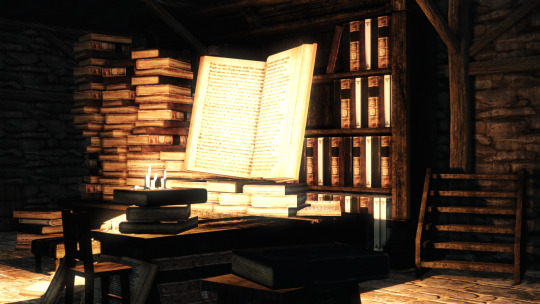
Melos Han-Tani published an essay early in June of this year entitled “Semicontinuity (A framework of analyzing videogame space)”, and I want to respond to what it brings to the table concerning the Dark Souls trilogy. My intention here is not to make a point about which of these works I think is singularly the best, or to belittle anyone’s intelligence, but to observe how this position has been laid out and offer some alternatives and tangential insights.
What first stands out to me is that we are largely not beyond primarily technical analyses of Dark Souls 2. This applies to cases made for and against the game. This has had the effect, I think, of making it overly easy to devise both points and counterpoints. If Dark Souls 2 is a mechanistic diorama where points of interest are determined by one’s expectations of what “game design” looks like, or can look like, then we are still dealing with taste. That’s fine, but taste usually has been the least important factor in revealing why the first or third Dark Souls are interesting. Someone going by the handle of hbomberguy put out a video in 2017 entitled “In Defense of Dark Souls 2”, and it amounts to two hours (!) of a person enumerating their design preferences. Again, fine with it existing -- but this is the sort of analysis which cannot hold up to the basic scrutiny of asking why it matters. This is like if narrative criticism were 90% about the prose, and the remaining 10% were dedicated to the narrative, its social implications, the cultural context, etc.
This plays out in the essay through its dedication to explaining how Dark Souls 2′s progression functions, relative to Dark Souls’ and Dark Souls 3′s, and its conclusions being focused on how this structure produces, for Han-Tani, an atmospheric gestalt, and how multiple methods of geographical continuity -- rather than a single prescriptive method -- are available to the game designer. But what, exactly, is being expressed when Han-Tani writes, “...the ways areas are connected can be carefully thought through and become expressive”? The one time we are directed to think about this is right near the very end, when Han-Tani writes, “These sorts of formalized techniques can be used hand-in-hand with the story themes to make certain ideas resonate stronger with the player”, and not even with reference to Dark Souls 2, but rather to Anodyne 2! If the impetus for this essay was an attempt to explicate a qualitative judgment on the basis of memorability, I am left with the idea that the Dark Souls series is, at its best, a carnival ride -- entertainment where what ultimately matters is the continuous impact of novelty, one manufactured theme or ambient flavor clashing against the other.
Surely this metric will resonate with some people. The problem for me is that, while it’s a fine metric on its own, and I would happily use it to explain why I’ve enjoyed some other things, I think its description of a work as a collection of sights and sounds with little to say outside of a Wow Factor can, depending on the subject, do the work (or associated works) a great disservice. Dark Souls 2 is not special on the basis of strange transitions, and I would contend that very few games over the history of the medium have lent themselves to a depth of a mythopoeic interpretation which Dark Souls and Dark Souls 3 have. On this level, then, I see Han-Tani’s essay as a sort of counter-cultural formalism, which responds, in so many words, to the clichéd charge of Dark Souls 2′s transition between the Earthen Peak and Iron Keep areas being “nonsensical” by saying, “Yes -- and that’s why it’s good.” But extolling formal virtues which reject mainstream prejudices about what is and isn’t legitimate keeps us locked into that aforementioned technical arena!
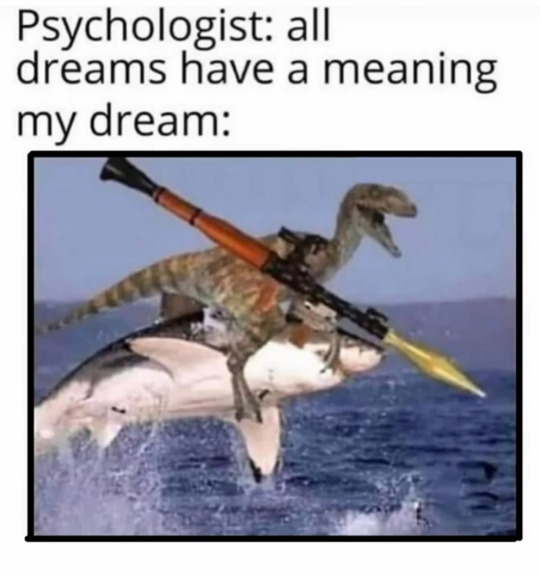
What stands out to me secondly is the perpetuation of characterizing Dark Souls 2 as dreamlike. For as long as I’ve paid attention to reevaluations concerning the game’s oft-maligned discrepancies, this has been a refrain for advocates and those who may be attempting appreciative commentary while remaining unmoved. Here, Drangleic is described as “some fever dream of a continent”, and, at the essay’s end, Dark Souls 2 as a whole is implicated by association with reference to “...a fever dream of unrelated parts and images that seem to go on endlessly, a fearsome nightmare or dream.” Once again, we are given a descriptive framework, that of a comparison to dreams, but the interpretive content of that framework is absent. In this framework, dreaminess connotes surreal organization and strange or outrageous moments/narratives played “straight.” Although this is a common way of typifying dreams (and fair, as far as the surface level stuff goes!), it ignores the ontological and teleological aspects. The image above expresses this axiom by humorous intimation: i.e., while perhaps a rare dream might be instructive, in all other cases dreams are the mind organizing elements in a free-form manner, as if it were imaginative exercise, and producing nonsense that exceeds any psychoanalytic tradition’s capacity to interpret. So, ostensibly, dreams are “weird”, but to see them all as inherently meaningful and bountifully symbolic is to engage in a kind of exaggerated pareidolia.
Following my contrary train of thought, one could say that the reason no one has been able to speak to the nature of dreams with regard to Dark Souls 2 is because Dark Souls 2 actually has nothing to say about it itself; that, really, the aforementioned axiom is unintentionally appropriate for a work where the topical can never graduate to the specific. I will leave that sort of reasoning and others to readers. What I want to propose -- and I realize that now I am stepping well outside of the essay’s scope -- is a retention of dreams as an interpretive model and an application of that to Dark Souls and Dark Souls 3. If we accept that what makes dreams dreams is that depth of meaning and symbolism, then it could be said that the first and third Dark Souls are the most dreamlike of all, for they are drenched in these aspects -- much more so than Dark Souls 2! What makes the spaces of Lordran and Lothric so fantastically vivid is -- yes, the styles of architecture, the vistas’ extents, the iterative craft of the level design -- how dense with intentionality, purposefulness, they are, how often we experience a synchronistic collision wherein our avatar interacts with a space whose ornamentation, artifacts, articles, and inhabitants have direct relevance to the mysteries of world and being, local and non-local.
These connections and the truths they point to are barely ever straightforward. Like the language of dreams, the visual and textual constructions of Dark Souls and Dark Souls 3 are cyphers, cryptograms. Also like dreams, even once we have located embedded archetypal narratives, their varied mutability preserves a fundamental mystery, compelling further interpretations and producing abundant layers of cross-referential and cross-cultural significance. If we look at Dark Souls 2′s textual constructions, however, we will find a through line of citations of persons and places which, often with the help of withering codas, collapse into their own irrelevance, artificiality, and ahistoricity. Time and again we are told that we simply cannot know about the matter, or perhaps the matter wasn’t meaningful to begin with. And, precisely due to that ahistoricity, very few of those textual constructions involve the world we directly navigate. In effect, we are led to a bunch of dead ends whose multiplicity it may have been assumed would invoke curiosity; yet curiosity is useful only inasmuch as there is room for it to explore.
I believe that the metatextuality of the Dark Souls trilogy varies by entry, and that what is different about Dark Souls 2 is that its responses are largely mechanical -- more meta-mechanical than meta-textual --, with comparatively little emphasis placed on responding to the first title’s material, and with, as noted, little potential for growth allowed among its own institutions. This is, unfortunately, a significant barrier for expansive interpretations, and I am sure it has contributed to the overabundance of technical analyses. Even Dark Souls 3 didn’t know what to do about Dark Souls 2, and limited its involvement to stand-alone references, such as the petrified Giant Tree outside of Firelink Shrine, or Gilligan’s corpse by the Profaned Capital’s first bonfire. In the future, perhaps the most illuminating analyses of Dark Souls 2 will acknowledge its internal strain of cynicism, quite unlike the fatalism of Dark Souls and Dark Souls 3, and I think reflective of its developmental turbulence, likely haunted by a pressure to match the first title’s resonant successes.
25 notes
·
View notes
Text
Jack's End of Year Video Game Round-up.
There were many things I couldn't do this year, being in lockdown and all, which in turn meant I played a hell of a lot more video games than I normally do. Here's a quick rundown of what I thought of them.
Hitman 2
IO have sort of perfected the Hitman formula now, so future entries in the series simply have to ask the question of what new directions you can take that formula. In that regard Hitman 2 is a resounding success, setting sneaking and assassination in scenarios around the world from race tracks to holiday resorts, and thus making it the best entry yet. It's possible one day the Hitman conceit will wear thin, but today is not that day.
Thronebreaker
Most people will go into Thronebreaker just wanting a stand-alone version of the Gwent we played during Witcher 3. Thronebreaker is not that. Indeed, even beyond the changes to the mechanics brought in by the online version, Thronebreaker is more of a puzzle game which uses the mechanics of Gwent to concoct unique scenarios. Still, the story is pretty good and it is fun overall, even if it didn't end up scratching the itch left by Gwent.
Black Mesa (Xen)
I returned to Black Mesa after Xen was finally added, eager to see what the team had come up with. My feelings are complicated. The Xen portions of the game are really well designed, great to play and visually beautiful. However the levels hew so far from the Half-Life originals that it kind of stops feeling like Half-Life. I would have like to have seen a more faithful recreation to be honest.
Neon Struct
If you've been wanting a spiritual sequel to Thief that actually used the mechanics of Thief, here you go. Though low budget, and therefore having somewhat uninspiring visuals based on reused assets, it's still a really impressive game from what the team had to work with, and it's short enough that it doesn't outstay it's welcome.
Acid Spy
I'm generally usually okay at stealth games but this one was well beyond my skill level. Got through the tutorial but just got frustrated and quit on the first mission.
Salting the Earth
A wonderfully put together visual novel about the legacy of war and the nature of national identities. Also you date buff orc women. One of the best VNs I've played, but it does have some pretty bleak potential endings that clash somewhat with the rest of the story's tone.
Hedon
Speaking of buff orc women, Hedon is a vivid, perfectly designed retro-shooter that really uses the most of it's engine to bring it's world to life, with shades of Thief and Strife thrown in there. Wears its hornieness on it's sleeve, but if you can roll with that you'll have nothing but a good time.
The Painscreek Killings
I really really loved this immersive narrative game, where you explore an abandoned town to piece together a series of suspicious deaths. My only gripes are the town looks very British despite being set in the US, and the final confrontation adding a chase scene felt a little over dramatic.
Deus Ex Mankind Divided
There are many problems with Mankind Divided. Trying to find another story to do with Adam Jensen. Making the game more of an open world by taking away the usual Deus Ex globe-trotting. The clumsy use of racial metaphor being applied to cyborgs. All in all the game just didn't really come together, which is a shame, because the DLC showed such promise, and hinted at the real Deus Ex game we could have had.
Warhammer Armageddon DLC
I managed to complete the Salamanders DLC and got stuck near the end of the Blood Angels one. All in all it's simply 'more' of what the base game offered, and I'm not sure it really needed it.
Unavowed
Easily one of the most interesting games I played this year. So good It inspired me to write a cheesy fanfic. Sure the mechanics of applying squad mechanics to a point and click are interesting, but it's the world, the art and the characters themselves that really make this game. Highly recommended.
Devil Daggers
The ultimate distillation of classic shooter mechanics. One platform, one weapon, endless enemies. I didn't get all that far into it and I think most people won't, but I'm not going to complain for the price. Overdue a revisit.
Dream Daddy
A fun and fluffy dating game that actually does a good job of putting you into the mindset of a recently bereaved bisexual dad. Come for the hunks, stay for the really affecting story of a strained relationship between father and daughter.
Greedfall
Greedfall falls short of the mark in most aspects, but I have to give it credit for being one of the few games to give us a Bioware companion-centric adventure during this drought of Bioware games. It lacks the zing of something like Dragon Age, and handles the subject of colonialism really problematically, but if you can get past those issues, it's a fun ride, and a world I'd like to revisit.
Endless Legend
I've been wanting a game to scratch the Alpha Centauri itch for decades now and Endless Legend finally did it. There is a risk of being overwhelmed by the sheer number of unique factions to play, and I know I still haven't really scratched the surface even after 4 full campaigns. Is that a criticism? I suppose it depends if you think you can have too much of a good thing.
Space Hulk Deathwing Enhanced Edition
A valiant effort was put in to make a faithful FPS of the Space Hulk experience, but ultimately it falls far too short. The visuals look great and the game-feel of stomping around as a Space Marine really works, but the game lacks charm and character. Up against Vermintide, there's no comparison.
Sunless Sea
This is a game that feels like a bottomless abyss of secrets and mysteries tied up in a very brutal one-life-only system. I really enjoyed my time with Sunless Seas, with the music calling me like a wailing siren every now and again, yet in many ways I did find it a bit too unforgiving, and it could have benefited from having a bit more of a progression between lives than the almost solid reset it leaves you with.
Age of Empires / 2 / 3 Definitive Editions
The first Age of Empires has an important place in history, but is borderline unplayable by today's standards. Almost every aspect was improved in 2 and going back now feels like trading a car for a horse and cart. It's clear that the game was intending your slow crawl out of the stone age through hunting and gathering to be part of the game in its own right, but today it's just tedious, and the rest of the game is just so slow.
There isn't much to say about Age of Empire 2 that I haven't already said, but I will point out that multiplayer AOE2 has kept me sane over the course of the lockdown, and I'm glad the Definitive Edition enhanced that experience.
Age of Empire 3 tried too hard to reinvent the wheel. Instead of taking 2 and building on it, it instead contorted it around a colonisation theme, and it didn't really work. On top of that, the mechanics really felt they were built more for single-player story missions. The maps are too small, and the expansion factions clash with the rules badly. Still, there is fun to be had, and I'll be checking out the campaigns next year.
Hand of Fate 2
This game takes the original Hand of Fate and adds way, way too much into it. While I appreciate the addition of companions, a longer story mode, and optional side missions, the game is far too experimental with it's formula, and leaves me struggling with complex missions around being lost in a desert or evading barbarian hordes, when all I wanted was a straight forward dungeon crawl. I tapped out two thirds of the way through the campaign.
Wild Guns Reloaded
I love the style and aesthetic, but I just don't have the reflexes (or the gamepad) for these fast paced arcade games.
Vermintide 2 Drakenfels
Fatshark gave us an entire Vermintide campaign for free this year, at the cost of having to be subjected to obnoxious cosmetic micro-tranactions. Hard to say it was worth the price, but Fatshark really do continue to improve, bringing new scope and ideas to every new mission. As good as it gets.
Pendula Swing
A fun little game that apes the visuals of a Baldur's Gate style RPG but the mechanics of a point and click adventure game set in a fantasy version of the roaring twenties. A strong introduction to it's setting but definitely needs building on if we're to see a continuation. A lot of the world-building feels too simple and half-baked at times, and the gameplay feels like too much is going on too fast. Still, a charming story though.
The Shiva / The Blackwell Series
At first I had no idea that Unavowed was connected to a host of other Wadget Eye adventure games, so naturally I had to check them out. I'd known about The Shiva and the Blackwell games for years, but never actually thought about picking them up. Playing them all back to back was a great experience, and almost felt like a prototype to the episodic storytelling many games do today.
Lara Croft and the Guardian of Light/Temple of Osiris
Guardian of Light is a fun, inventive co-op game for killing some time with a friend. The puzzles are often unique and interesting and get you thinking, and the story, while nothing fantastic, is fun enough to keep you interested and have a laugh about with your co-op partner in a B-Movie kind of way. Temple of Osiris adds way too much to the formula, with more characters, mechanics and more open exploration and it absolutely loses the charm of the first game, and even then it's buggy as hell. Skip the second one.
Command and Conquer Remastered
Big chunks of my childhood are taken up with memories of playing Command and Conquer and Red Alert, so it's difficult to really gauge my thoughts on the remaster. On the one hand the art direction looks great and preserves the feel of the original, and the quality of life improvements to the gameplay help make it more playable. The nostalgia hit is also palpable. That being said, the mechanics have not aged all that well, with much of the game being far, far too hard. Probably the best way to experience the genesis of the RTS genre but just know what you're getting in for.
Superhot Mind Control Delete
I wrote a lot at length about how unsure I was about Mind Control Delete at the time, and that's because it does feel a little unsure about itself. Is it a continuation of the first game? A fun bonus mode? A mediation on the nature of addiction? A critique of video game content? A joke on the player? I don't know, but I do know one thing, and that is that Superhot is still as addictive as hell.
Opus Magnum
Zachtronic's steampunk alchemy game requires far too much maths brain than I am capable of , and so I had to rely on guides a lot of the time, but that being said, it's still amazingly put together and vividly presented. Really feels like a game that could be used in schools.
Necromunda Underhive Wars (Story Mode)
I'll be checking out Underhive's Campaign mode in the new year, but for now I just want to talk about the story mode. Much like Mordheim, this is a game that's not going to work for everyone, but I really dug it and like it's unique take on a squad based TBS. However, in many respects the game does feel like a missed opportunity. The storyline is fun enough, and the arsenal robust, but much of the character of the tabletop game, the weird, chaotic, and sometimes comical things that can happen over the course of a battle seems to have been lost in translation, as has the quirky character to a lot of the gangs.
Outer Wilds
There is little I can say about Outer Wilds that hasn't already been said by others, particularly that one should go into the game as blind as possible. A beautiful piece of interactive art, words would fail me in describing it anyway.
Life is Strange 2
Fantastically written, amazingly animated, wonderfully acted, and grim and depressing as all hell. I really love Life is Strange 2, but it it a tough game to bare witness to, especially in 2020. It treats it's subject matter with great maturity, but is so dark it's hard to motivate yourself to continue each gruelling episode. Also, I really think it would have fared better if it had not named itself Life is Strange 2, as not following Max and Chloe turned a lot of people away from a game I think they'd have otherwise enjoyed if they'd named it Wolf Brothers or something.
Half Life 2 / Episodes / Portal / 2/ Mel
After playing Black Mesa earlier this year I decided to revisit the entire Half Life 2 and Portal series. What I concluded is that Half Life 2 is not really all that good. A well told story wrapped around weak combat and average encounter design. This much improves across the episodes of course, but in the end I rather feel Half Life 2 is pretty overrated.
Portal, on the other hand, still feels fresh, though I was surprised I'd forgotten just how much was added in Portal 2, to the point Portal feels more like a game demo. That being said, I think the slowly growing mystery and menace of Portal has aged a lot better than the gagfest the series became with 2. Mel, a stand-alone mod that feels like could be a Portal 3 in it's own right, returns to a more serious tone, and feels all the stronger because of it.
Control
Control has gone from a game I didn't really care about all that much to one of my favourites of the year, if not the decade. Sure there are criticisms I could make, but the world has so much depth, the characters so much potential, and the gameplay such perfectly designed chaos, that it wouldn't really matter. A great time was had.
Icewind Dale 2
Finishing Icewind Dale 2 was the final banishing of the old ghosts of Infinity Engine games I never finished as a kid. Sure there was the nostalgia, but Icewind Dale 2 also feels prefect for the Baldurs Gate era's swan song. Beautiful environments, a well written story and great interface and design, only pulled down due to some overly long busywork at various points and the plot being dragged on a little too long. Still, sad to know I have no further Infinity Engine games left to conquer.
Elsinore
The first half of Elsinore is an absolutely great time-loop mystery, which seems to be an interesting interrogation of Shakespearian tropes and asks the question of how much of a Shakespearian tragedy remains the more you change it. The second half, however, quickly devolves into a cosmic horror story that feels a poor fit for the genre and far too grim for the art style, and that's even before it basically devolves into trying to do the same thing Undertale did but worse. A well put together game whose ending did not sit well with me.
Gwent: The Witcher Card Game
Since Thronebreaker didn't sate my appetite I started playing competitive Gwent. It is a wholly different game than the one that appears in The Wither 3, but is certainly fascinating in it's own right. After 200 hours I am officially addicted, somebody please send help.
And that's that. Not doing a top 5 games of the year because I played too many this year and I've spent too much time thinking about them already. Here's hoping I play less in 2021 and can get back to a more normal life.
4 notes
·
View notes
Text
Artist Interview with Daphne Hutcheson
Last week I had the opportunity to speak with Daphne Hutcheson, an artist I’ve admired for quite some time. Her work and knowledge in the arts has helped me, along with many other artists in the online community.
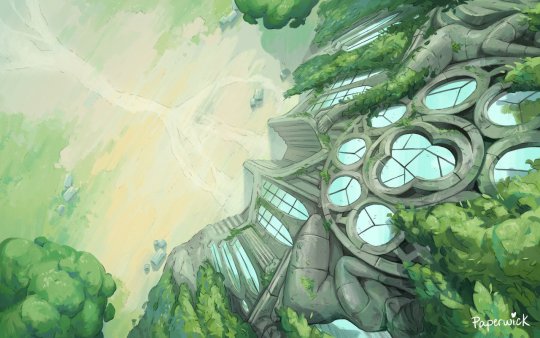
Daphne Hutcheson, also known as @paperwick on social media, has been creating artwork from a very young age, with works in both traditional and digital media. Her work covers a broad range of fandoms, original content, and client based works along with some very useful and resourceful tutorials.
K: I wanted to first ask about your experience attending SCAD (Savannah College of Art & Design)?
D: My experience at SCAD was tepid at best. The teachers were good, but I mean very specifically the professors who were teaching in my major, which was sequential art. SCAD is really not a great institute for anyone who isn't rich enough for their parents' to cover the cost. That's my biggest issue with it, they will cripple you with debt, so if anyone is lower-income, I would highly suggest learning via some of great online courses or using a state college's art program to sort of direct you if you need direction and deadlines. I know I need them. SCAD's loans are no joke. The college itself was very good my first year, they do a lot to make sure incoming students feel heard and welcomed, and then after that they really don't try for you. As soon as you're a sophomore, they could care less about how you feel to be there. Their class attendance requirements are grueling and there's no room for accidents--you miss four class sessions and you fail the course. It's wild, and even if you're in the hospital, those absences will not be forgiven. If you're late, it counts as an absence.I don't recommend it. At all. All the learning I garnered there is online accessible these days, one just has to hunker down, find it, and put it to practice. My professors were great, but no education is worth that price tag. Depending on your major there, you will be treated differently by the school. For example, their fashion and fibers majors are doted on, whereas a major like animation is ground hard into the dirt. There were unrealisitc deadlines to meet for class projects and kids would be in the school buildings overnight trying to meet them. Some fell asleep in their chairs and Paula Wallace (the owner) saw that one day and had them replace the chairs with far less comfortable chairs. Some kids had heart attacks from staying up to meet deadlines. Such a bad work culture of "all-nighters". In part the students' fault, but none of the faculty really stopped it or discouraged it, save one teacher in a different major, and that being said, that teacher still gave ridiculous deadlines so we'd "be prepared for the industry". That's not at all what the industry is like (discluding the game industry right now). It is truly a hard place to thrive and everyone I've known who has graduated had months to years of burnout after finishing, including myself. I'd hazard real caution when choosing to go to a private art college, art institutes included.No education is worth that amount of debt.
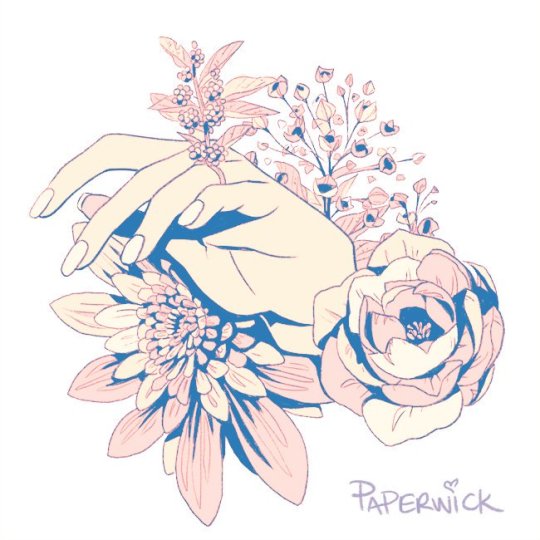
K: Wow, that’s unfortunate to hear. I wonder if students are having similar experiences at colleges such as CAD or RISD?
D: I have heard very similar things about places like RISD and CAD where it’s all about the money, but I can’t point you towards any of the specifics. I really just want people to go into it with a clear head and know it’s going to be hard exiting. They really don’t prepare you for business.
K: What would you have done differently? Would you have signed up for online courses?
D: If I was to do it over, I would have liked to dive straight into developing personal projects, just making the work. Watching and reading free youtube videos and blog posts by artists. That would not have flown with my parents, they’re very by the book “go to college or get a job” type people. With than in mind, I would’ve gone to the local college I was within biking distance of as a sort of clean, and done fairly half assed studies by full assed my artwork.
K: That sounds like what a lot of artists, particularly those interested in digital art are doing. But, have you ever considered going back to school, or enrolling in a program or an atelier that you think would be beneficial to your art career?
D: Not genuinely. If I had time, I wouldn't mind enrolling in something that would teach me puppet animation, but between freelance and my day job, it's hard to find time to produce personal work and then also learn. I am pro-learning, always learning because that keeps your work fresh, keeps your mind sharp and ready to switch up on a dime. But course work is something I'm not super fond of, to be honest.

K: I understand. So, you've graduated and are currently doing freelance work along with your other day job. In your freelance work, what kind of work are you taking from clients?
D: Mostly I do storyboard animatics for a few advertising agencies, but I do some card art for games here and there, like Companion's Tale. I just signed on to do some tarot card artwork for a company called Legacy: Fables. I'll take anything that sounds interesting and that I have time for. It's all digital; traditional art is way more personal for me so I almost exclusively make traditional artwork as gifts for friends.
K: Are there any particular fandoms or genres that you tend to work more in?
D: As far as fandom work and commissions, it's Dragon Age all the way BABY! It's a good community and I owe a lot to them. I'm planning on reopening my tarot commissions here soon once I finish up a few of my freelance projects. I am an old hat with fantasy stuff and most comfortable there, but I really want to start working on robots and mechanics and cities. All that sci-fi goodness.
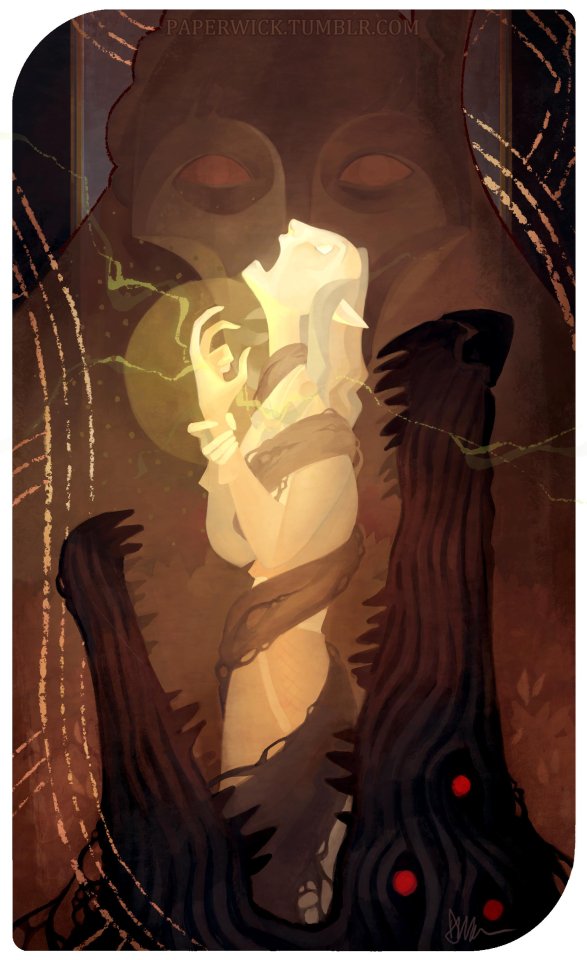
K: Wow, that's great to hear you've got very steady work, and they’re with industries and agencies! I hope you'll get to share that work once it's gone down the production pipeline. Have you ever considered applying for work with a company like EA/Bioware?
D: Yeah! I've lucked out a lot, it feels like all of this sort of dumped itself in my lap. My biggest resistance to applying to Bioware or any gaming industry position right is rooted in how they treat their workers. Bioware, specifically back when Anthem was released, had a nasty report come out on how management had run their workers to the point of many having mental breakdowns, and several just leaving and never coming back. They refer to those who have breakdowns while working during their months and months of crunch as "stress casualties", and I'm honestly quite disgusted by what I hear. I think once the gaming industry unionizes I'll consider applying, but the things I hear, not just about Bioware and EA... It's horrifying. Riot, Blizzard, Activision, Treyarch, Rockstar... the list could go on. Not to like tank the conversation into a dark place, I just have such strong feelings about it.
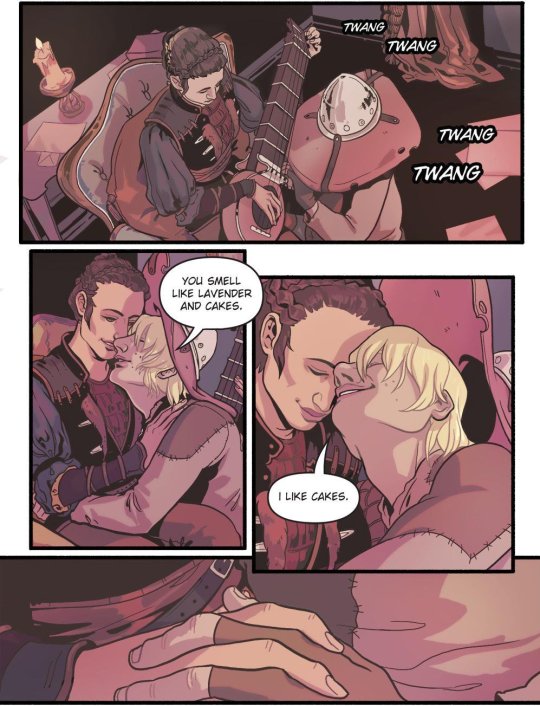
K: That's ok! It's good to hear different perspectives, especially when talking about the industry. Alright, on to the next question. Looking at your work, from sequential narrative to tarot artwork, I’m really impressed by your storytelling. When you’re creating stories and characters, do you pull a lot from your own experiences and emotions, or more from other sources such as music, film, or literature?
D: Ahh that's a hard one. I think I pull far more from outside of me than inside of me.The way things are shaped comes from my own experience, but I think a lot of my content comes from outside influences, like movies, books, music, and art.Howls Moving Castle, the book not the film, had a huge affect on me and how light I want the stories I tell to be, but I think I have a long way to go when putting stories together.I am super empathetic so it's easy to take outside influences and really feel them, but also it's hard to tell where I start and those influences ends.
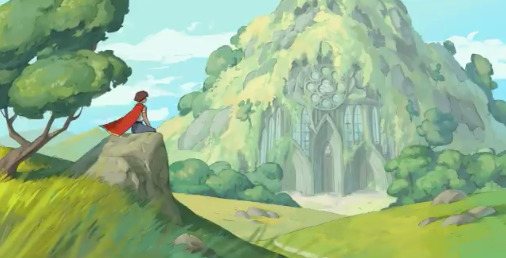
K: Very well said, and the comment about the novel, I can really feel that in your personal work, especially your recent animated landscape piece.
D: Thanks!
K: The first time I came across your work was one of your Dragon Age tarot works, but also the tutorial on how you created them. It was incredibly helpful to me and I know to lots more artists. Your tutorials and words of advice have proven very successful, but have you ever received any advice or tutorials that really switched gears or level upped your techniques?
D: The answer is yes, absolutely. Let me see, I don't seek out tutorials anymore, but there was something I saw recently that was good. Sinix's head from any angle is a great approach to drawing faces at crazy angles. Also, check out Bunabi on Tumblr. Bunabi is so fast and her work is beautiful, and has great tutorials also, just incredible.
I unfortunately can’t link to any specifics, but tutorials like this one do me a lot of good.
People can just screenshot process stuff that reminds me that there are a million ways to approach art, like sketch up, grids, freehanding. I think I benefit from understanding that there are a million approaches more than following the tutorials super hard.
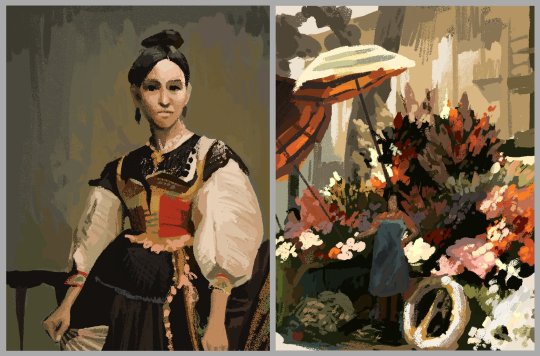
K: Great,thank you! I wanted to ask a few more questions, one about your Patreon. It seems like the next big wave for digital artists. How has it been creating one and keeping on top of the awards, and is there anything you would want to do differently with yours?
D: So Patreon is kind of a basket you can fill with prizes, maybe some of the prizes for money (probably prizes for money), and that works for a lot of people. I have a more of a "here's content I don't put elsewhere if you'd like it" approach to it cause I'm inconsistent with patron pay-outs. Patreon for artists with chronic mental illness is a struggle. Hands down. I started one hoping it would iron out my discipline issues a year or two back, and it didn't. It made me feel hella guilty cause I could not keep up with what I said I'd keep up with, and then I felt worse. It was disastrous. I refunded most of the pledges I got during the three months I had it open. Then I closed it for a year and brought it back online recently. Now all my content is free, it's still inconsistent, but if people want to support me I welcome it. I think Patreon is a good platform, but I will never be able to use it is intended. I respect the people who can keep up with it all, that kind of discipline takes a crazy amount of strength of character, but I don't motivate with money very well. In the end, I motivate through helping others as best I can, so it'll always be free content. I have very few plans for it, other than I want to put together a brush pack and share it there with brushes I made. I just need a moment to sit down and make that happen. I've got a tutorial for using photos to make quick painted backgrounds too, and I just have to organize that sucker.
K: Thank you for being so open about it. I think what you're doing is so insightful and helpful in what you're offering to your followers, especially those who may also be struggling with anxiety and depression.
K: Can you share what your process is like from a sketch to a finished piece? Do you thumbnail a lot before, use references to build from, and so on?
D: I like to do throw away thumbnails on notepaper.
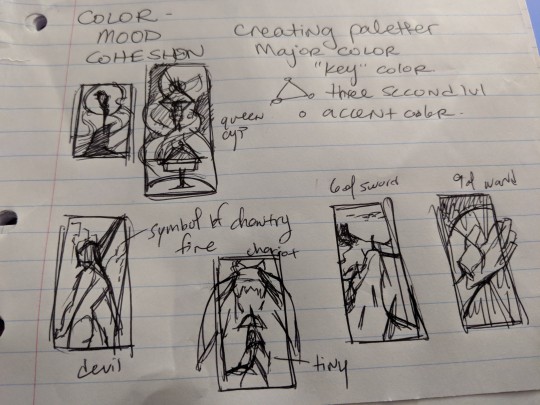
And then I take those thumbnails and do a more thought out version digitally.
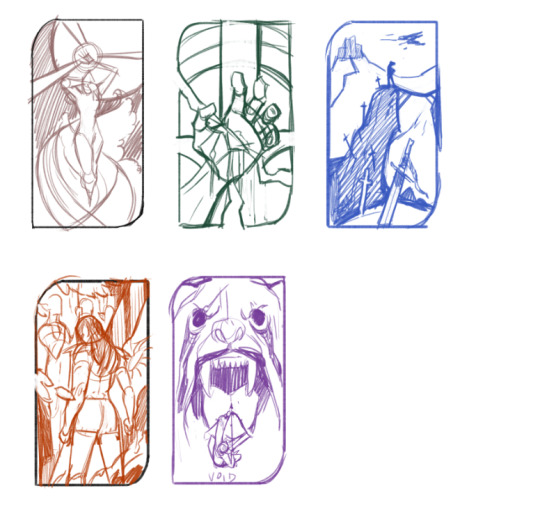
K: Wow, these are both beautiful. If you don't share these with patrons already, I would! I also like that you've given each one their own color, a good way to organize!
D: Thank you! I'll make sure to share these, I forget about them genuinely. I'll diverge in two directions from here depending on need. If what I'm working on is simple, I hop straight into color. If it's going to be complicated, ie crazy armor, specific architecture, I will do a line pass first and then launch into color. Either way, this is where most of my references come into play. Once that is solid I add detail work.
K: Reference can be so important in art; it really can bring work to a new level if used properly!
D: Yeah reference is king. I use it constantly, even when doing the most stylized thing, cause there's always stuff you forget. The waves I did for my last card, I had reference of barrel waves up constantly, and it helps a ton.
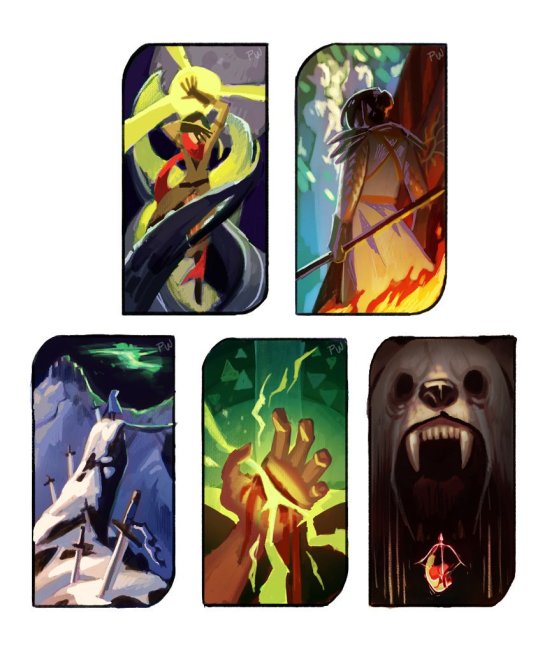
K: My last question is where do you see yourself in five years? I know this can be a challenging question, but if you had any goals or plans you’d like to see come into fruition, what would they be?
D: Five years? These questions are always a struggle for me. I try not to look past a week at a time because it's all so BIG. And my life has undergone so many huge changes in such a short period of time SO MANY times that it's hard to make long term plans. Especially when dealing with mental illness. So I try to think less about where I'll be in any amount of time, and more about what I want to progress towards achieving, it's a little easier and sets up less expectation. So this is not necessarily a five year plan, and more an eventual future plan. I want to have enough tutorial work to put together an art resources book/pdf online. I want to develop my freelance work further and create my own studio, ideally for illustrative style work, smaller animations, and maybe some classes for people interested in color and storytelling. I want to put together a small guide of sorts also for artists and people who need healing, since there's so many of us. That one is harder because it's an amorphous subject, but I think there's a lot of room for commentary there and a lot of people wanting to hear it, and I think it'll have to come from all those hurting. It's just a matter of how we'll organize that.I am a huge sap. That's my way. So in 5 years I'm hoping I'll be a better and more helpful sap.
K: Well, I hope you're able to make a lot of this happen, we need more empathy and help in the world. Thank you again Daphne for your time, this was really informative and an honest interview which I know others will appreciate.
D: Thank you, Kallie!
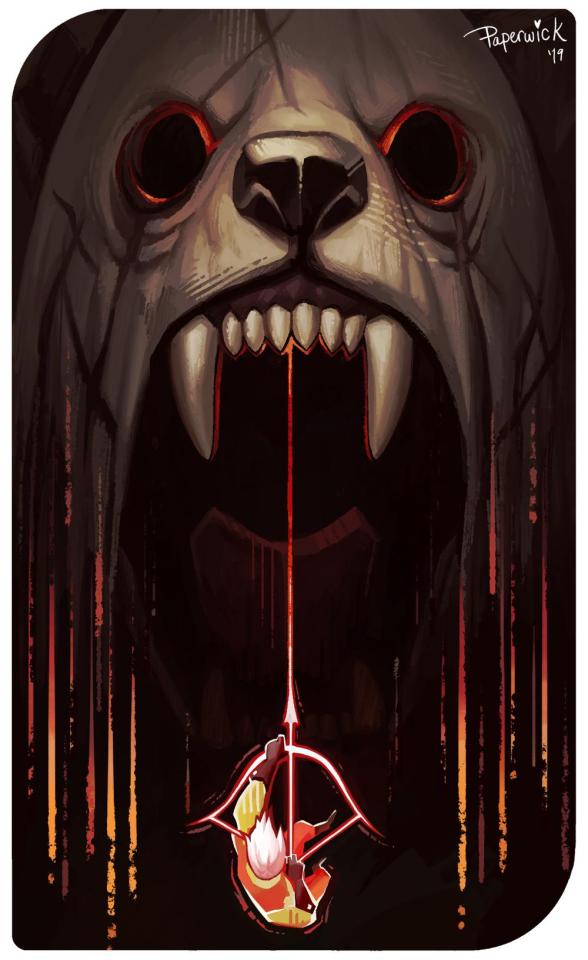
You can find more of Daphne’s beautiful works (and tutorials) here:
Patreon
Twitter
Tumblr
304 notes
·
View notes